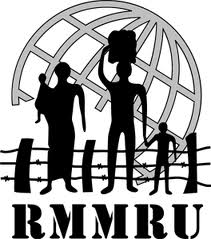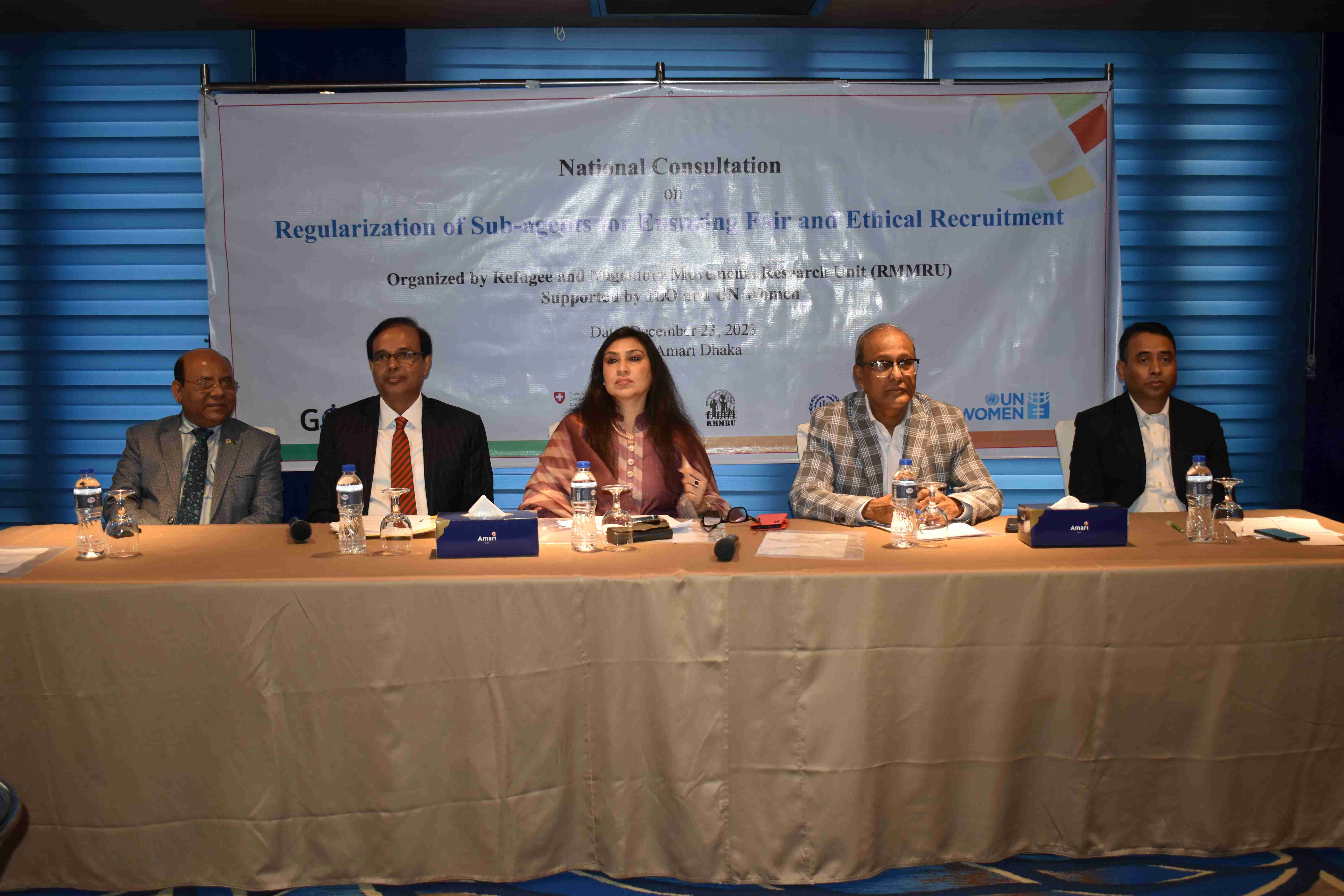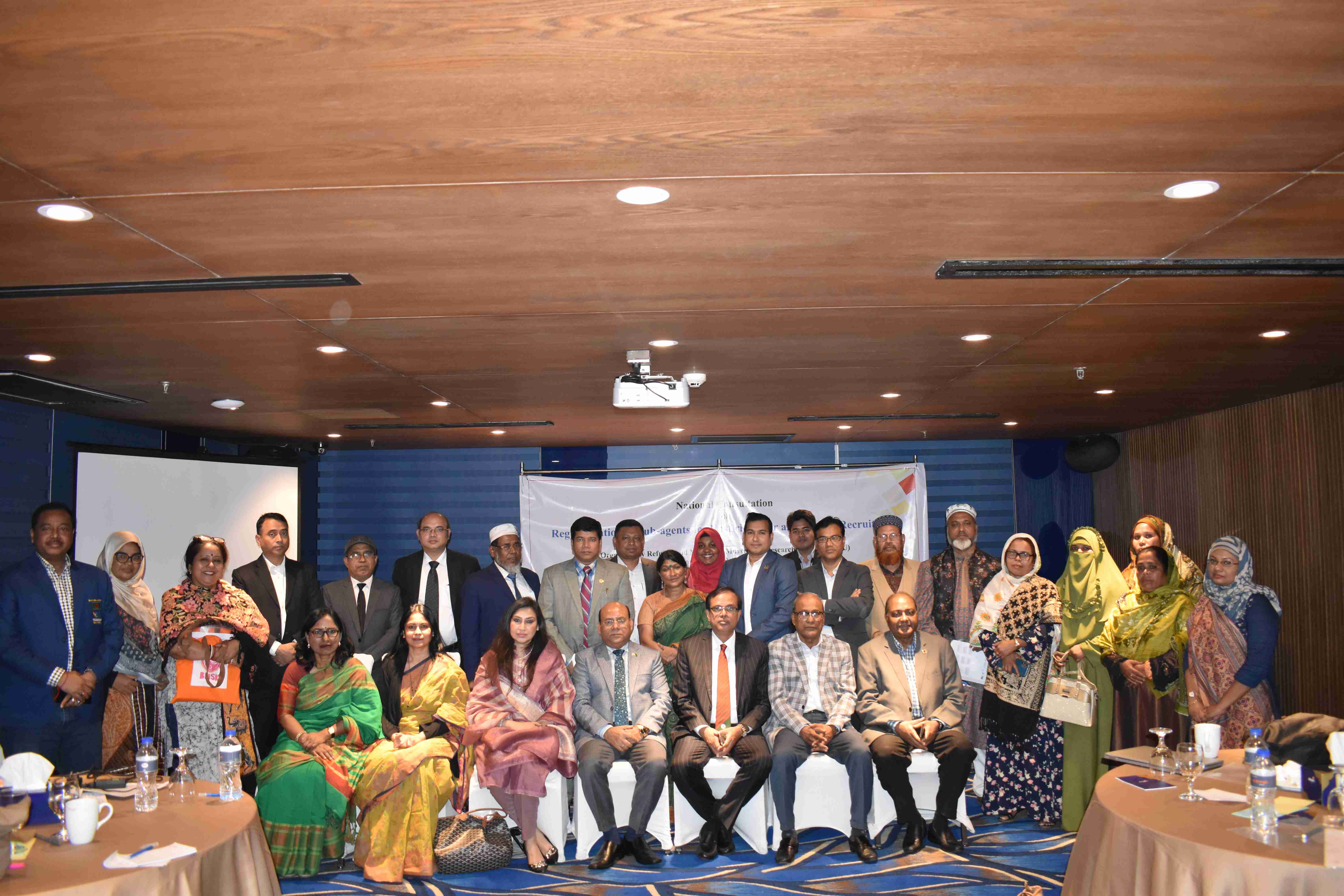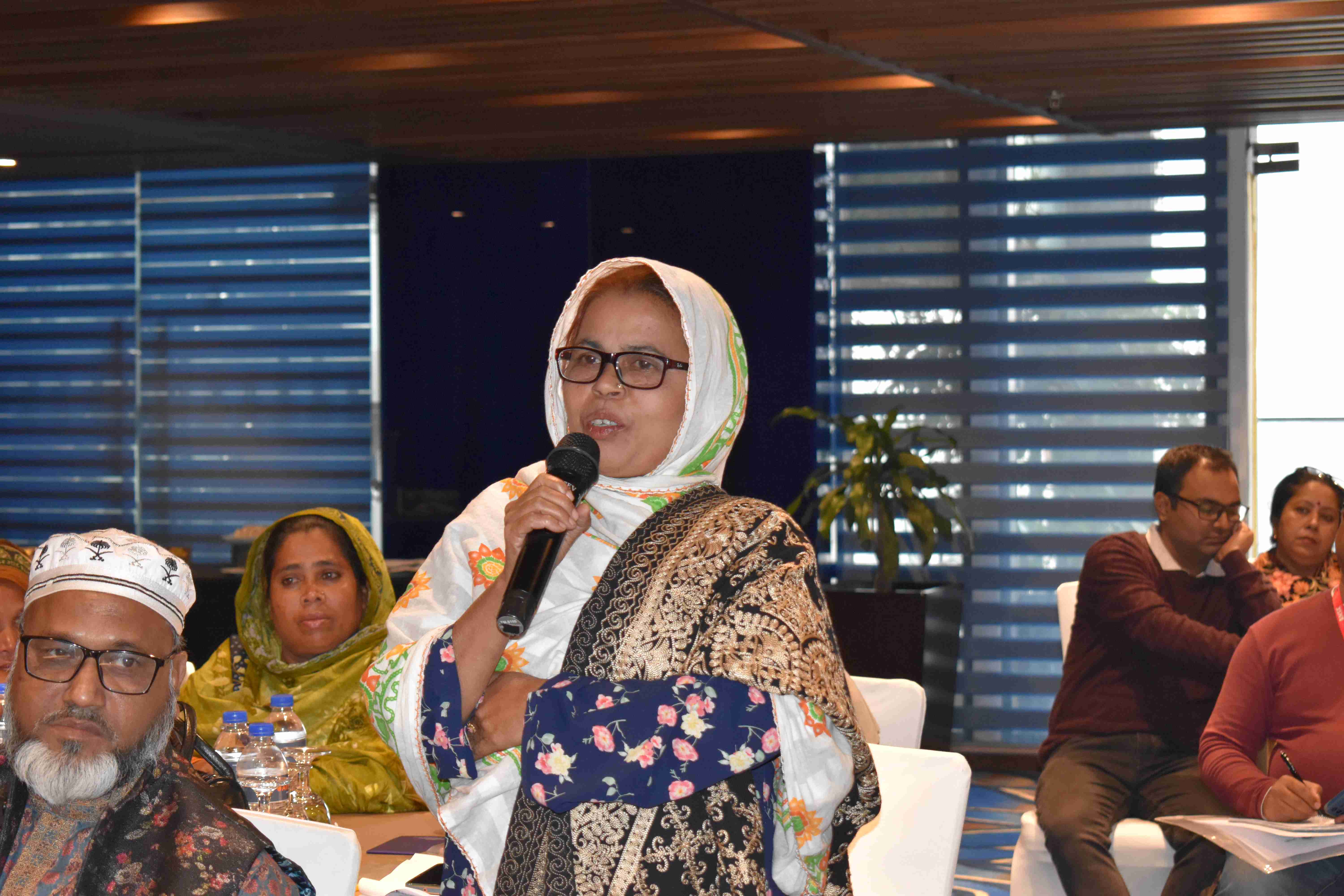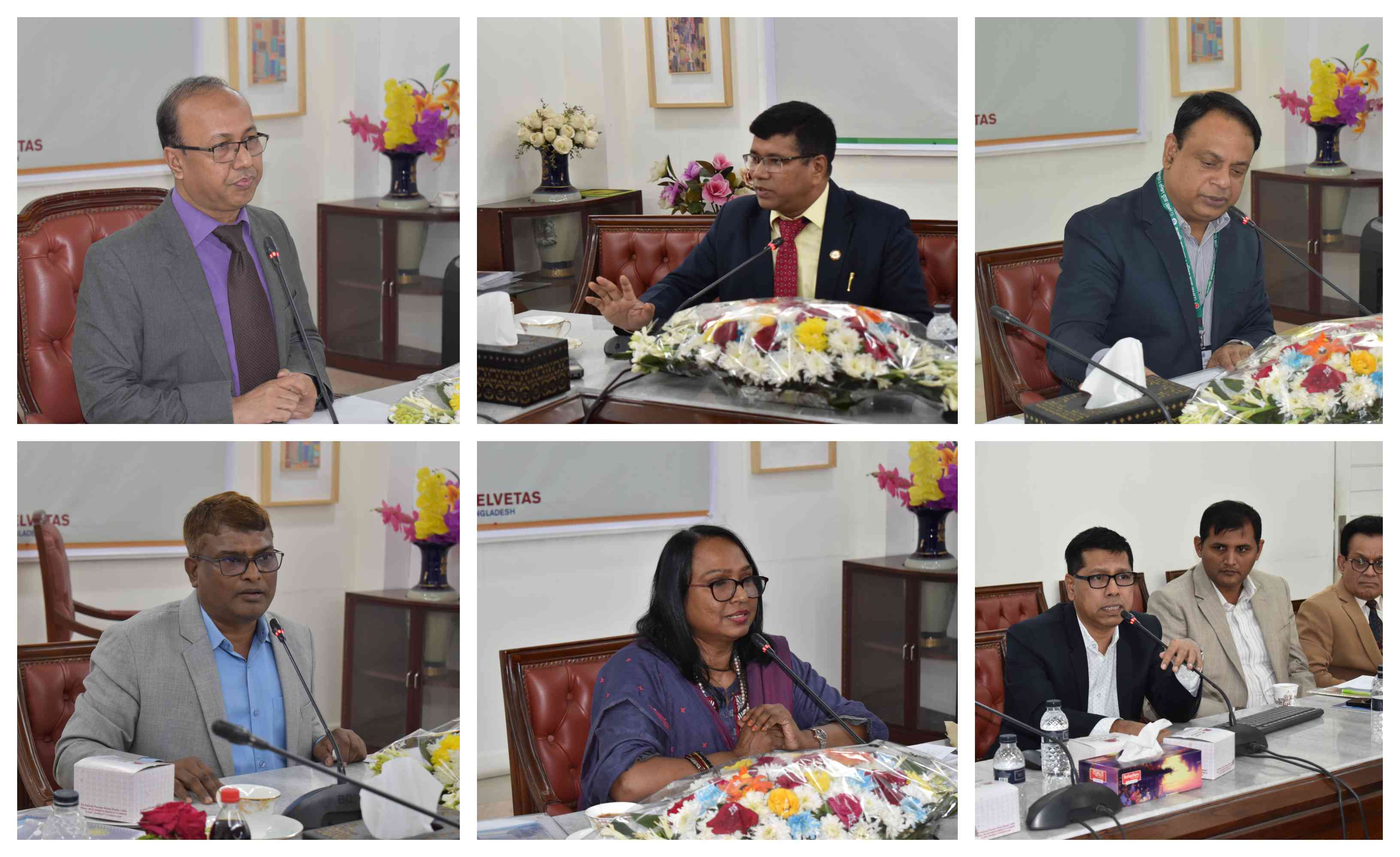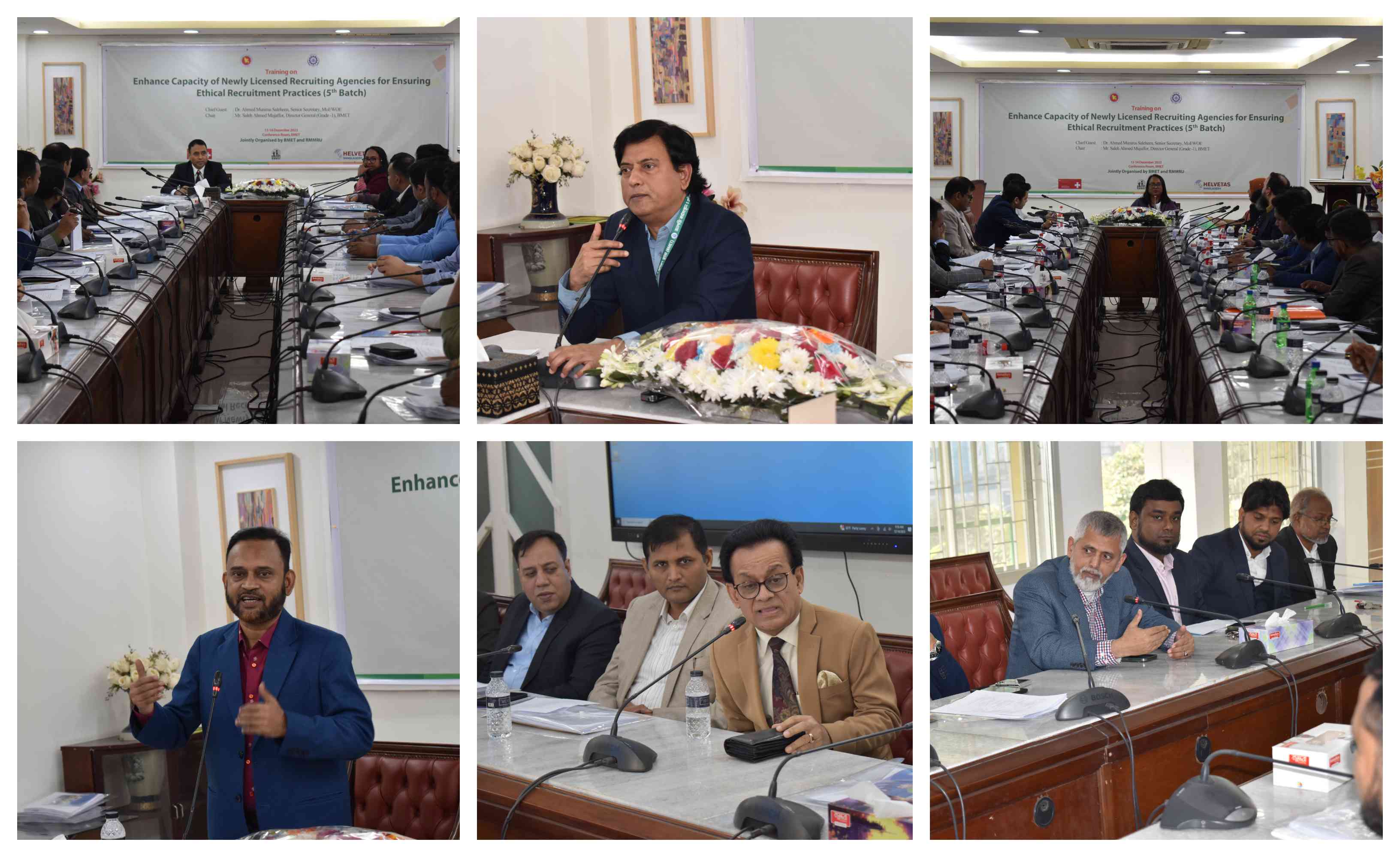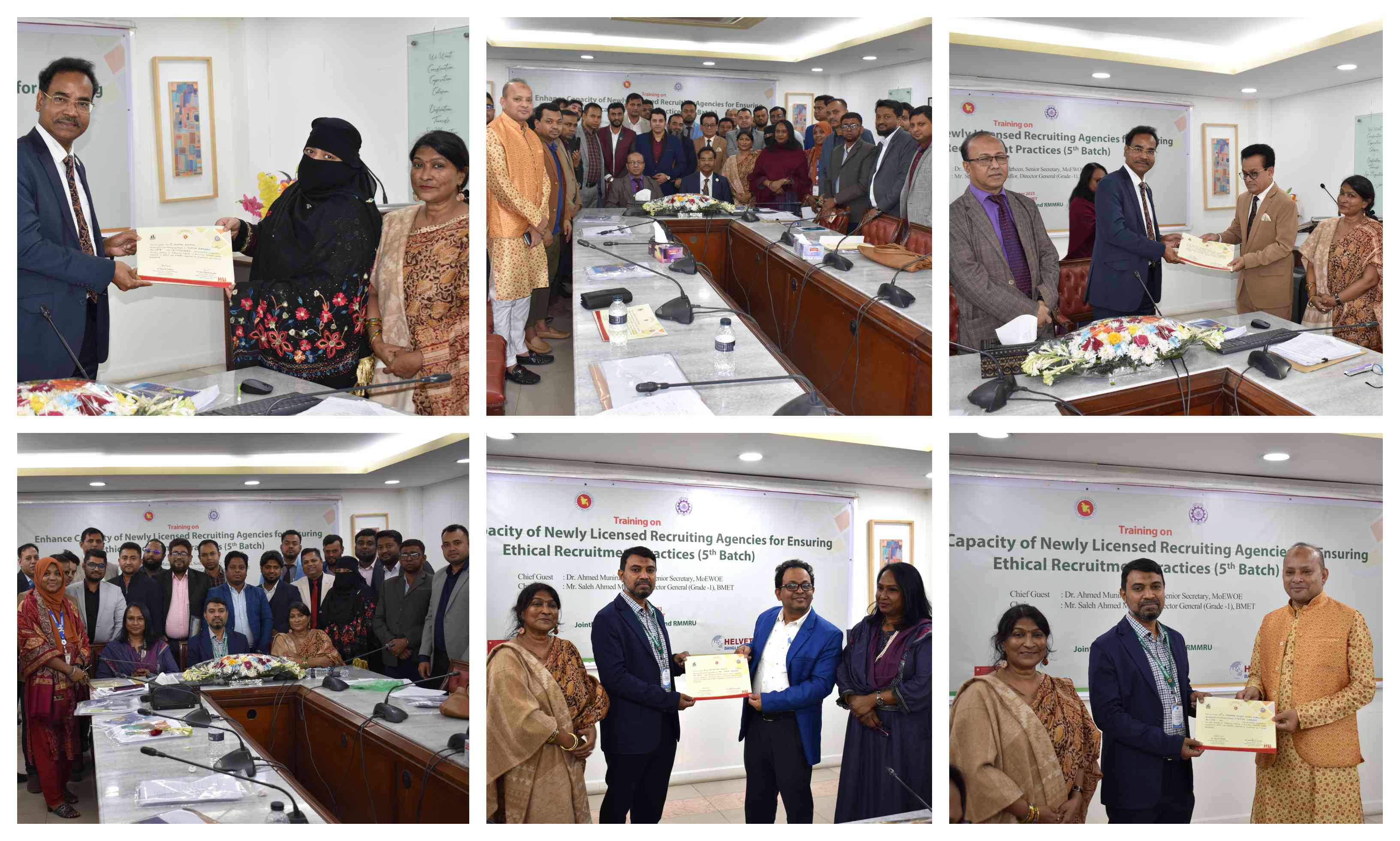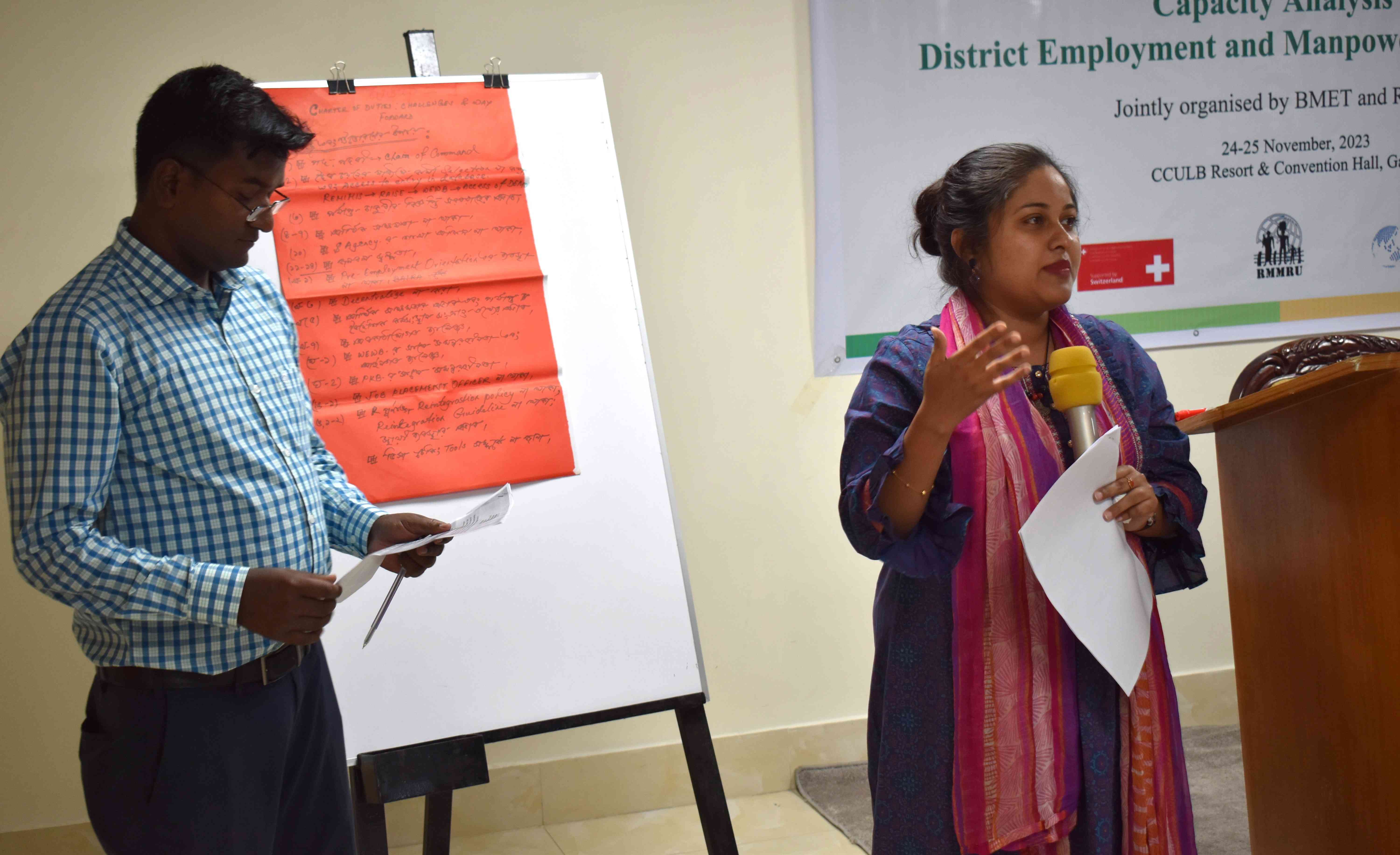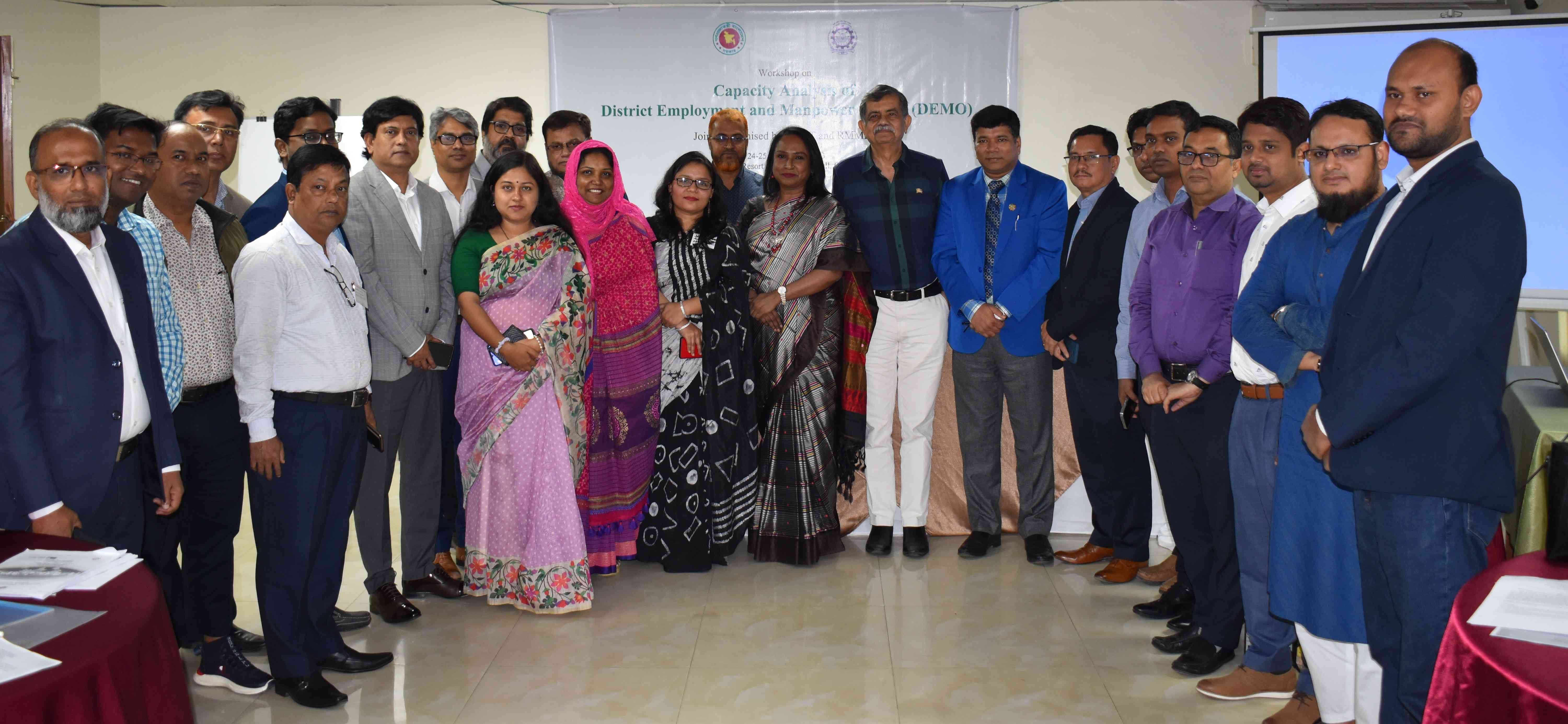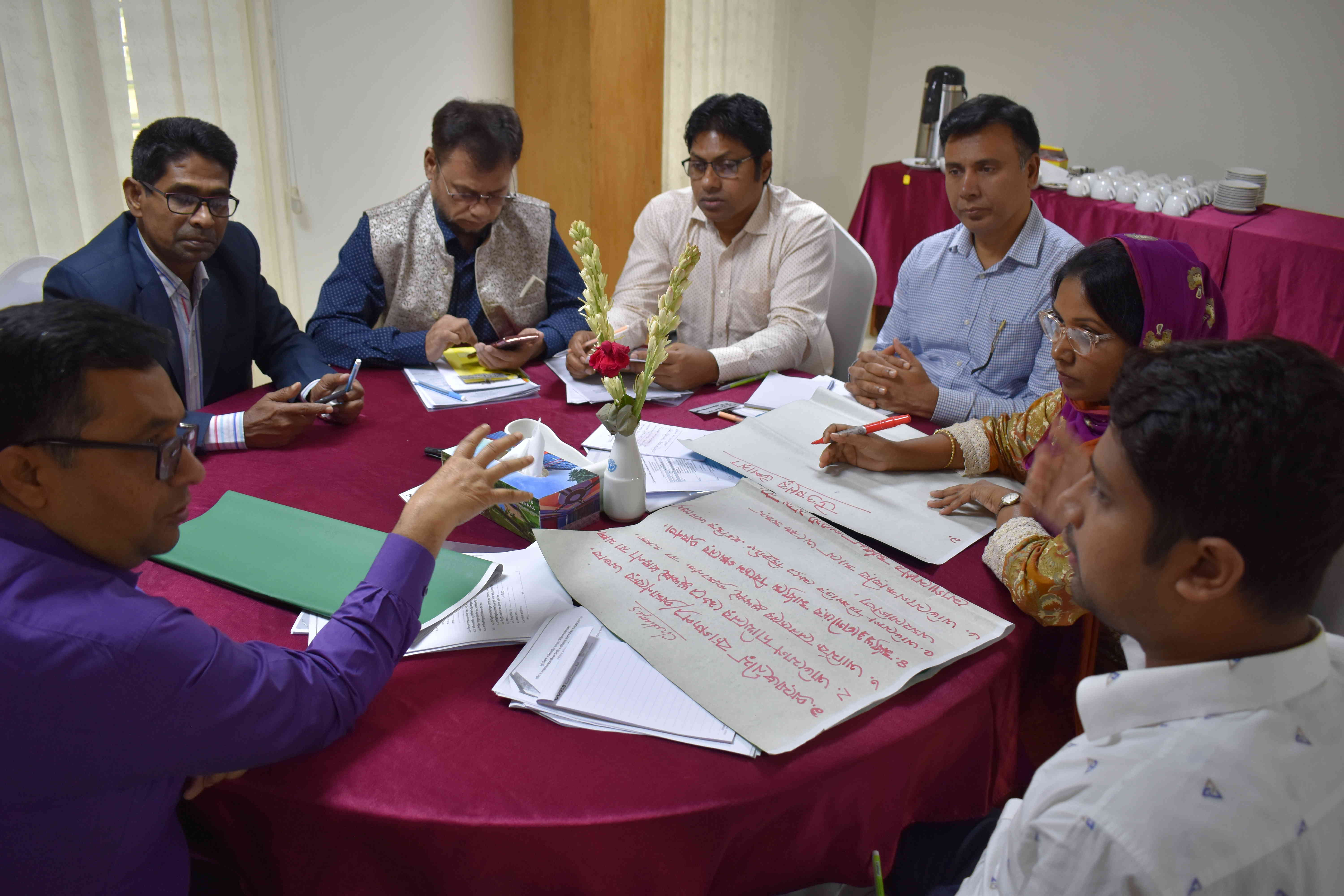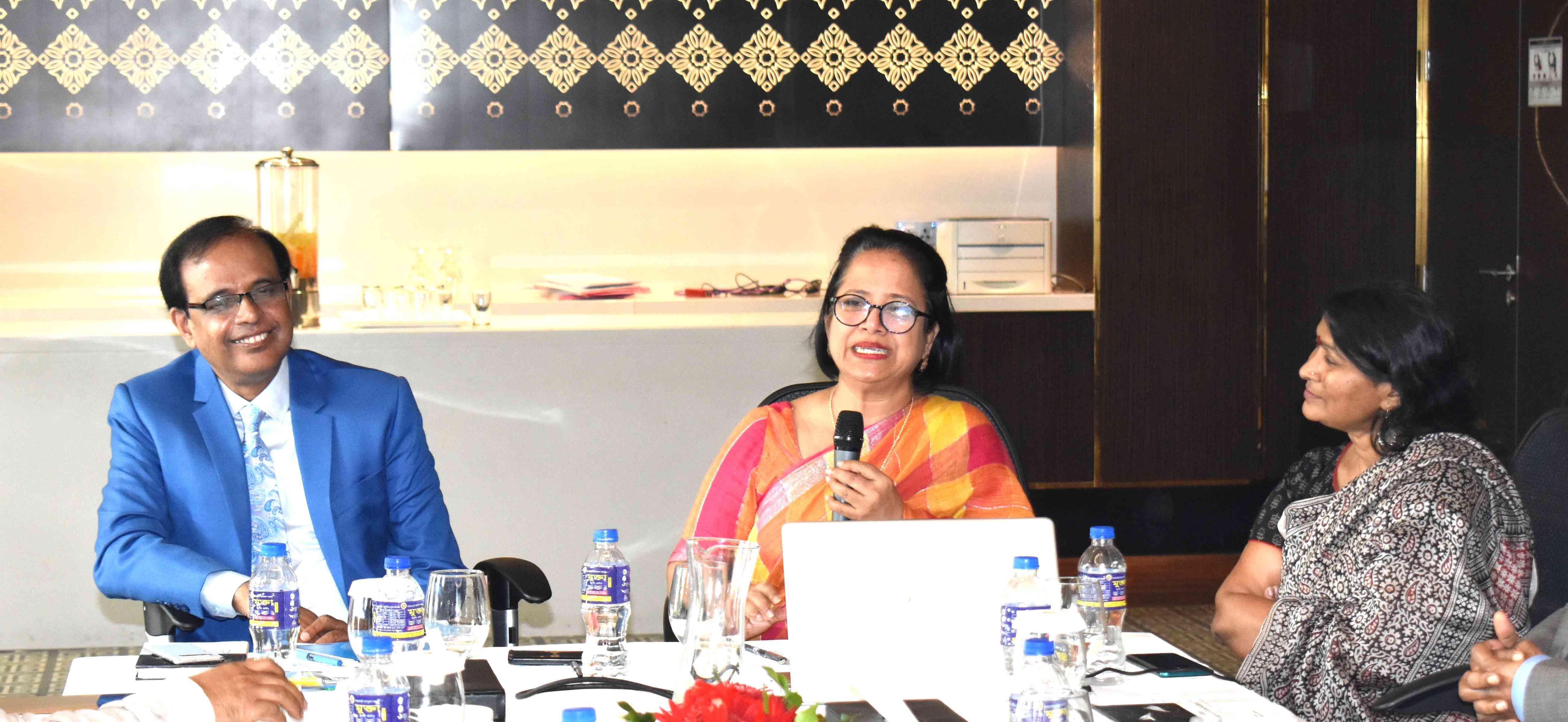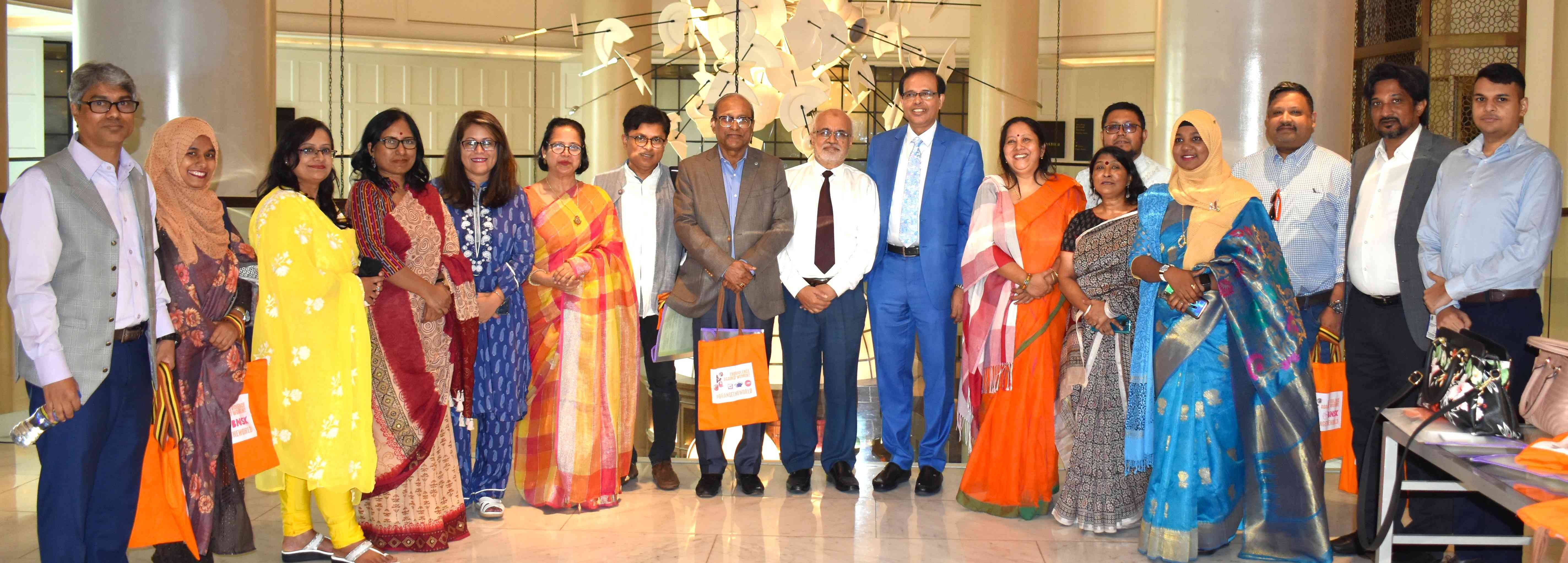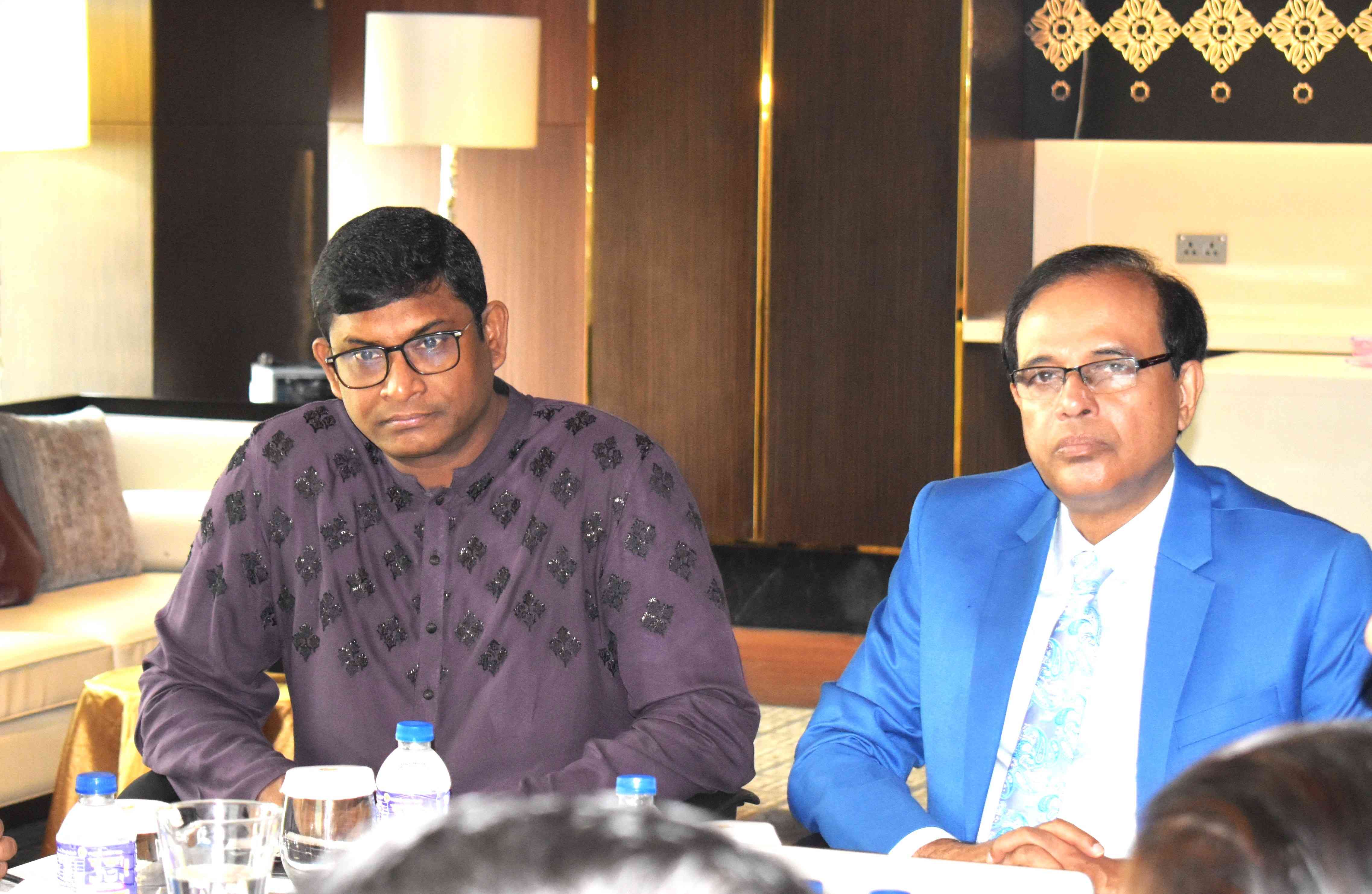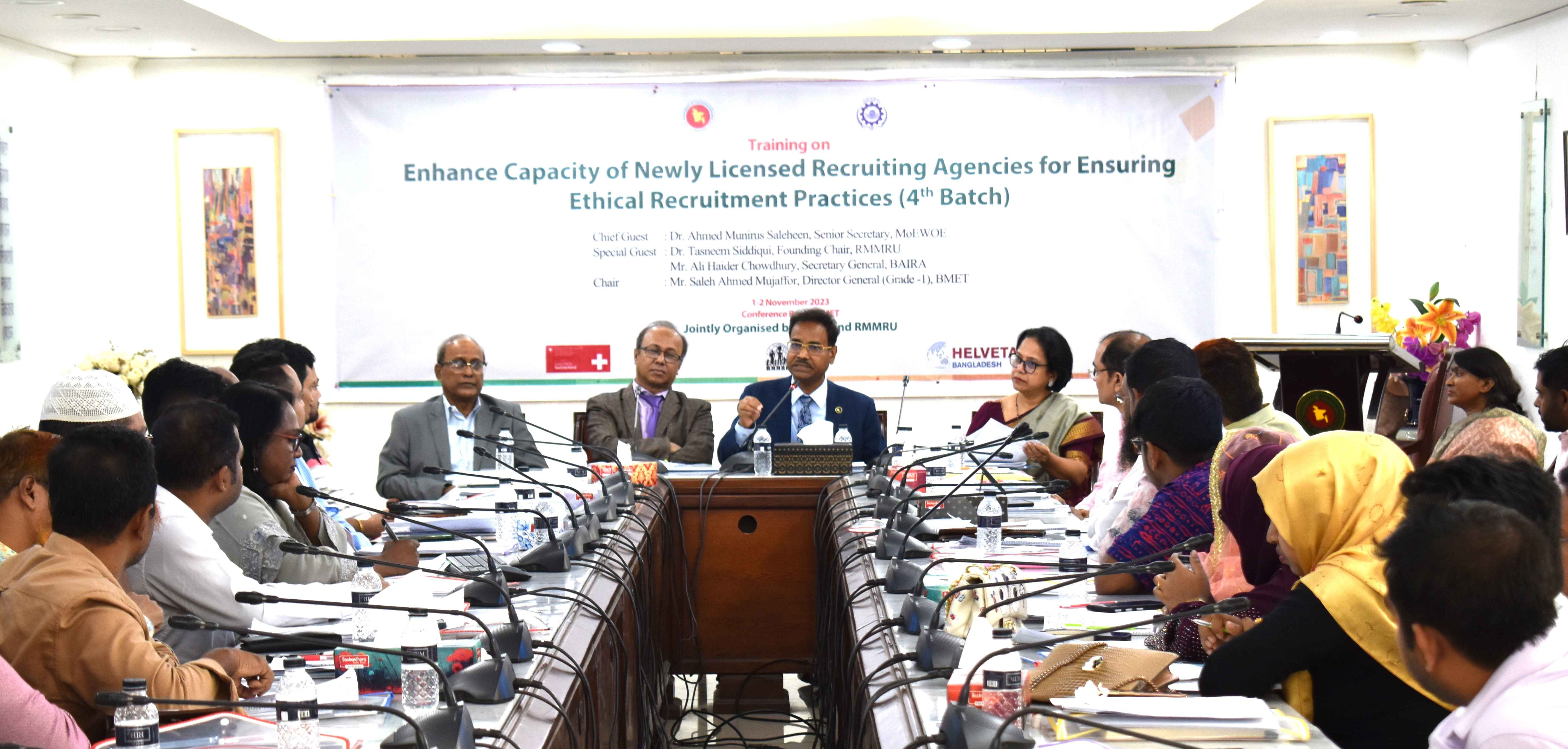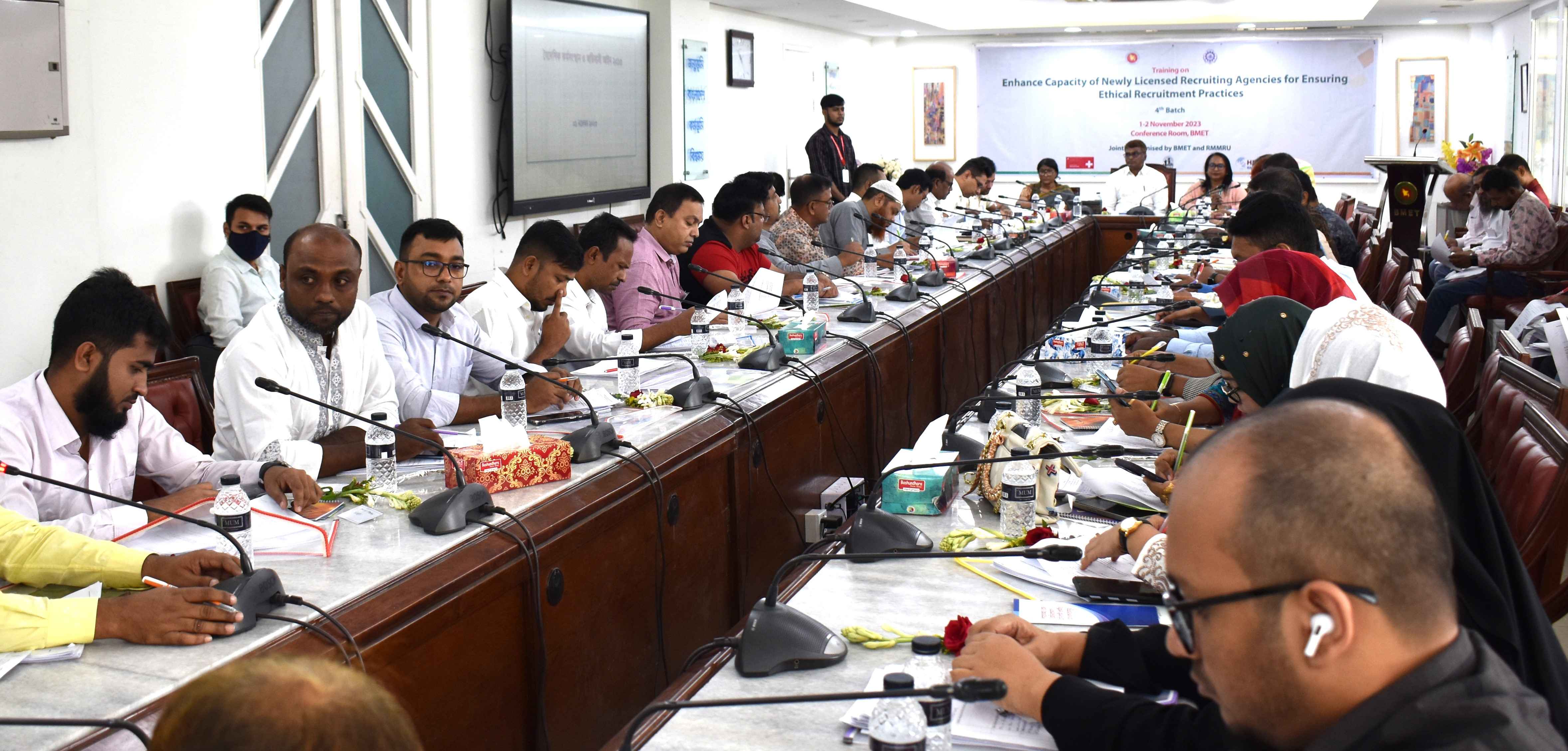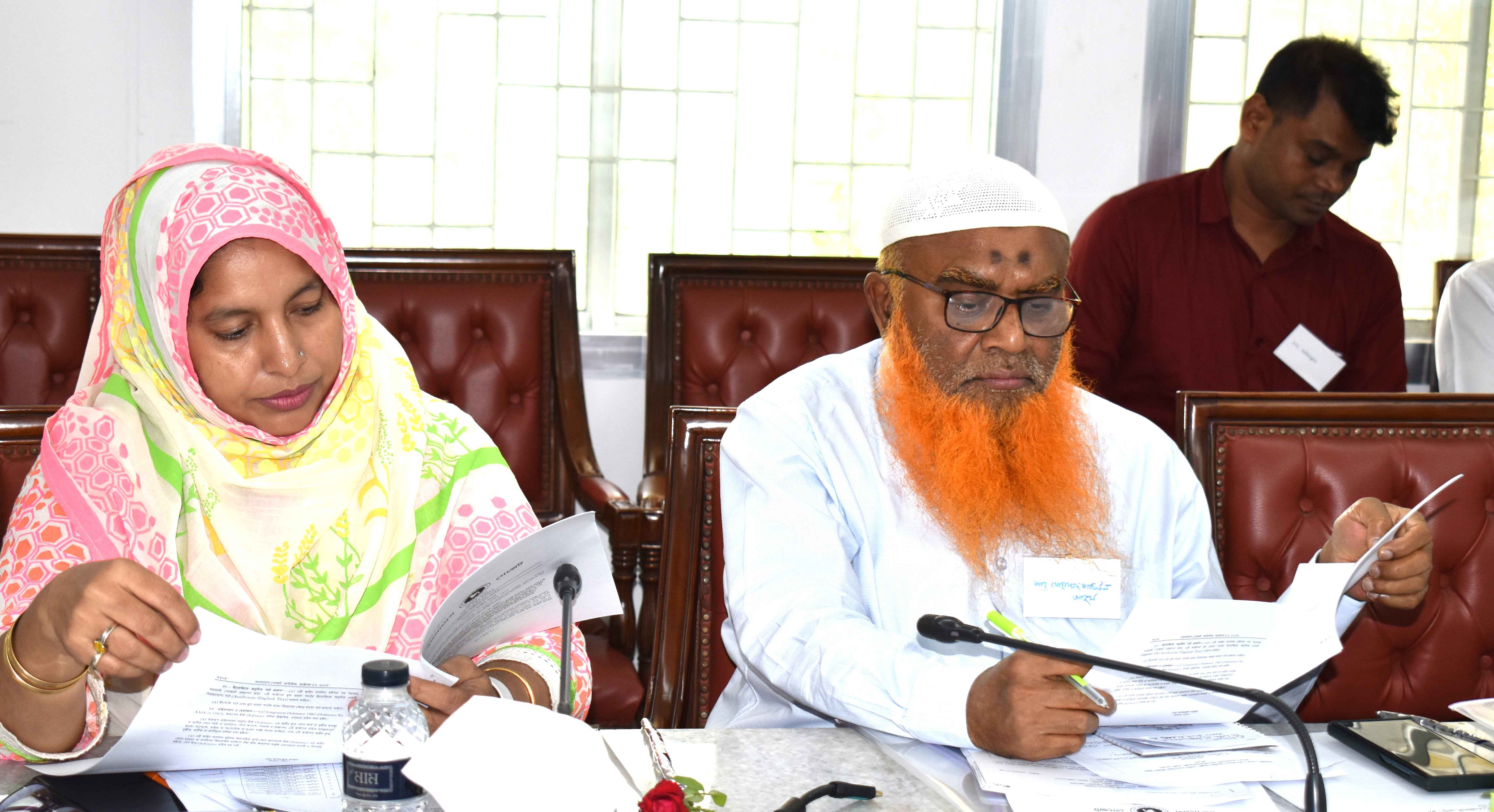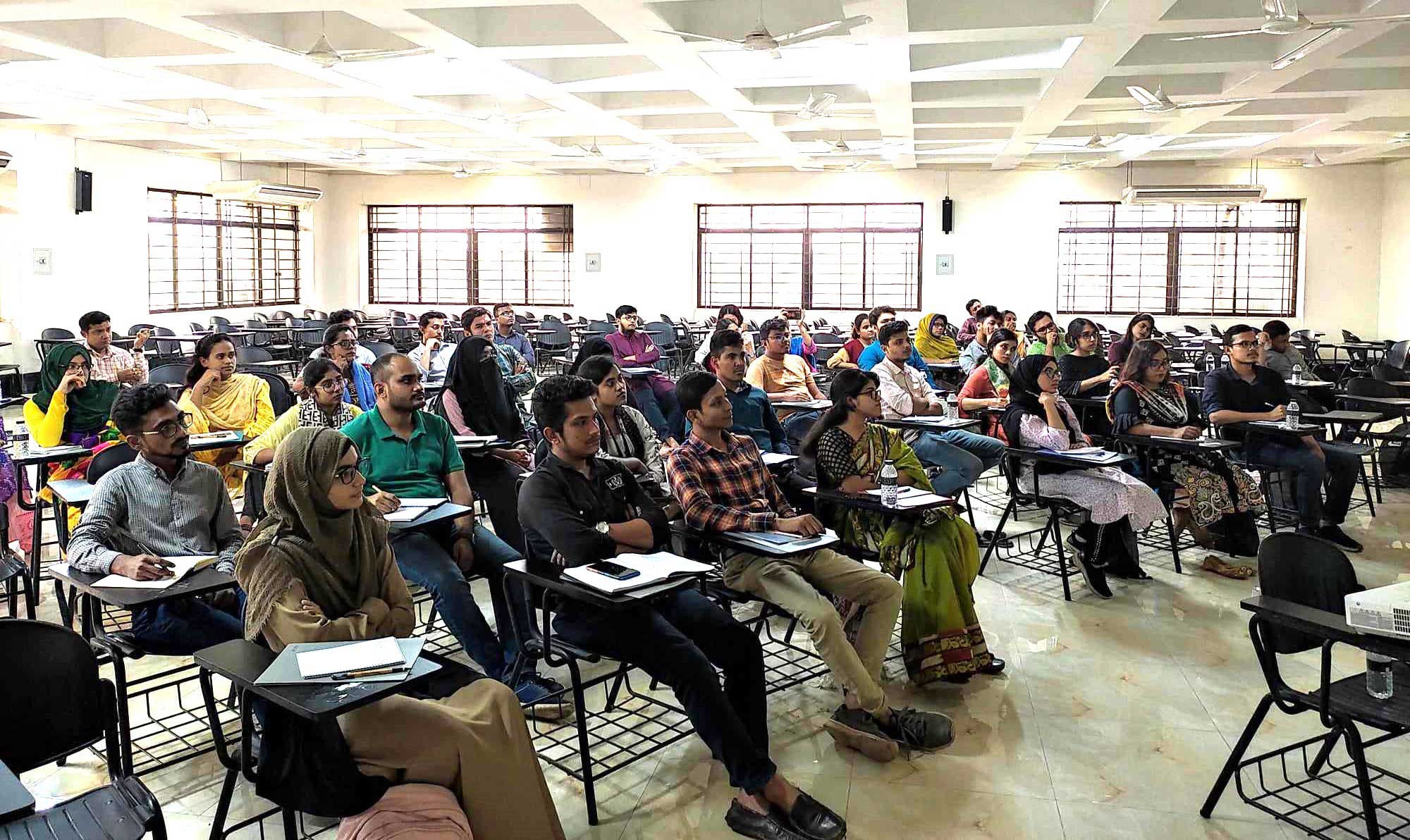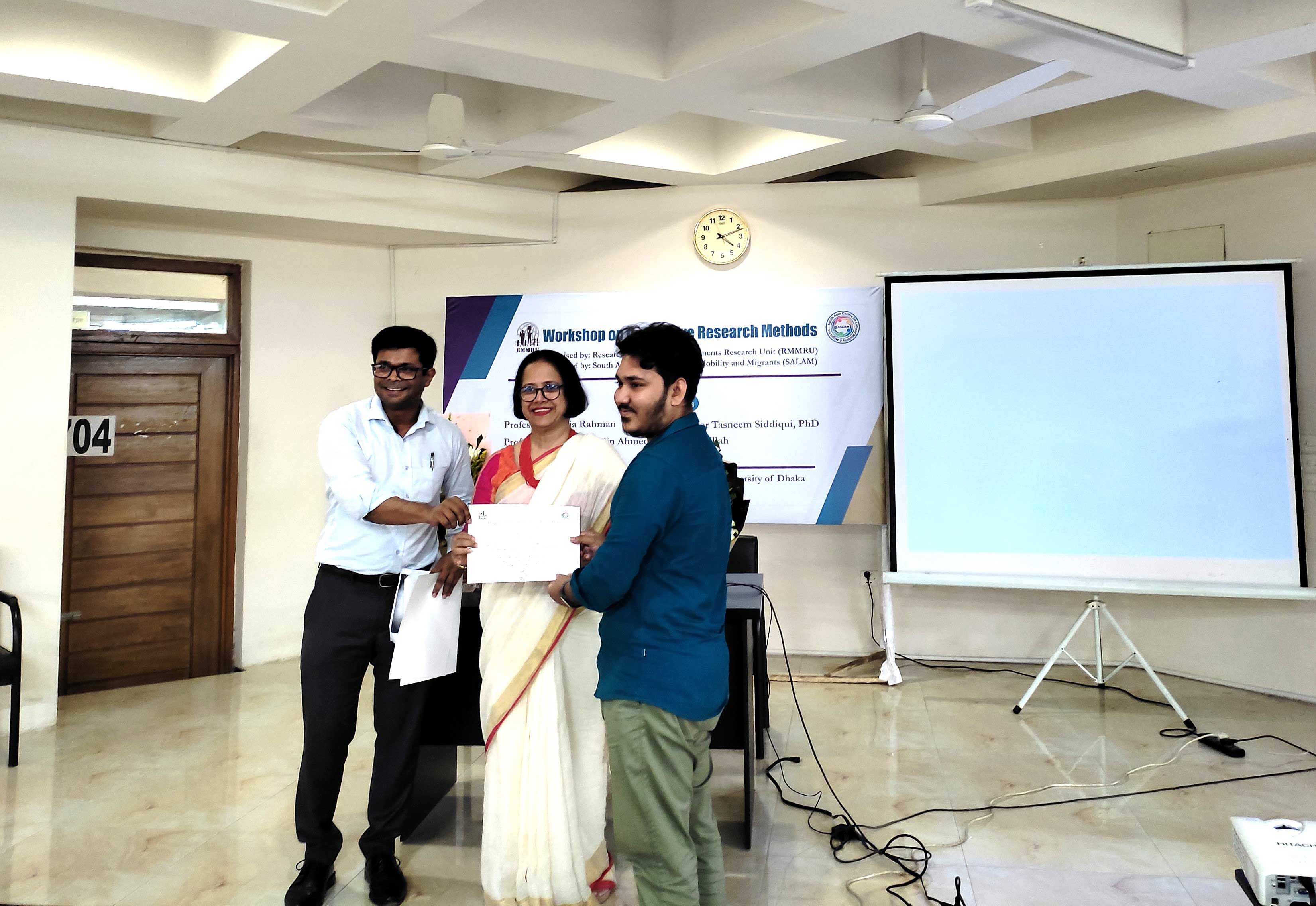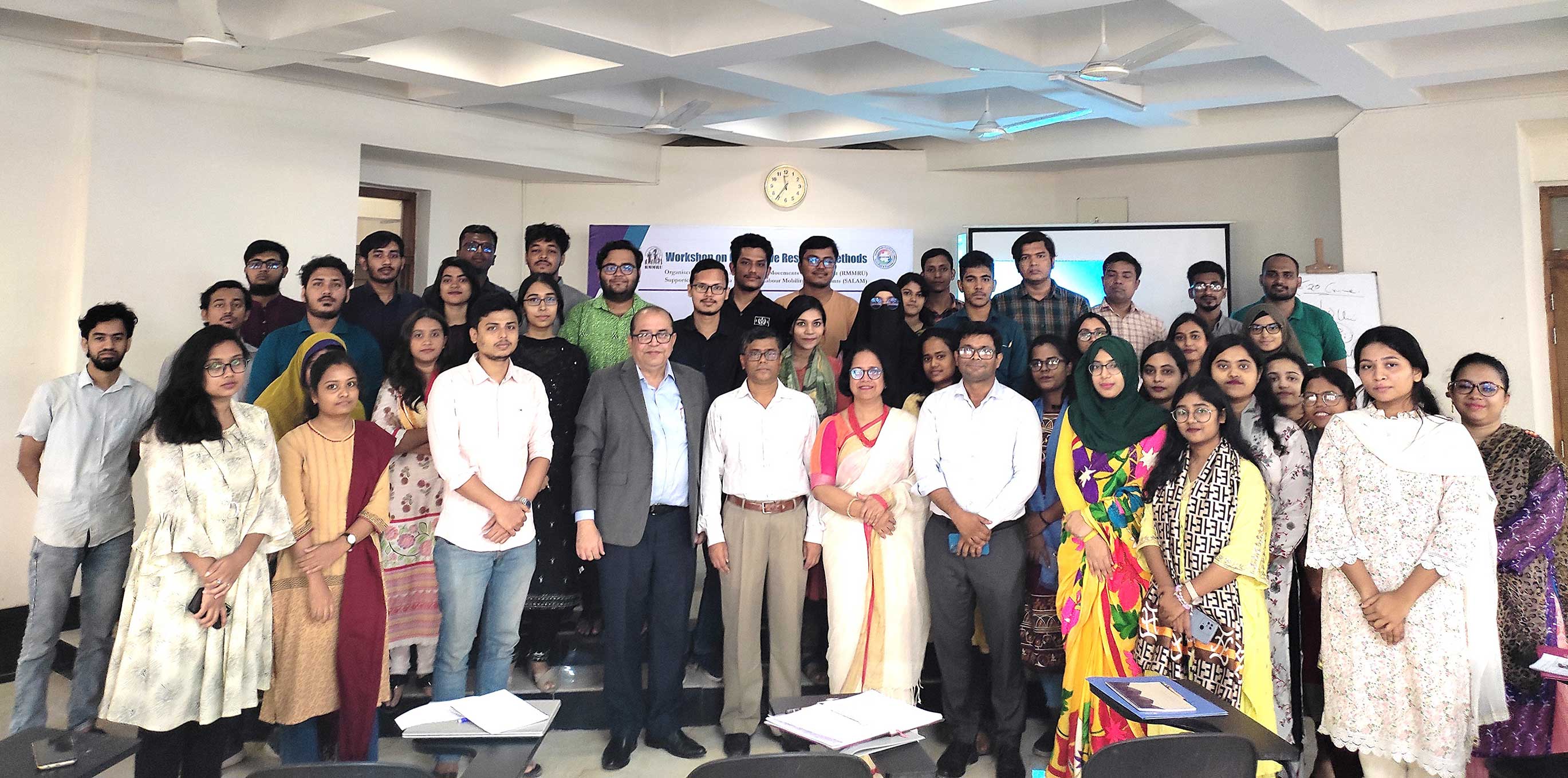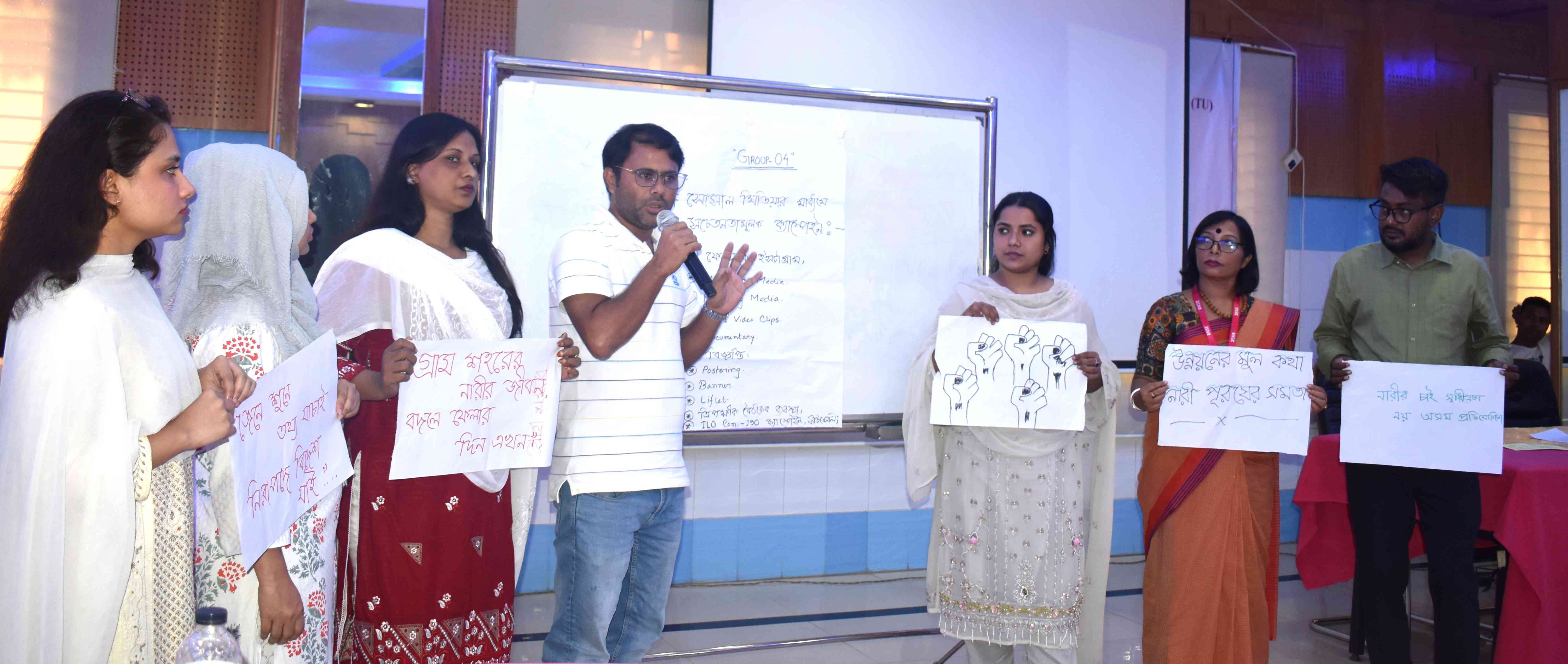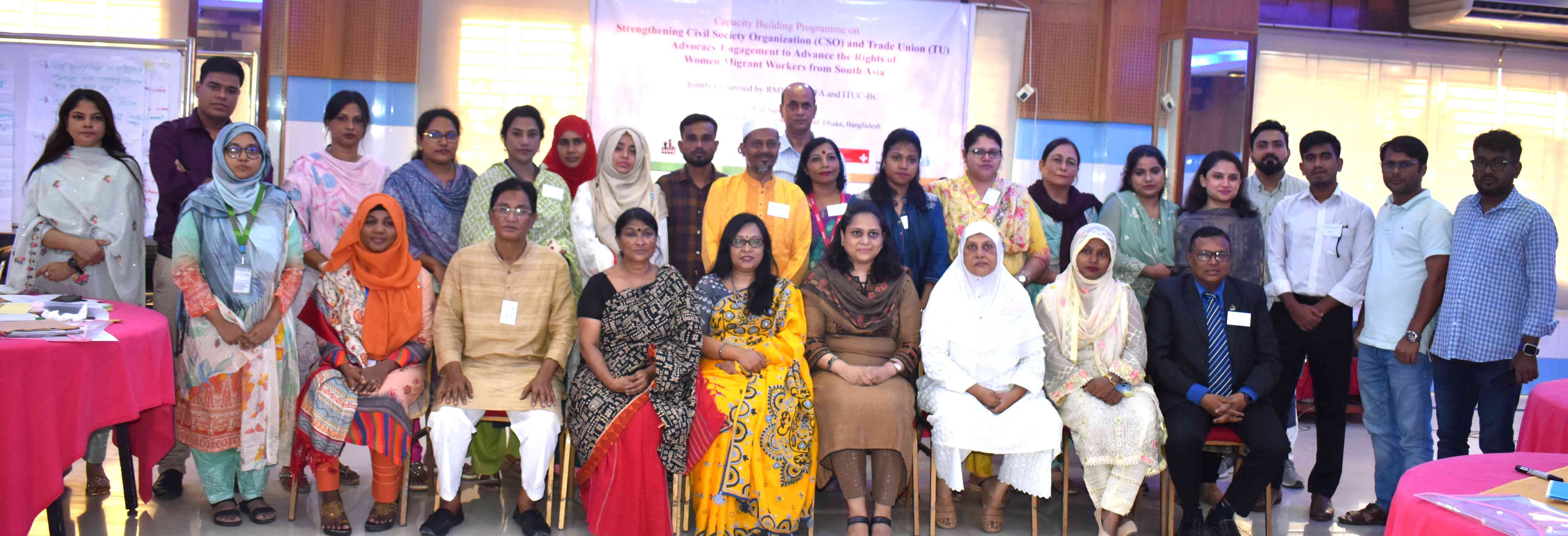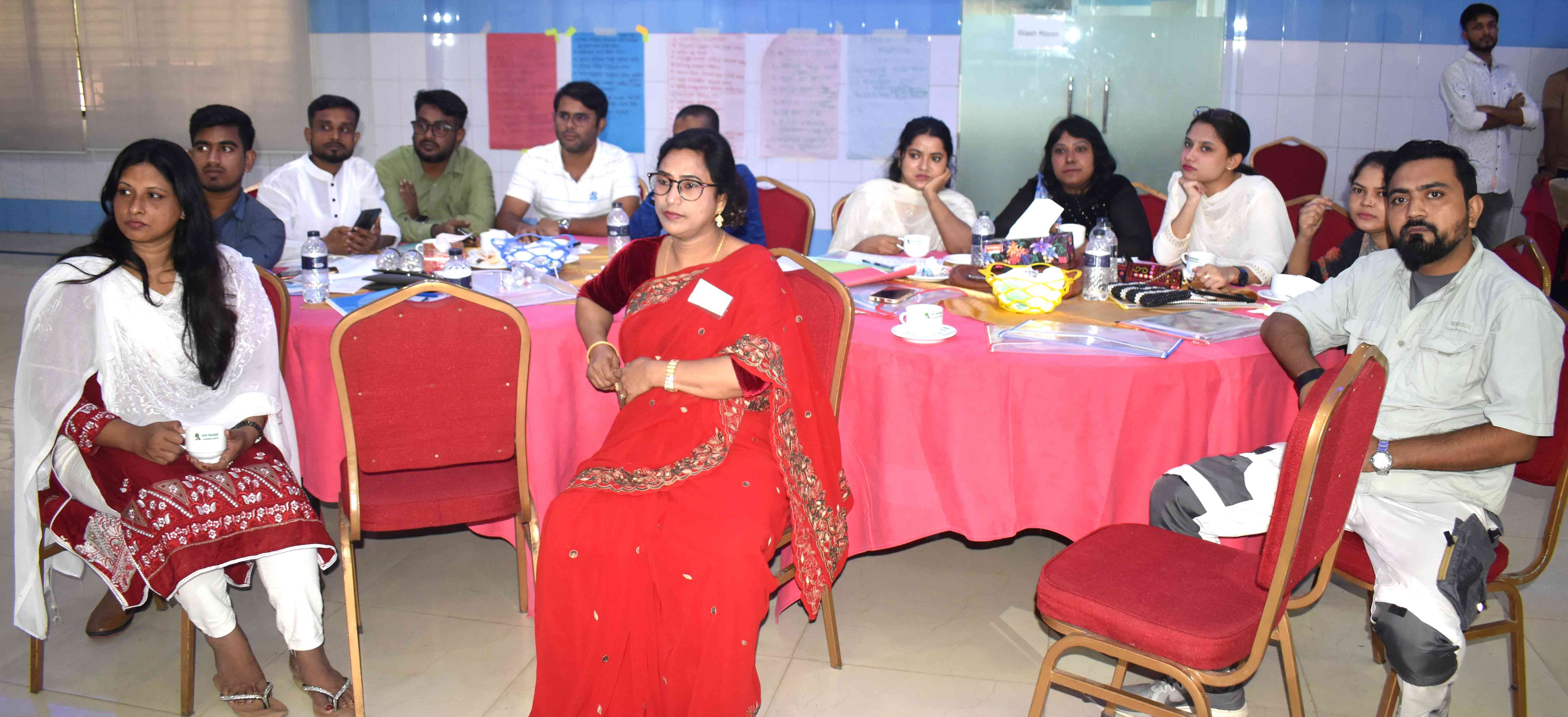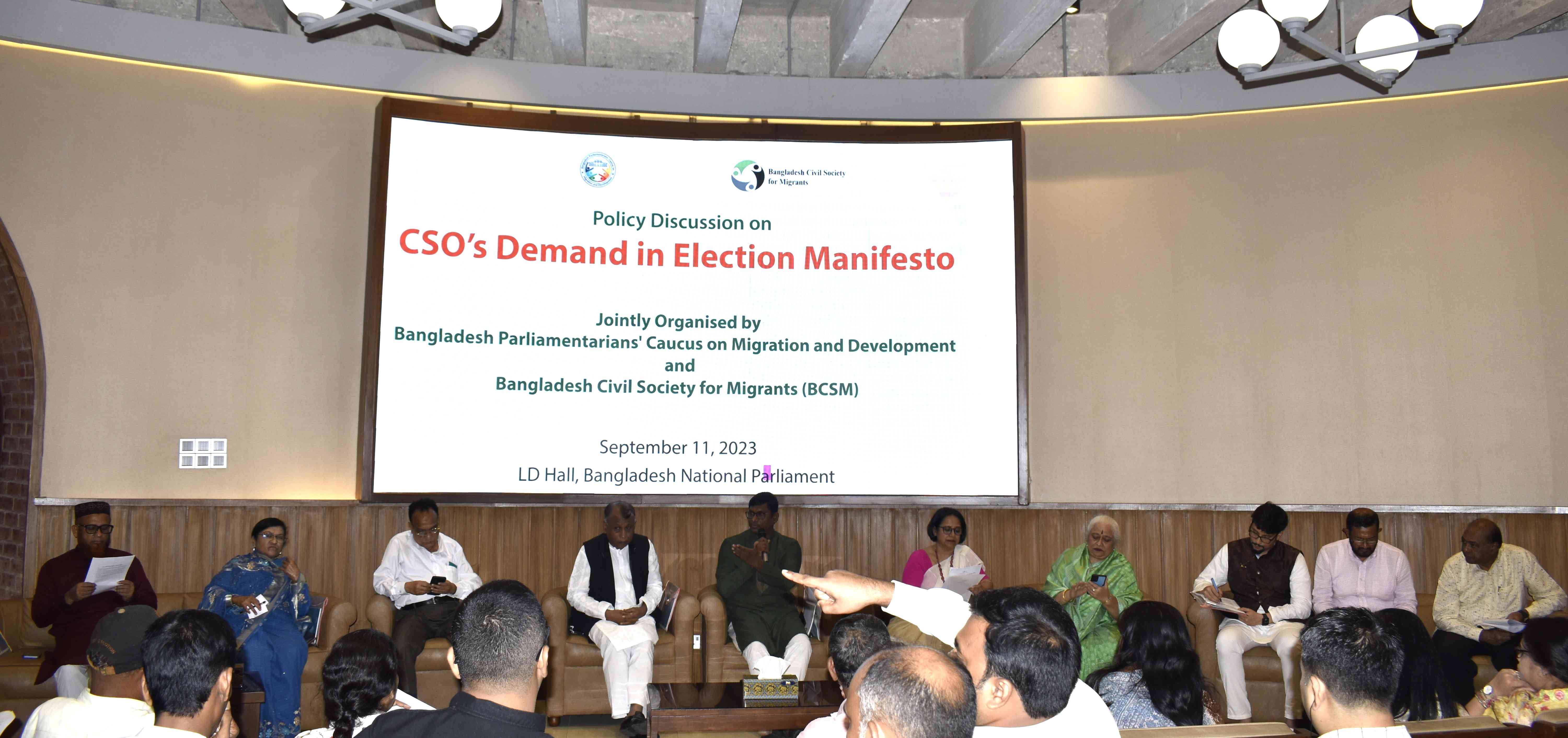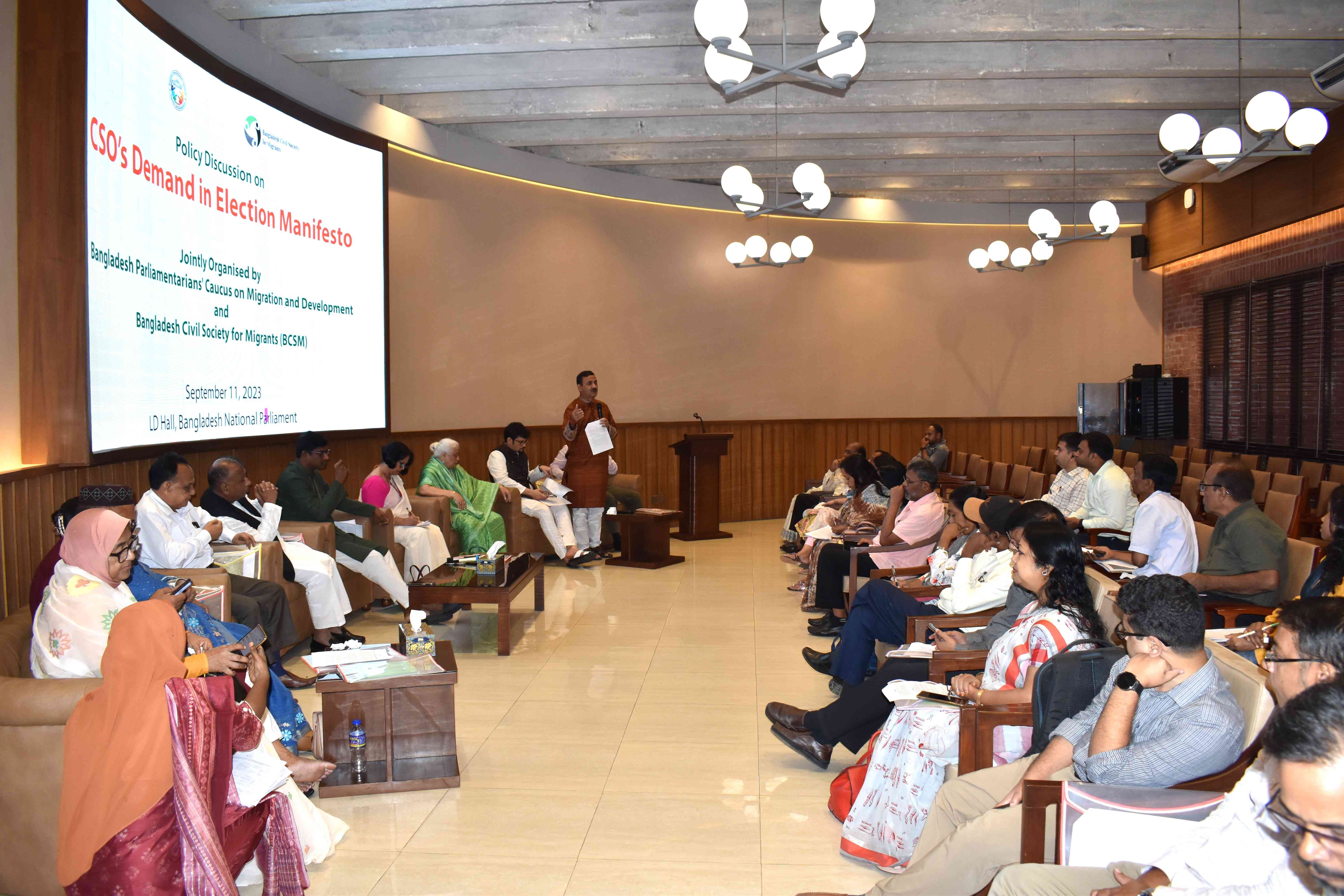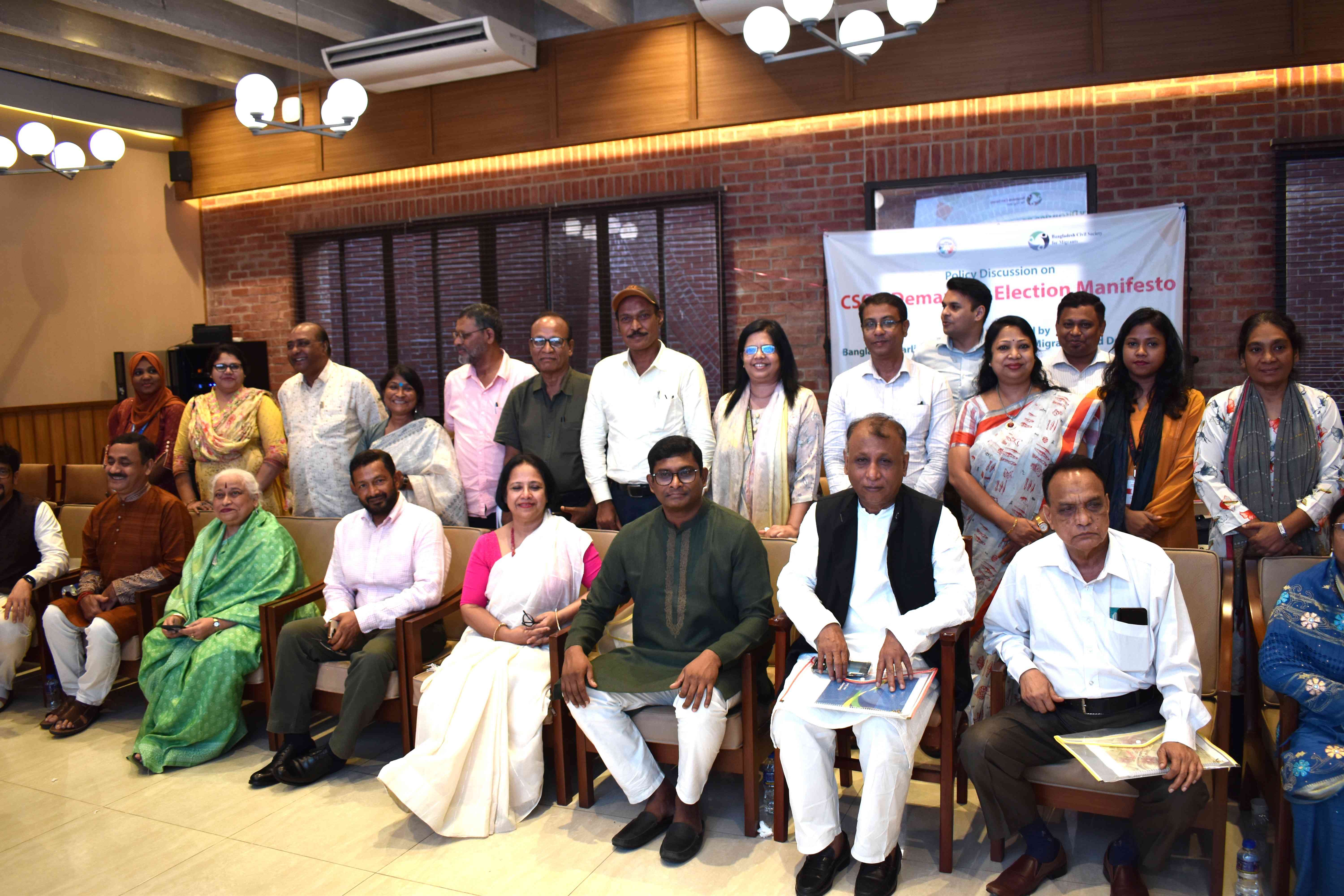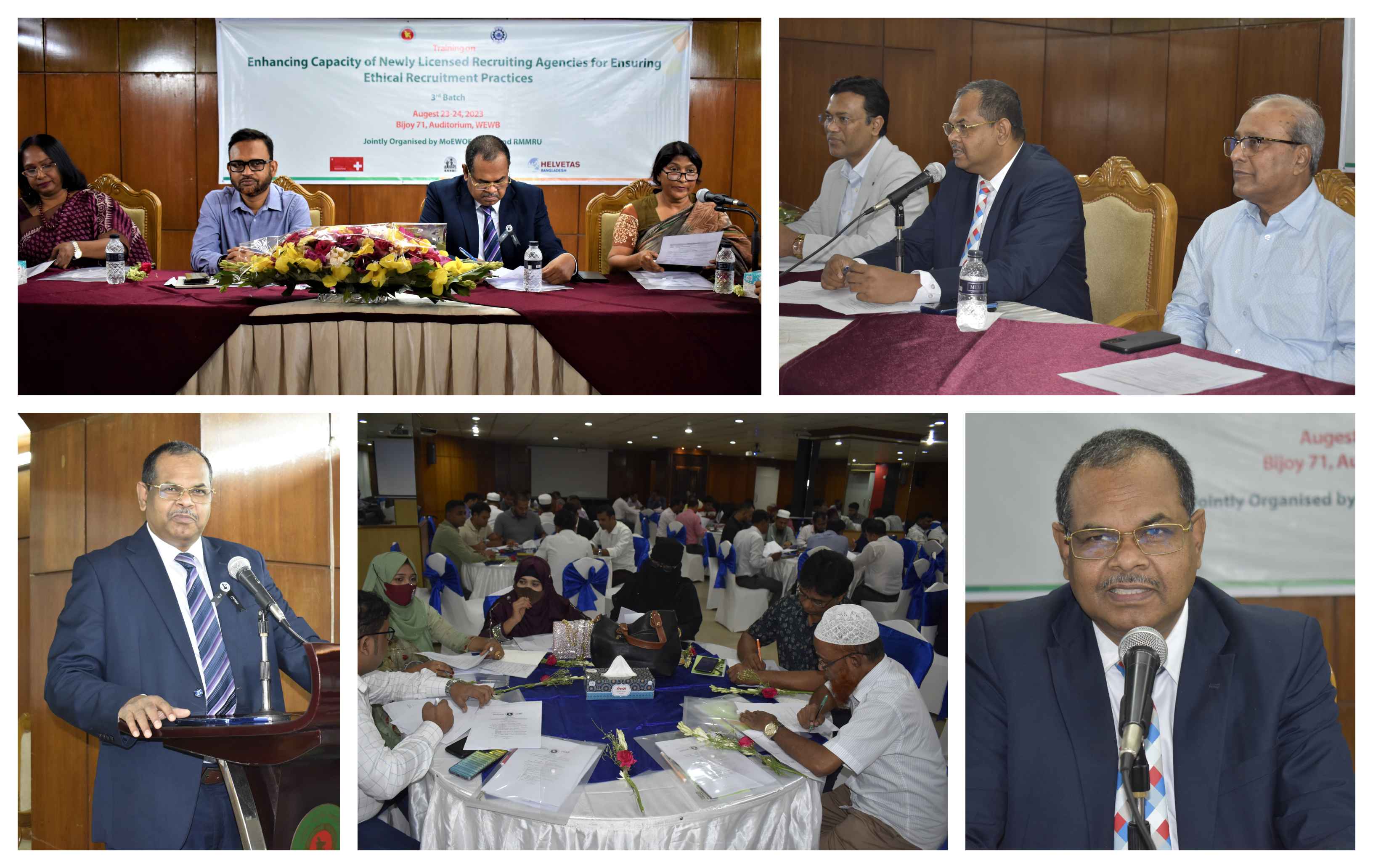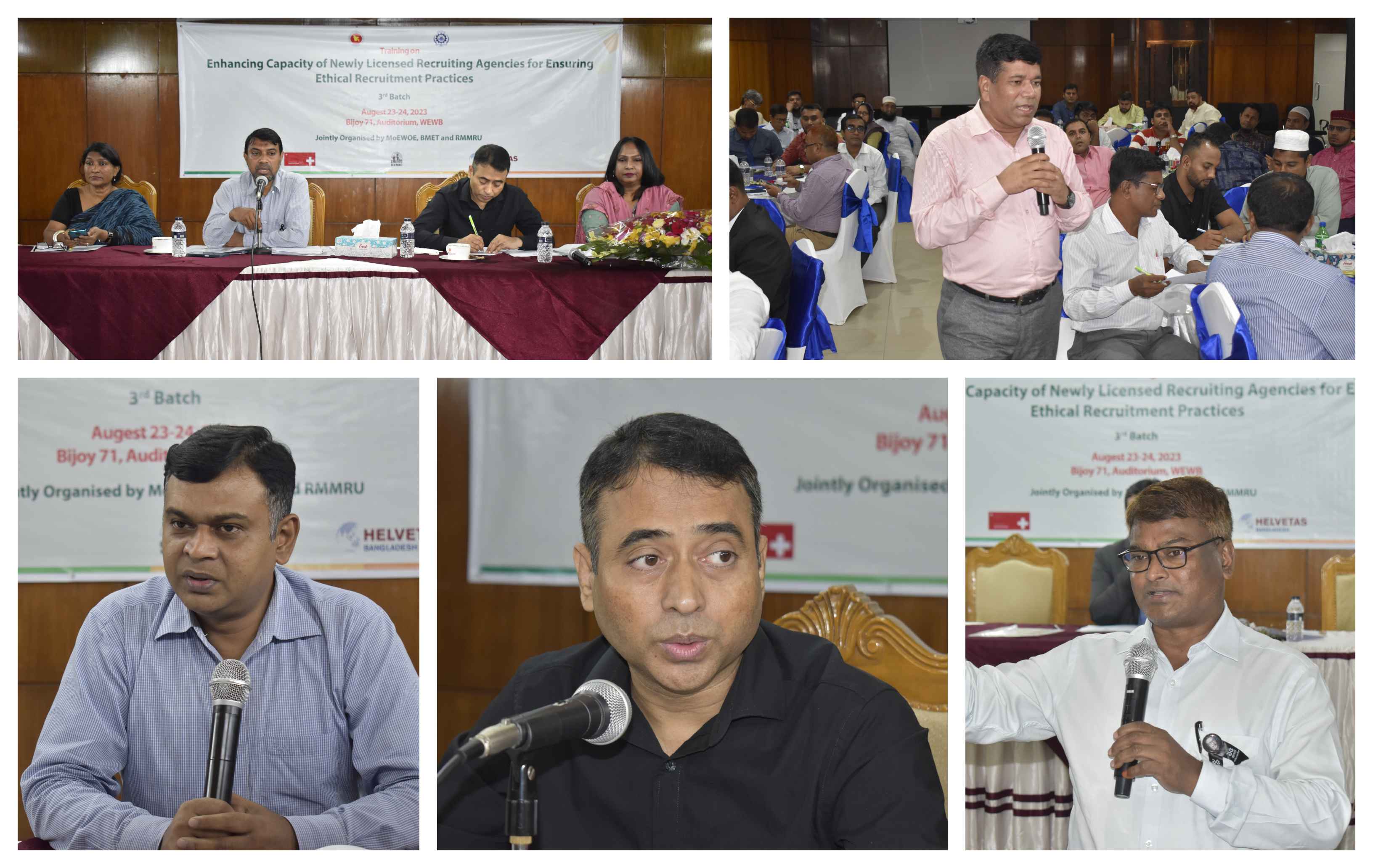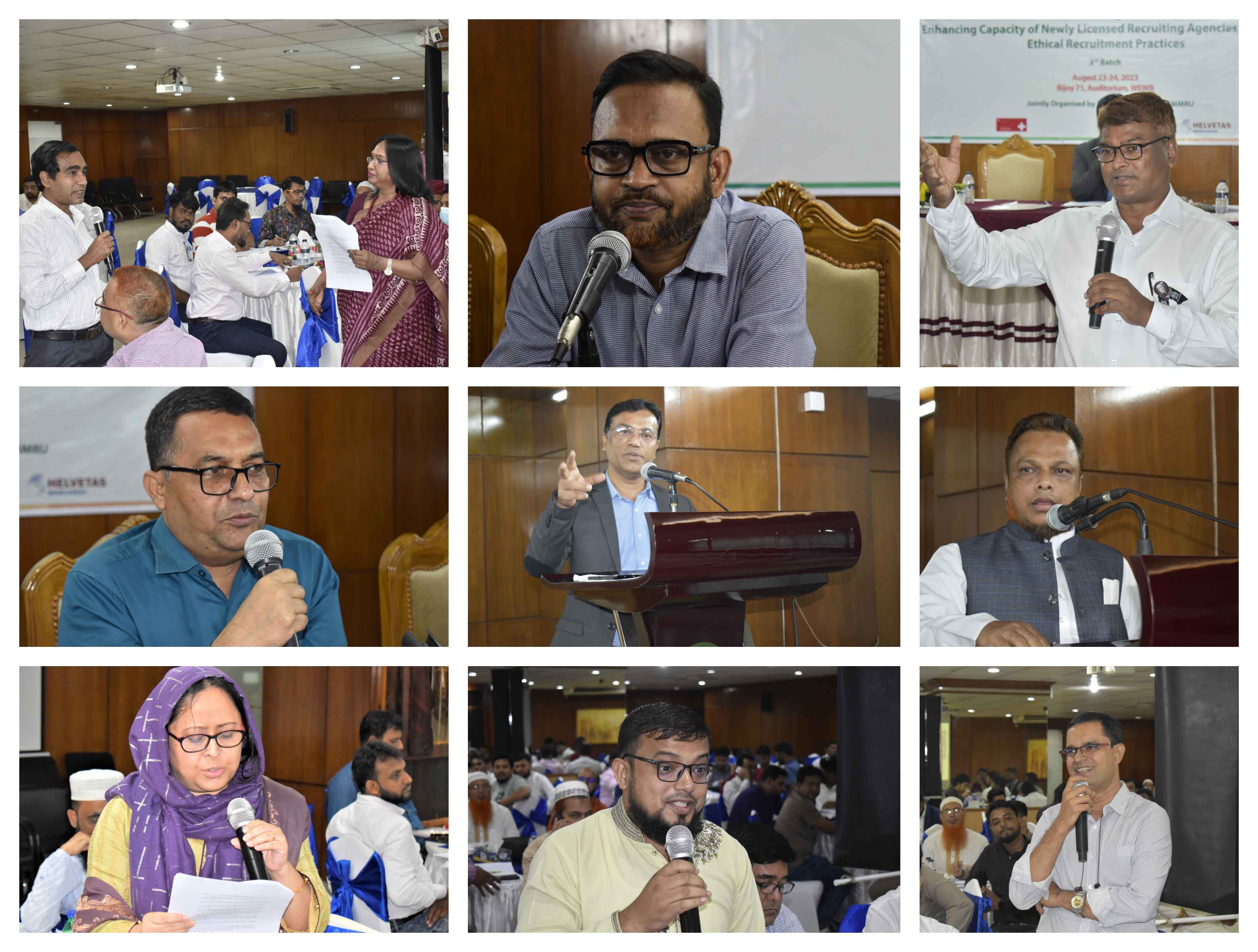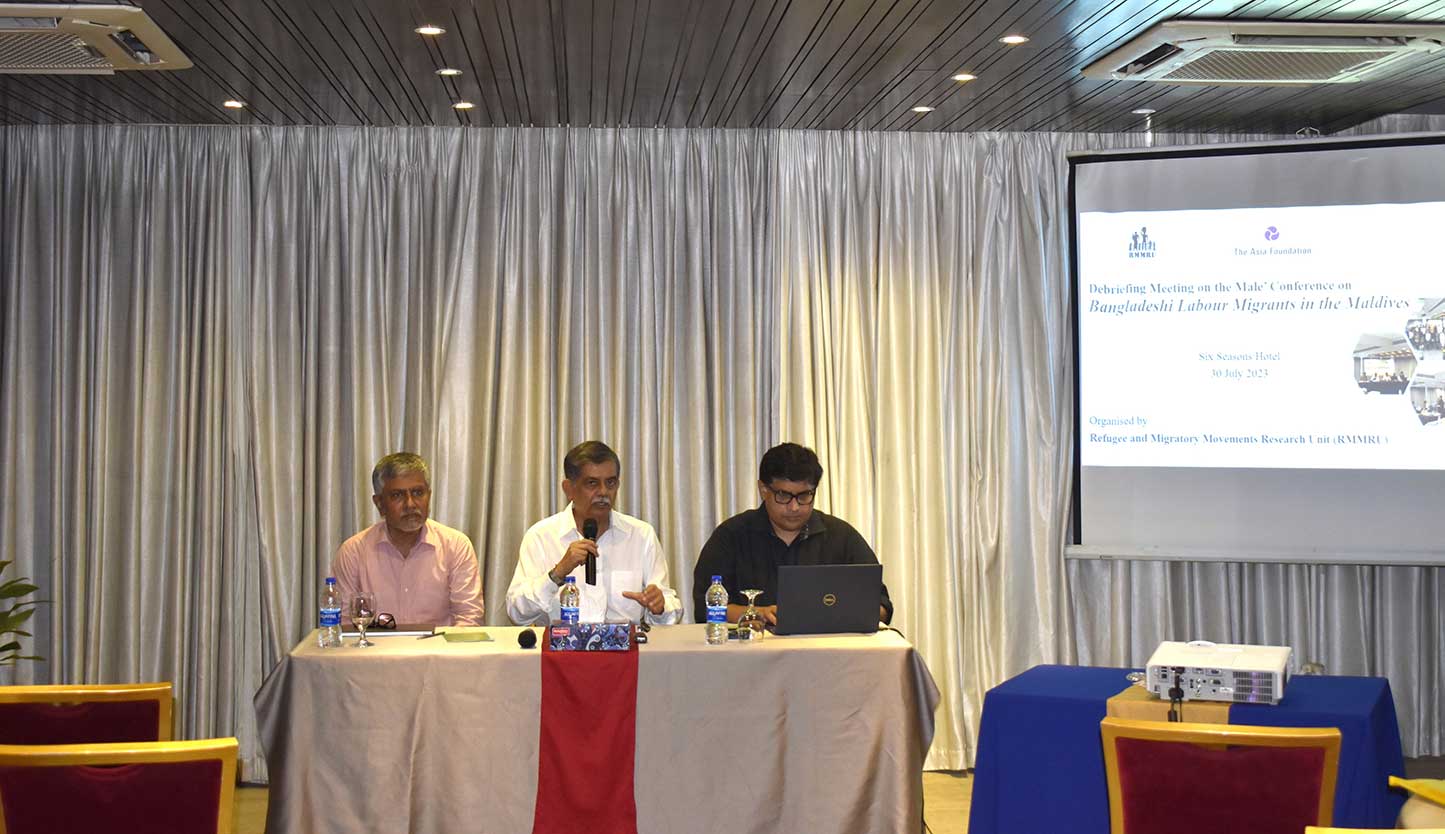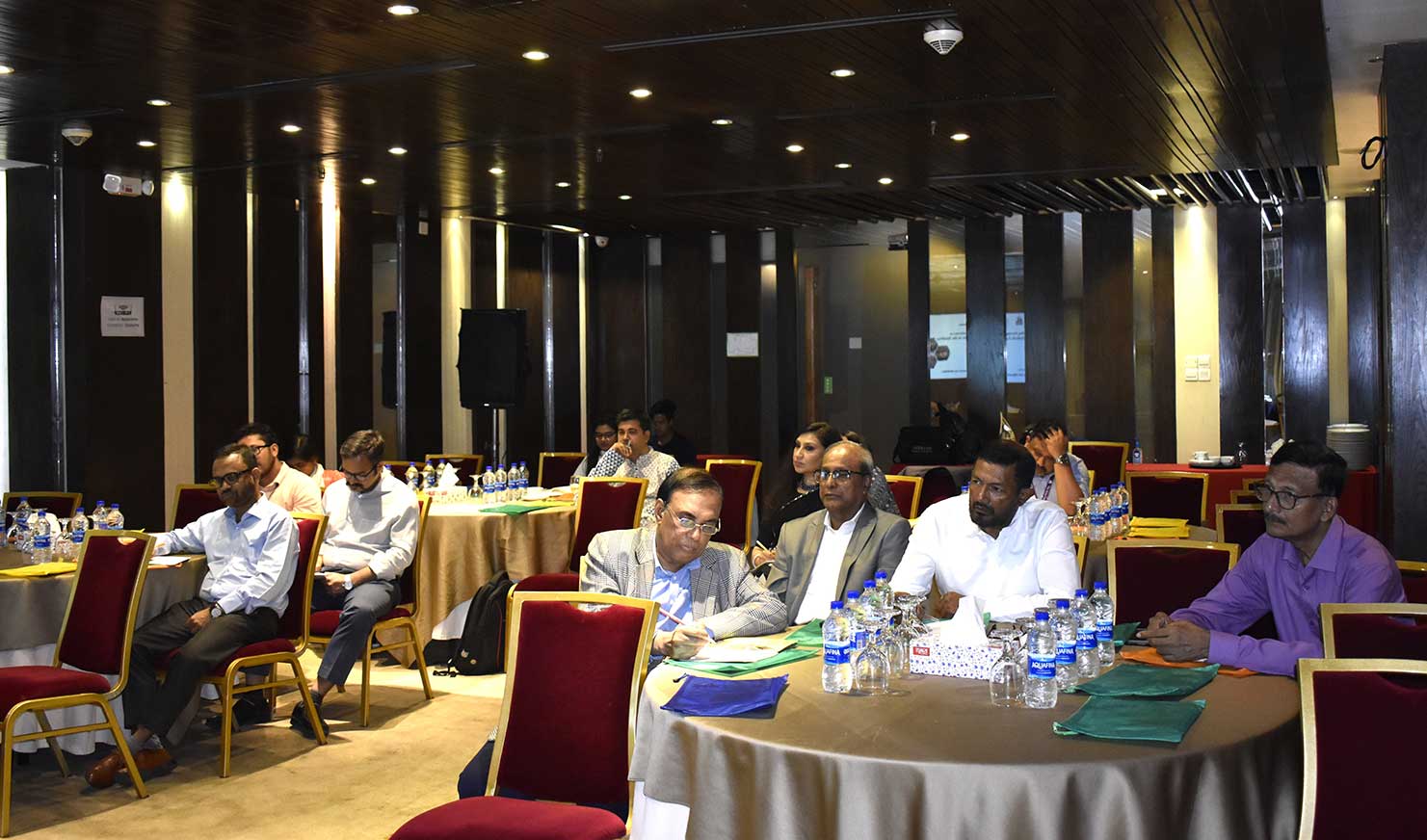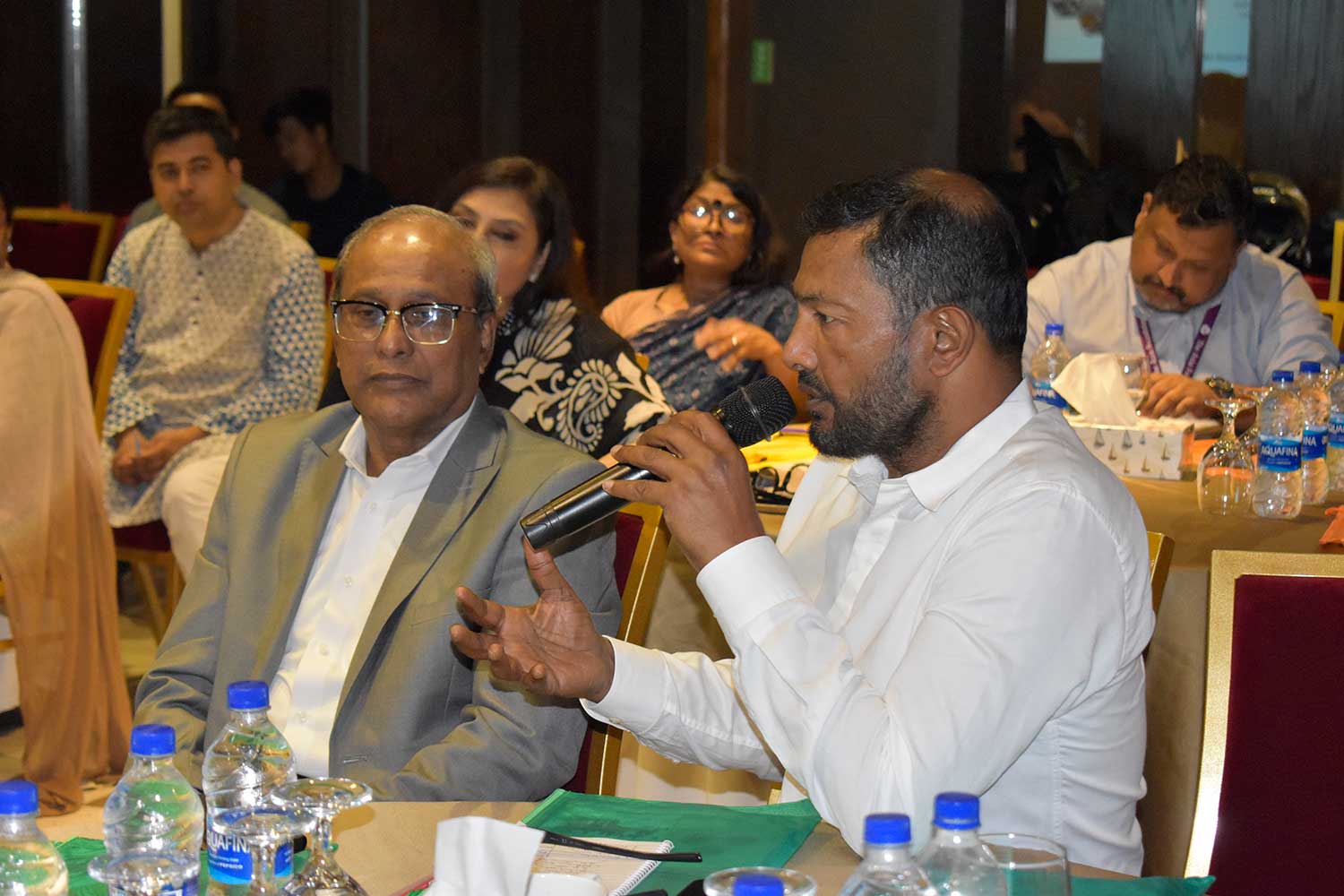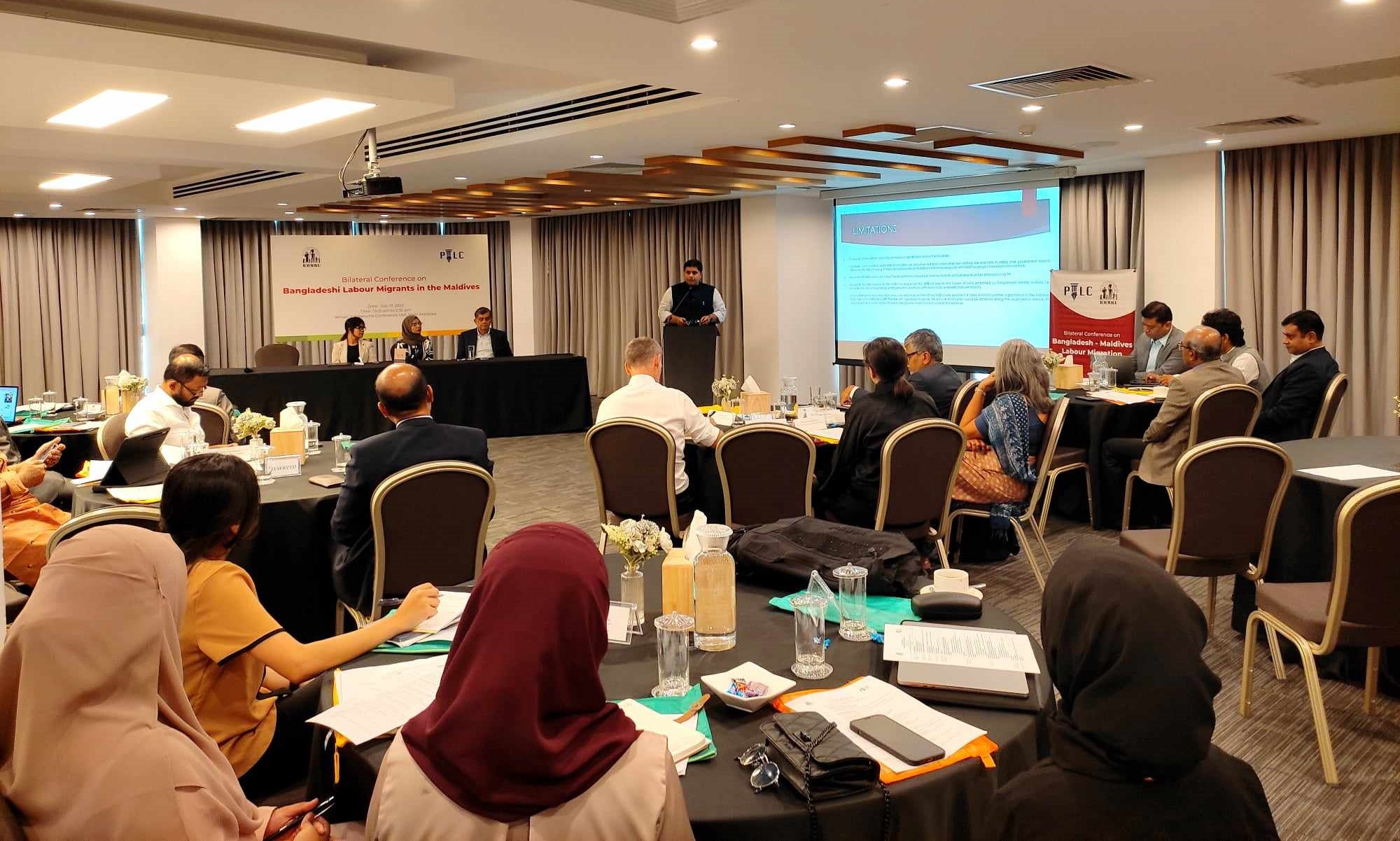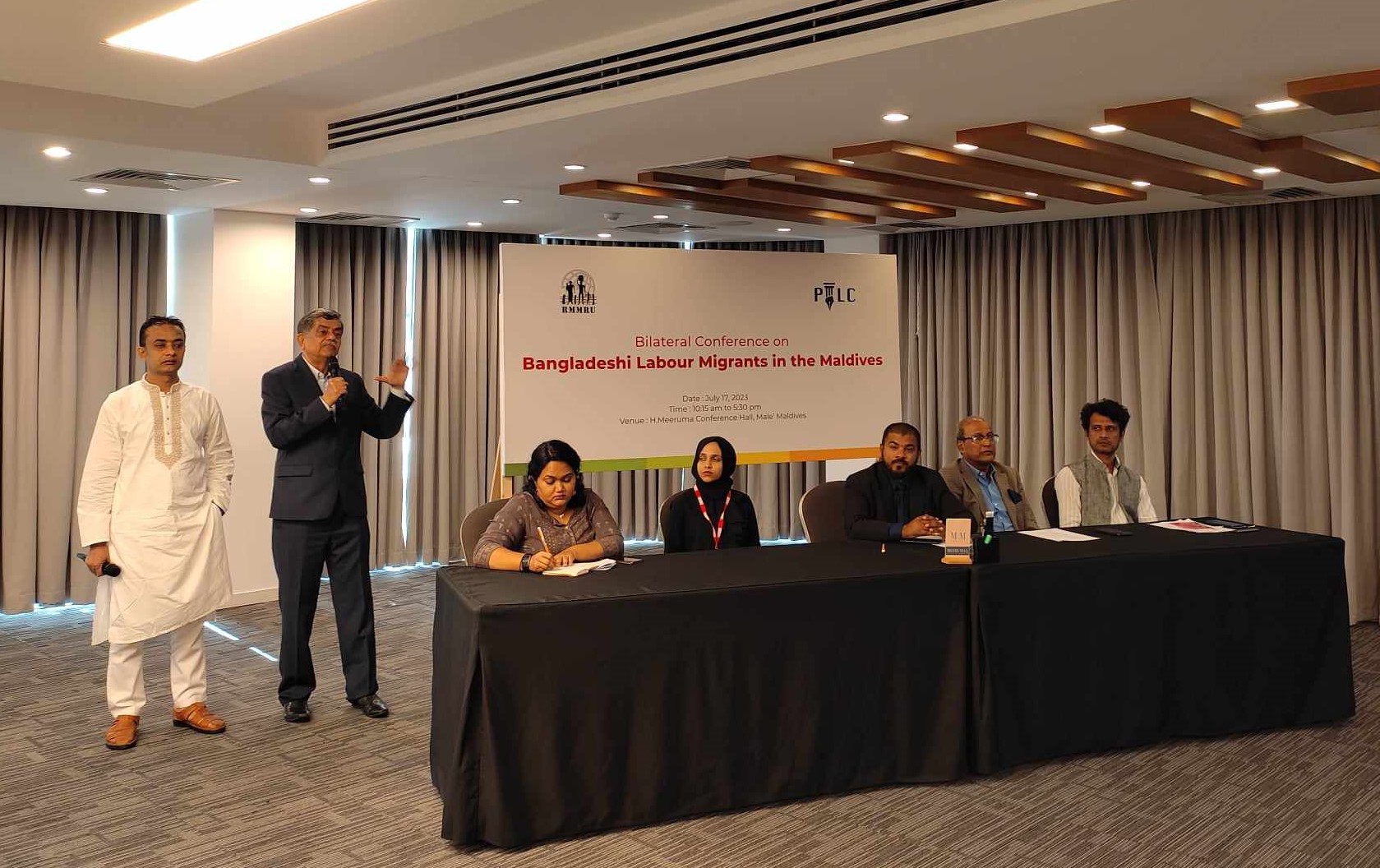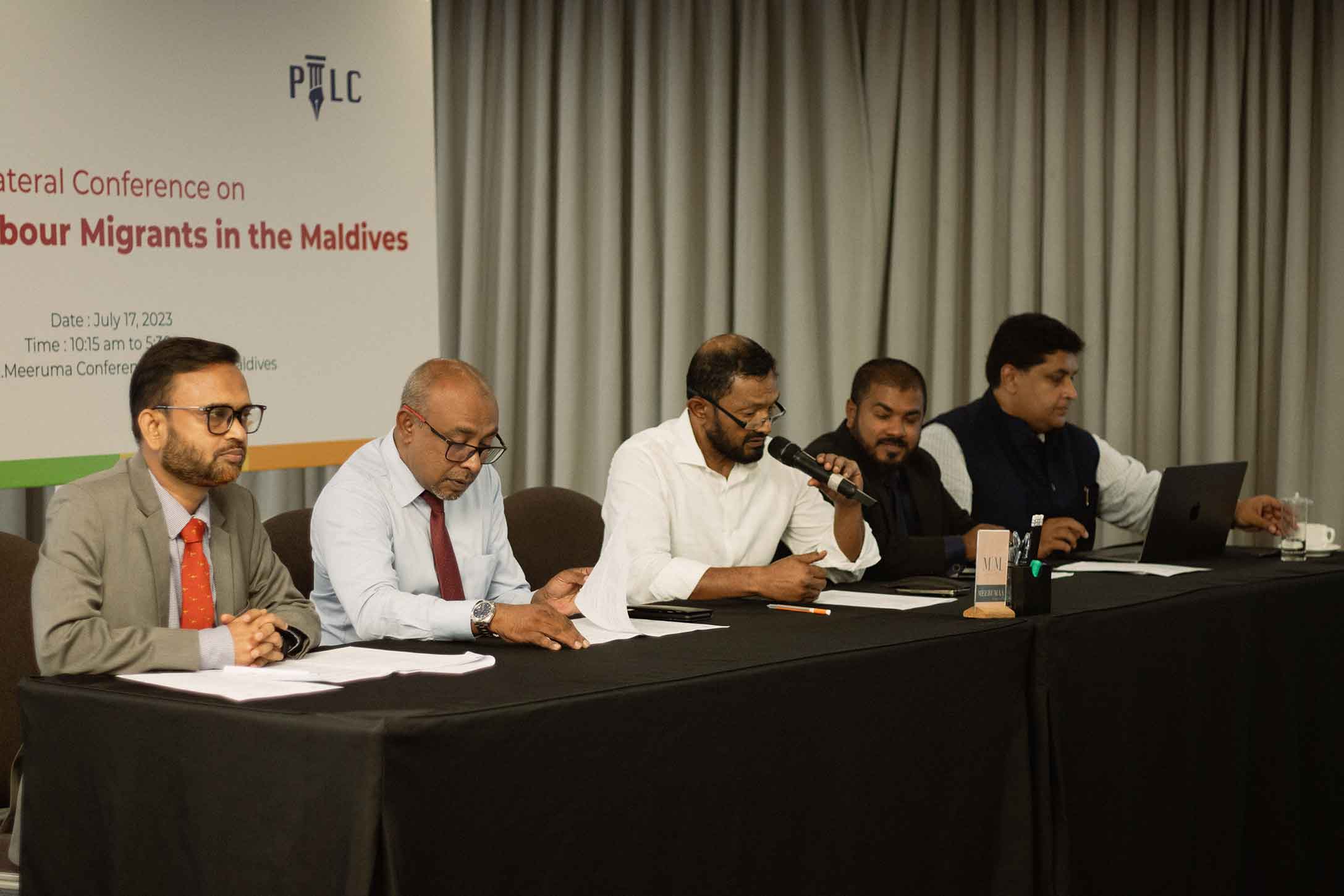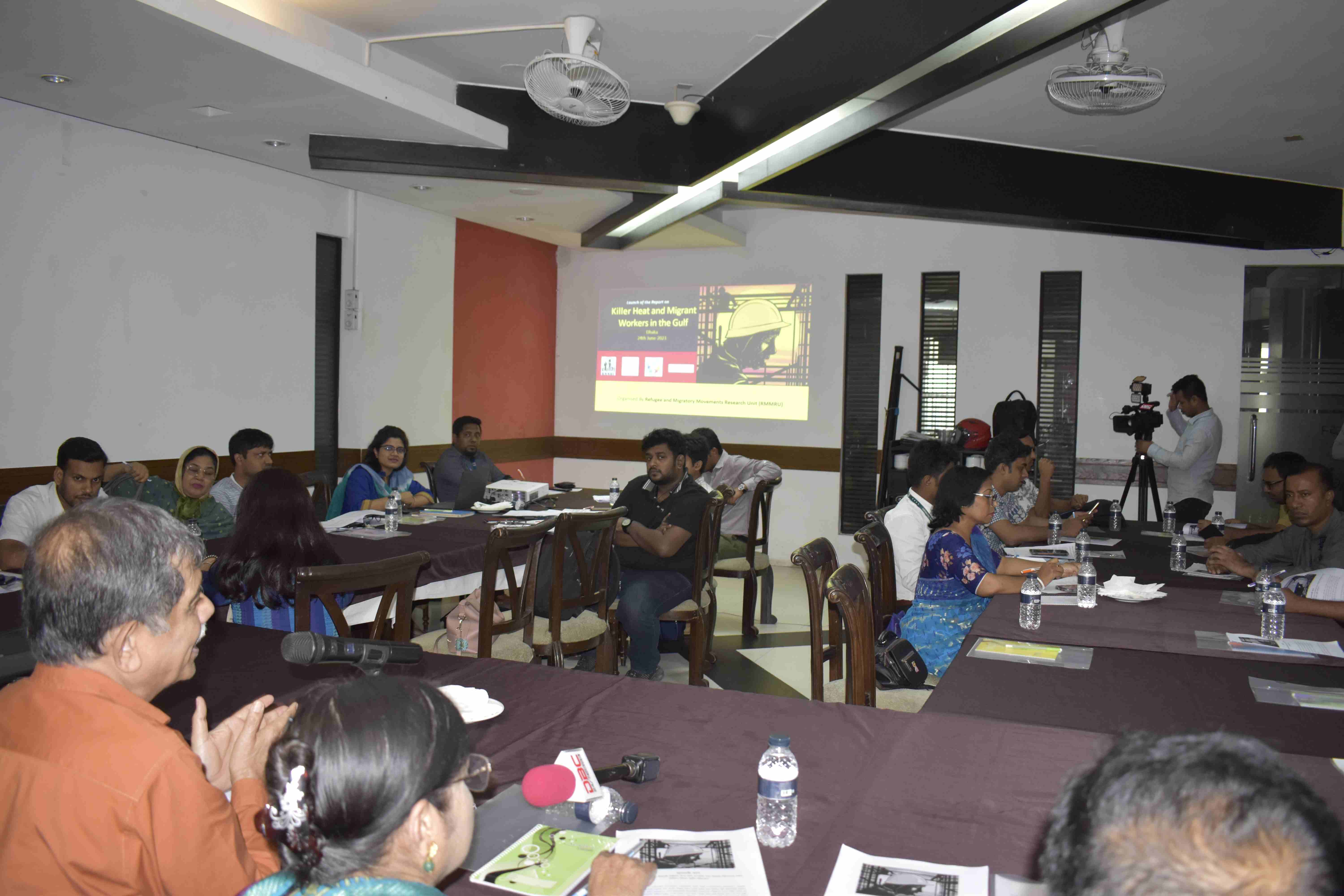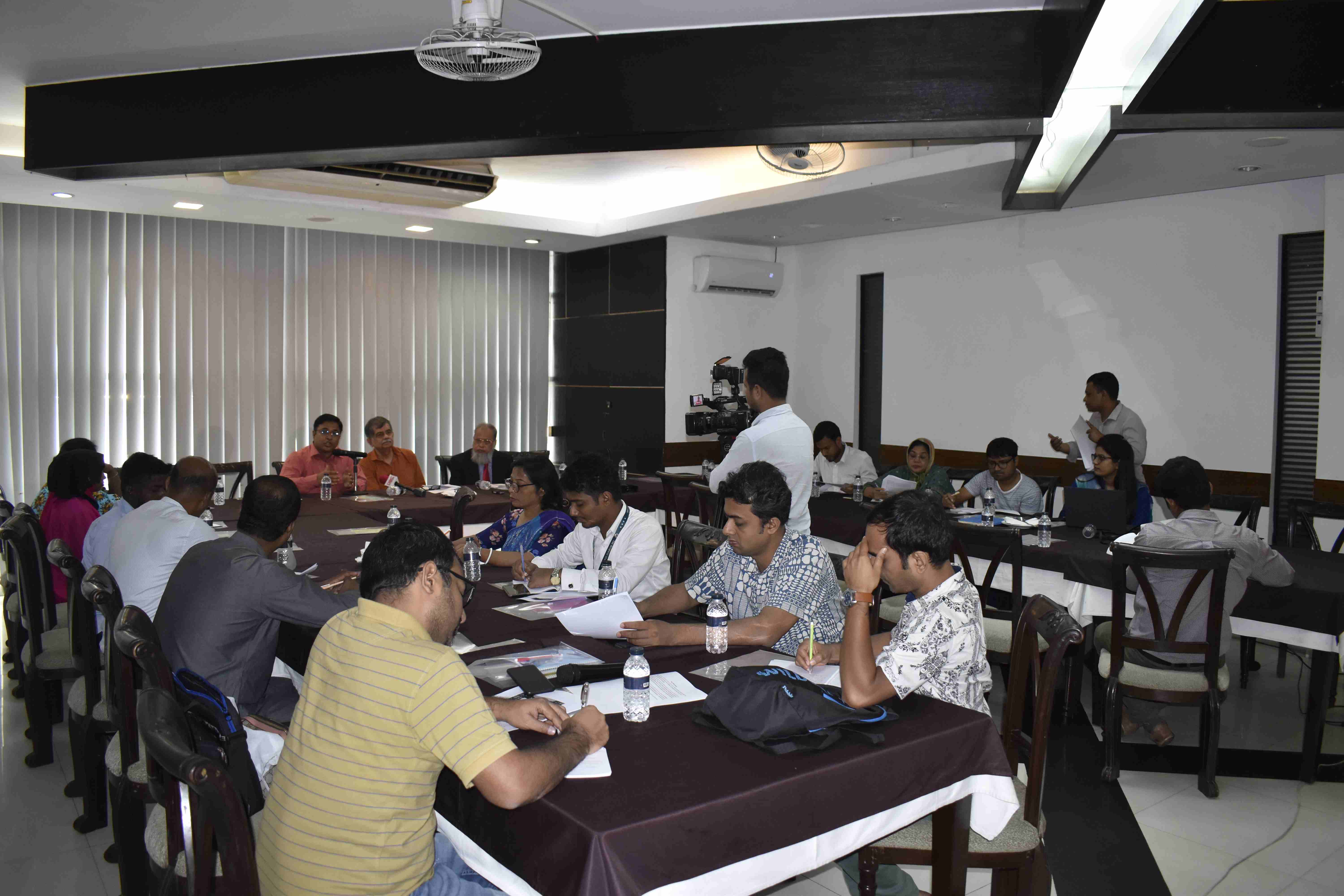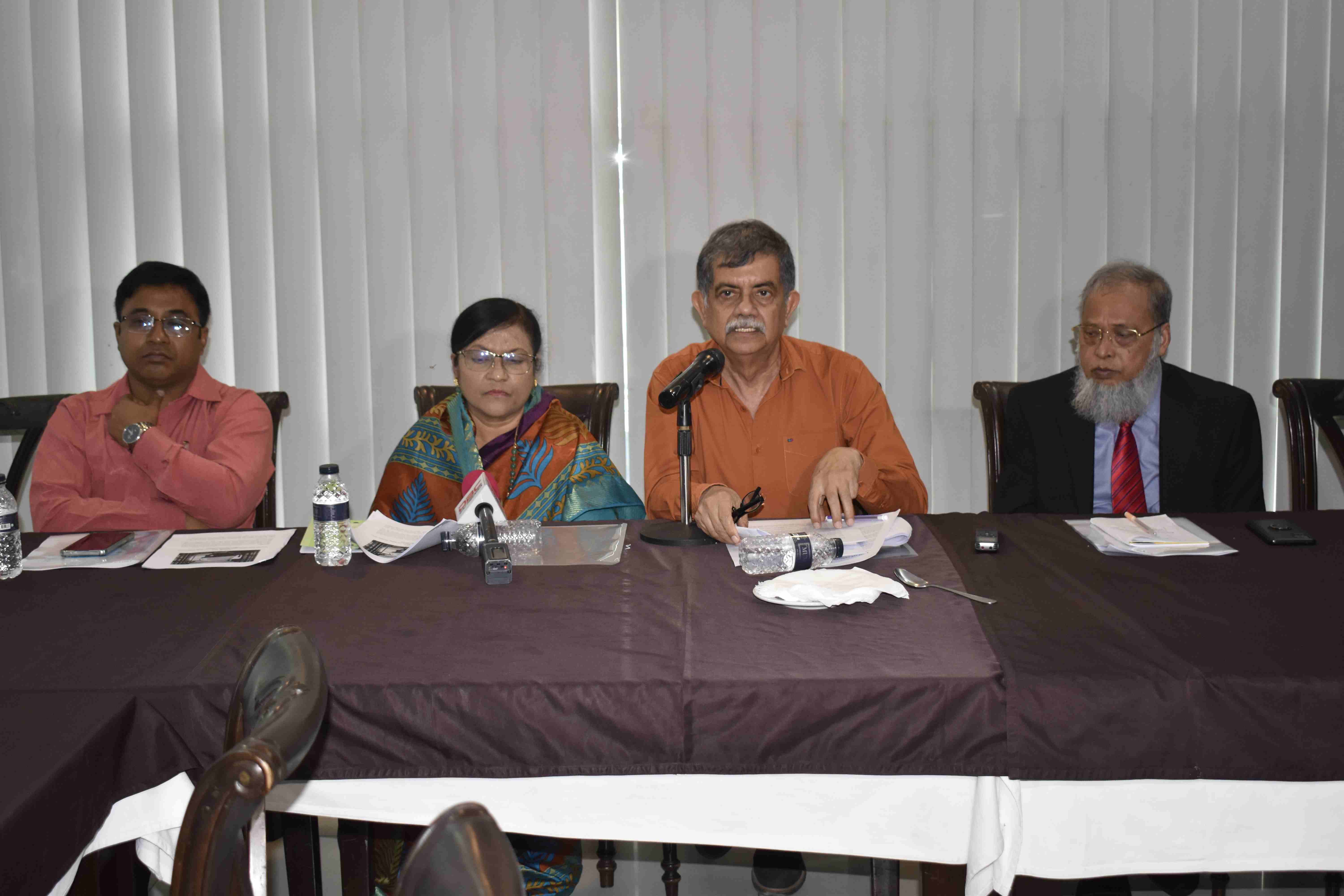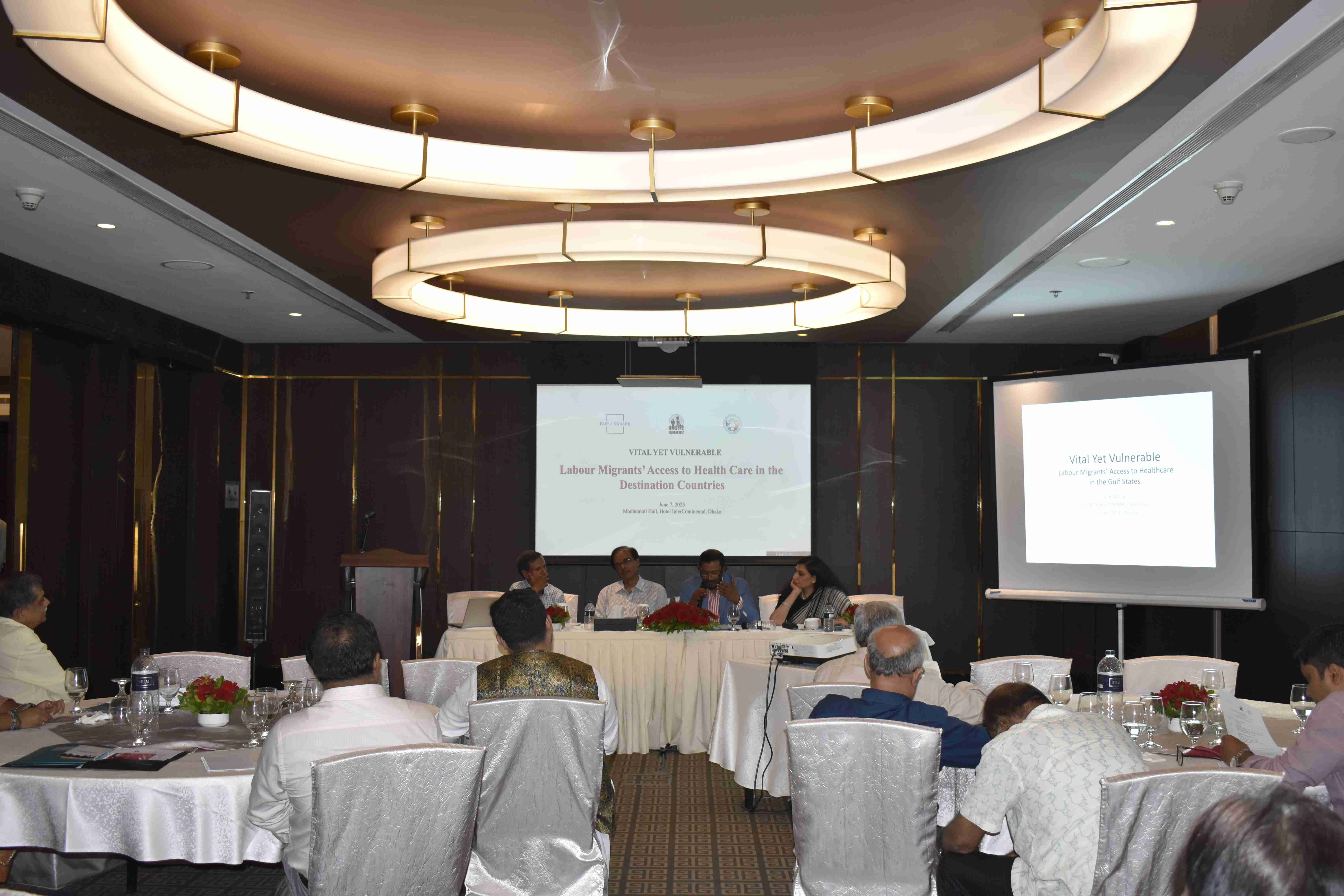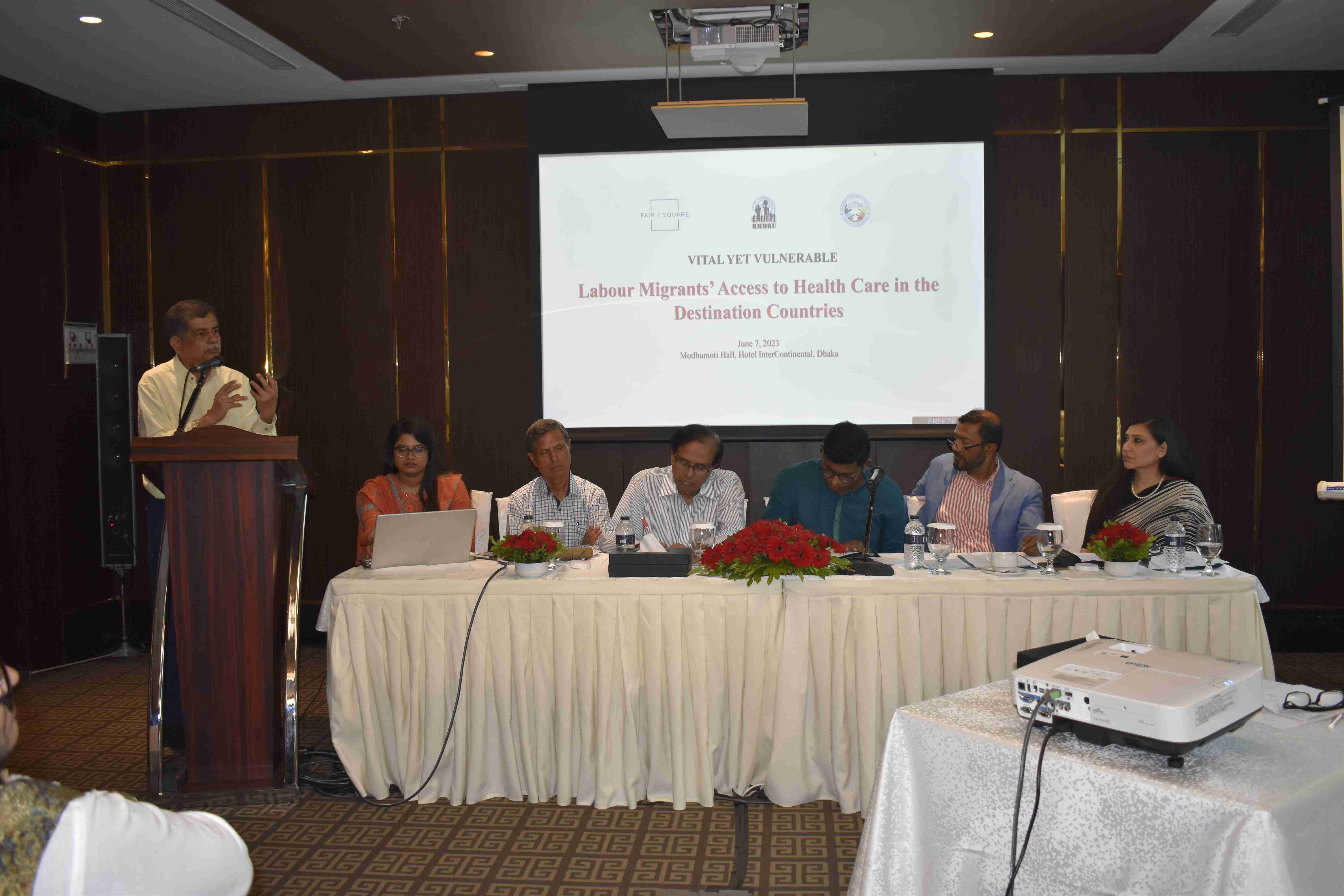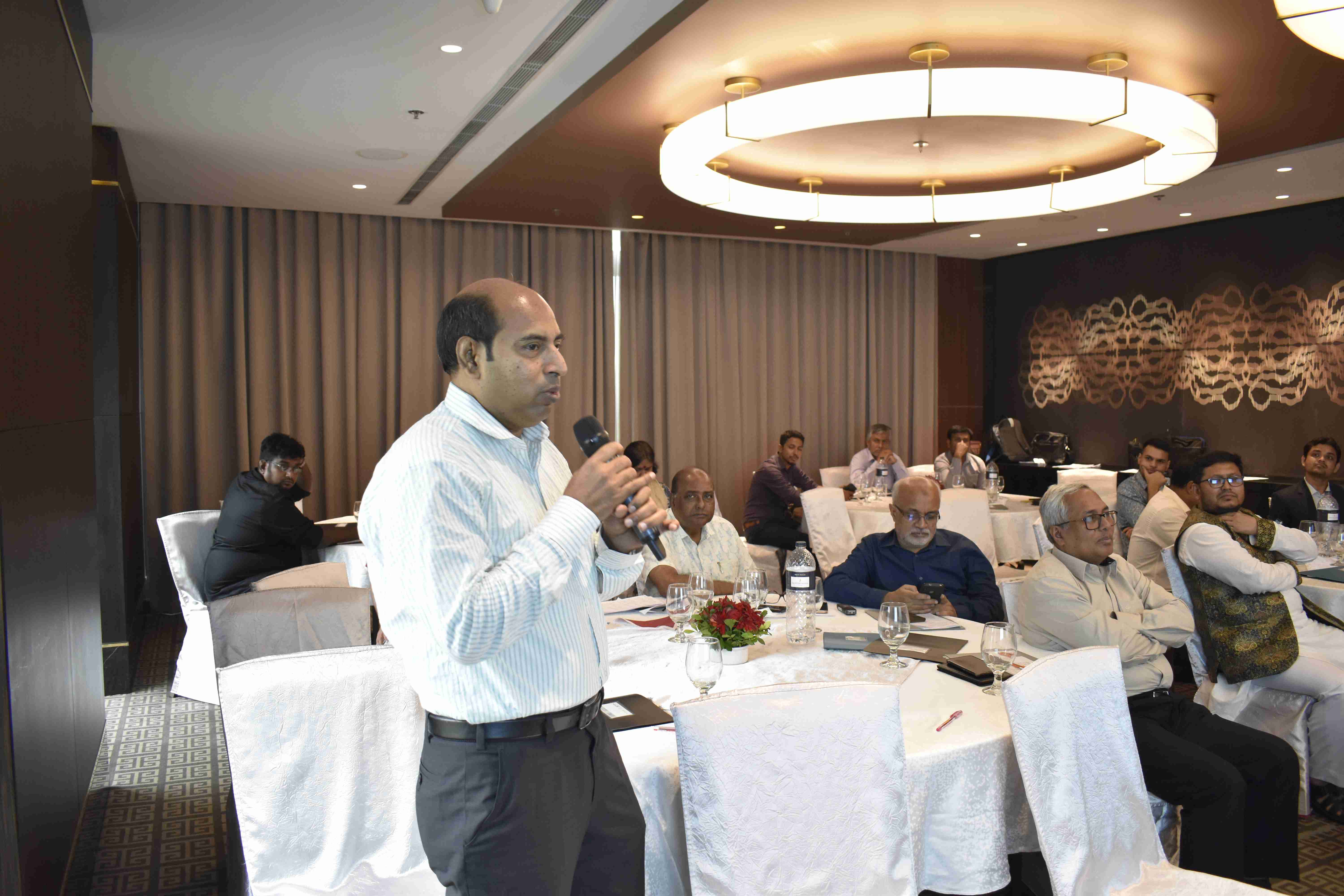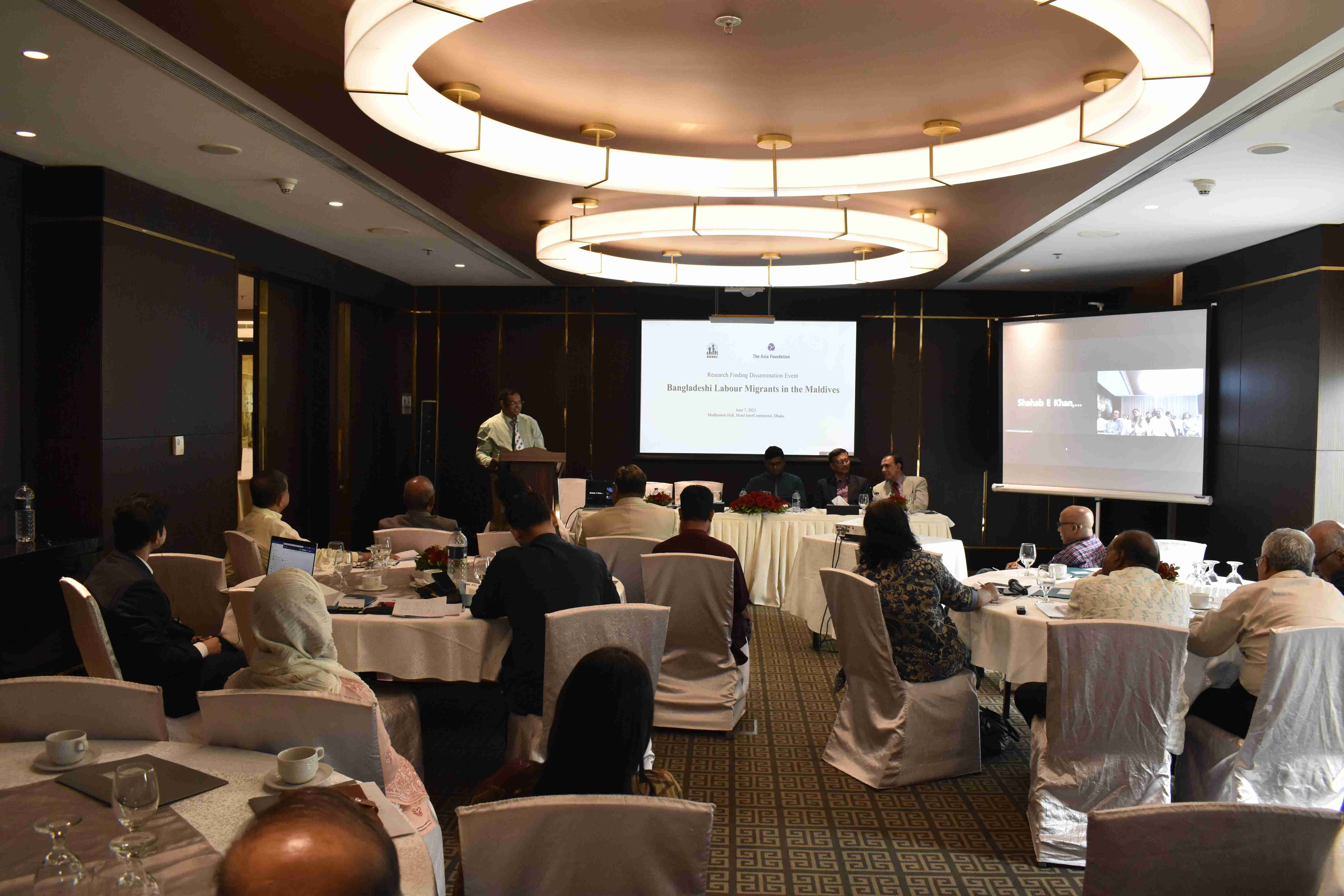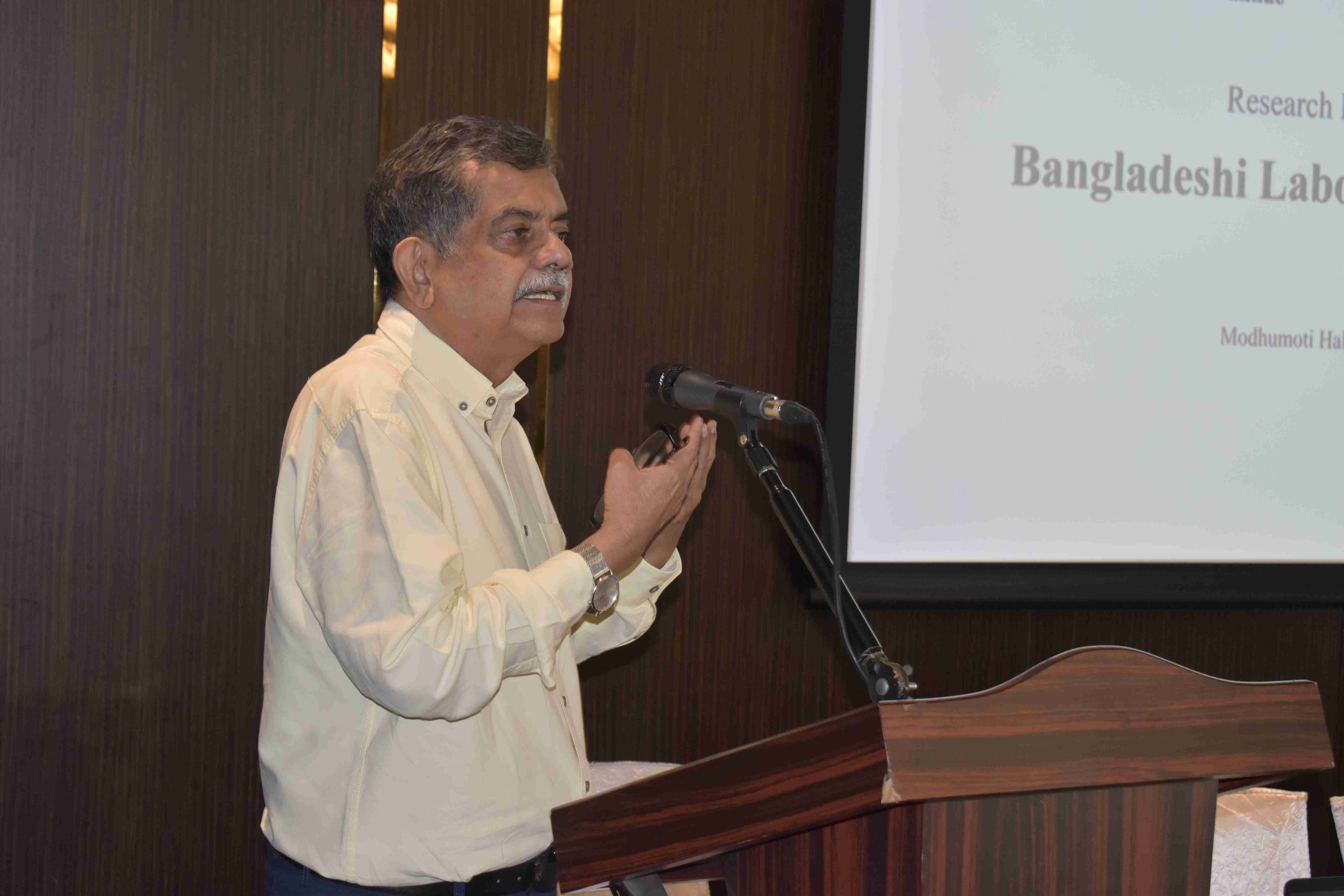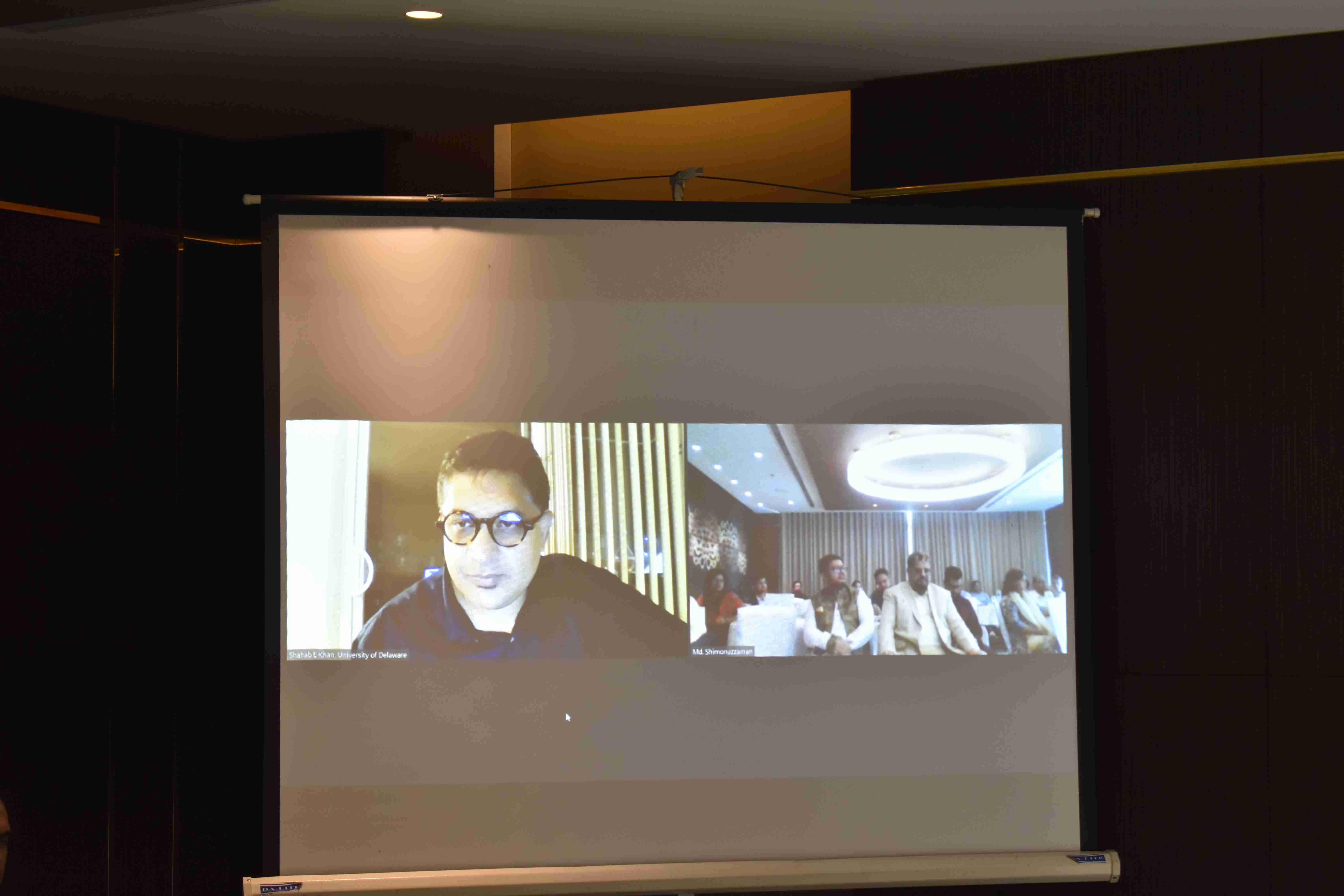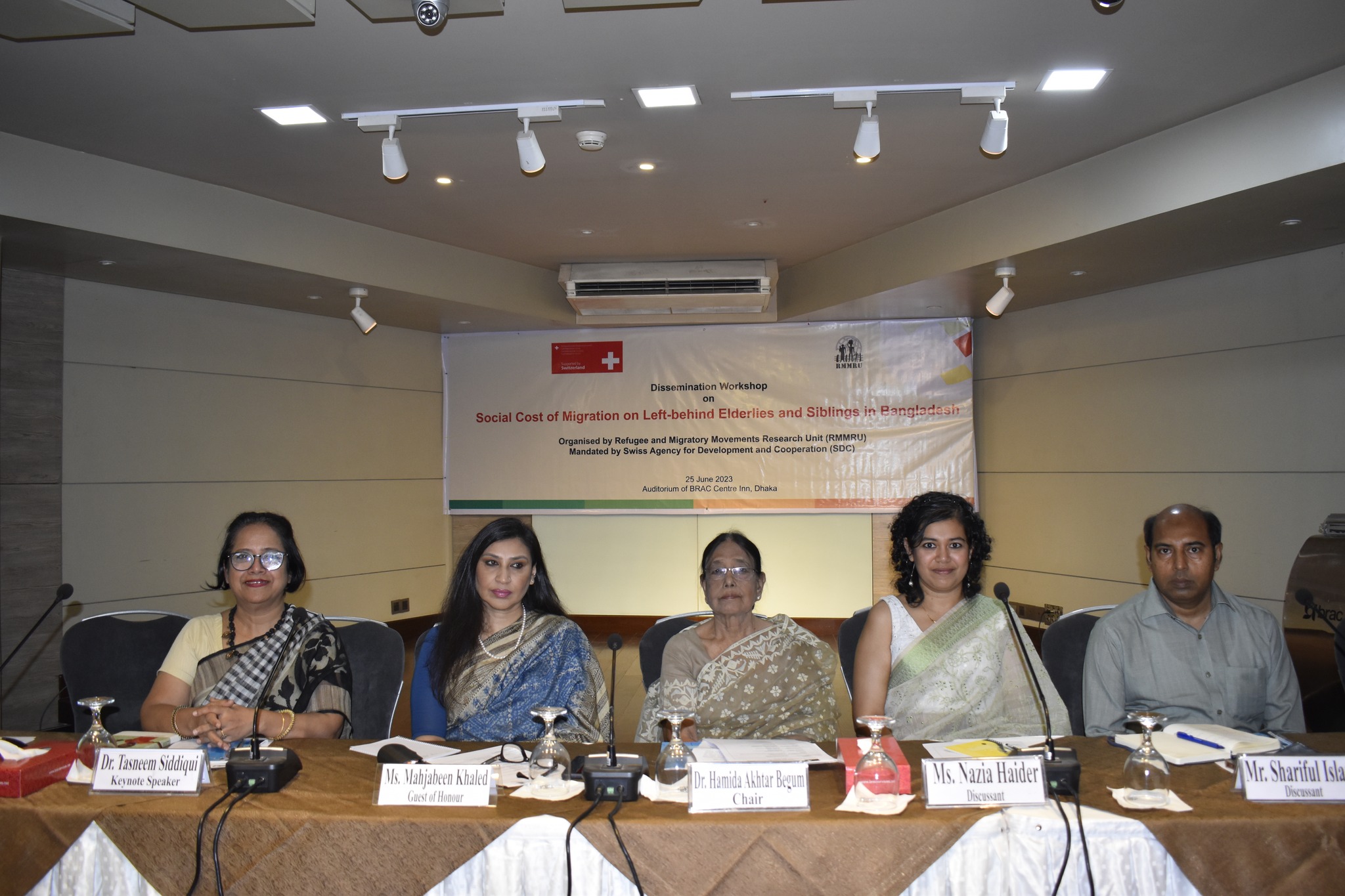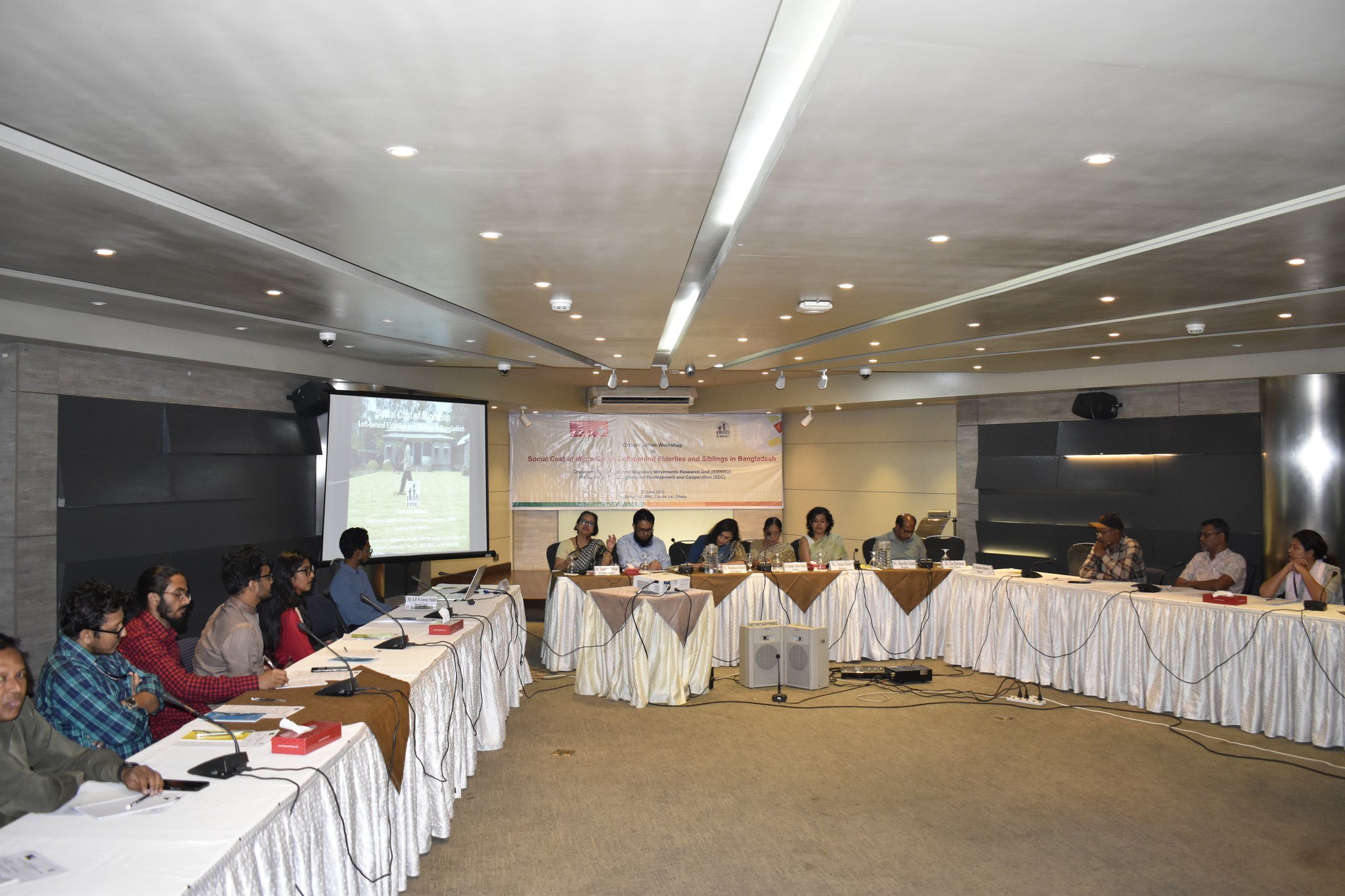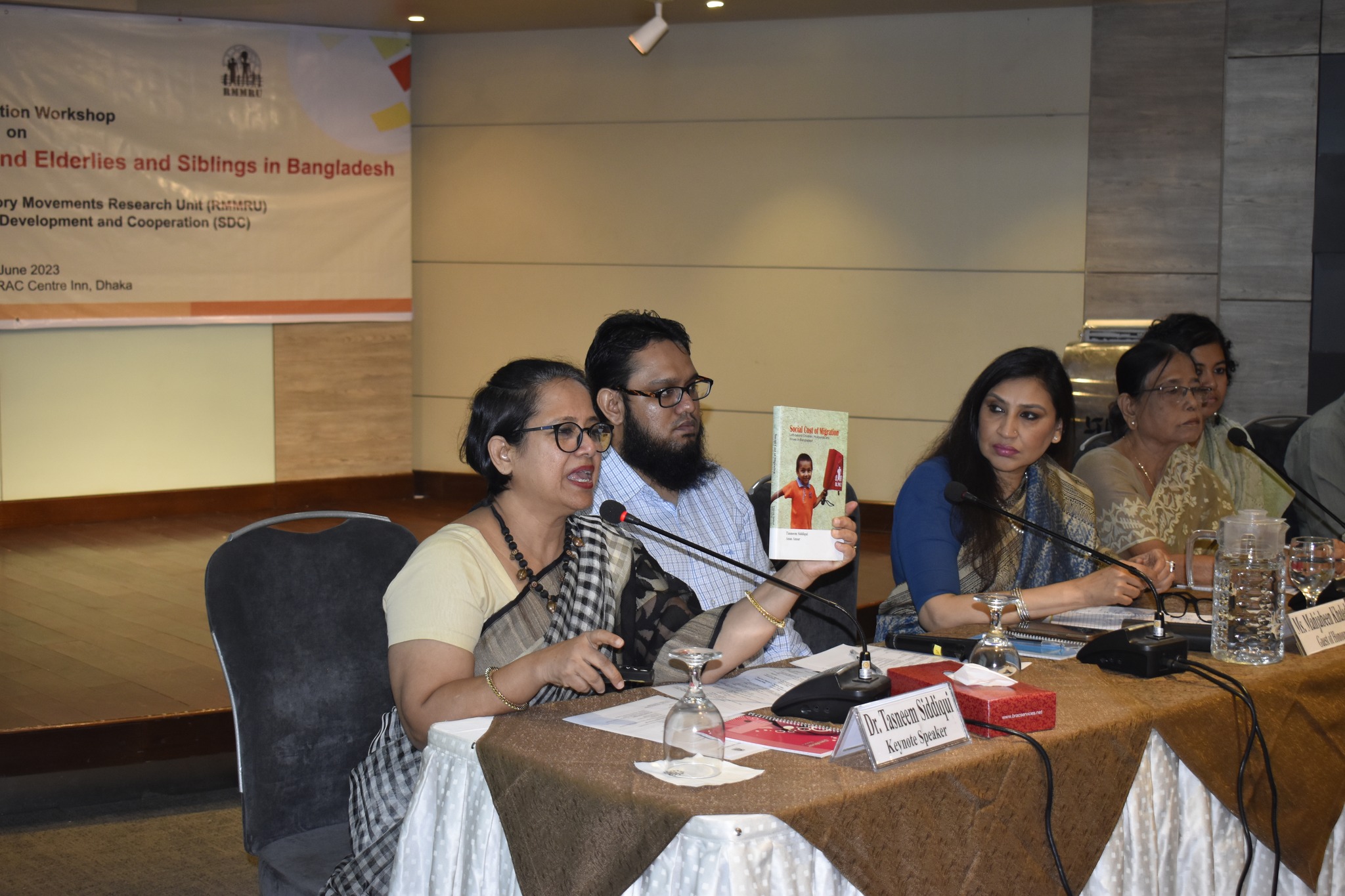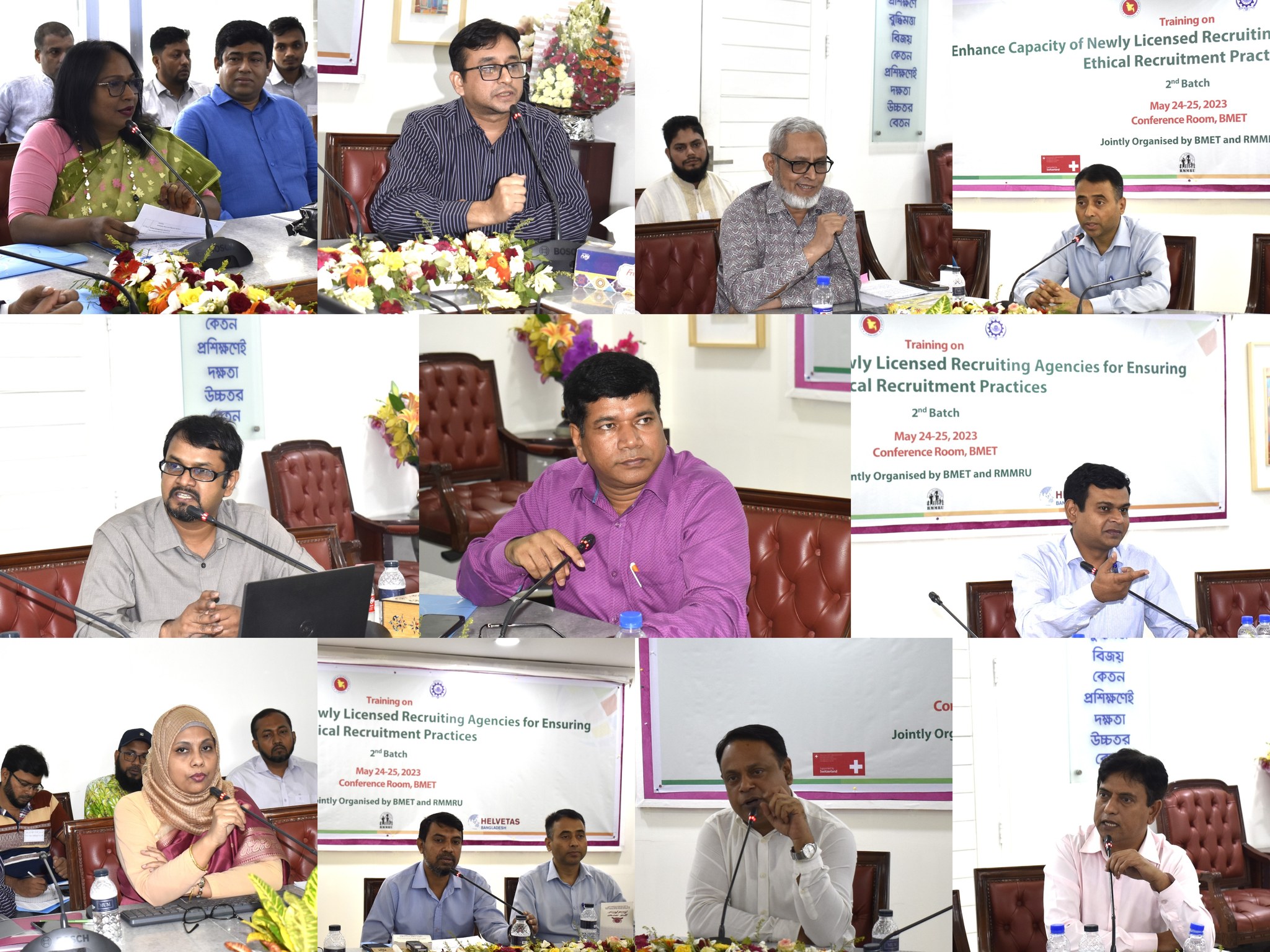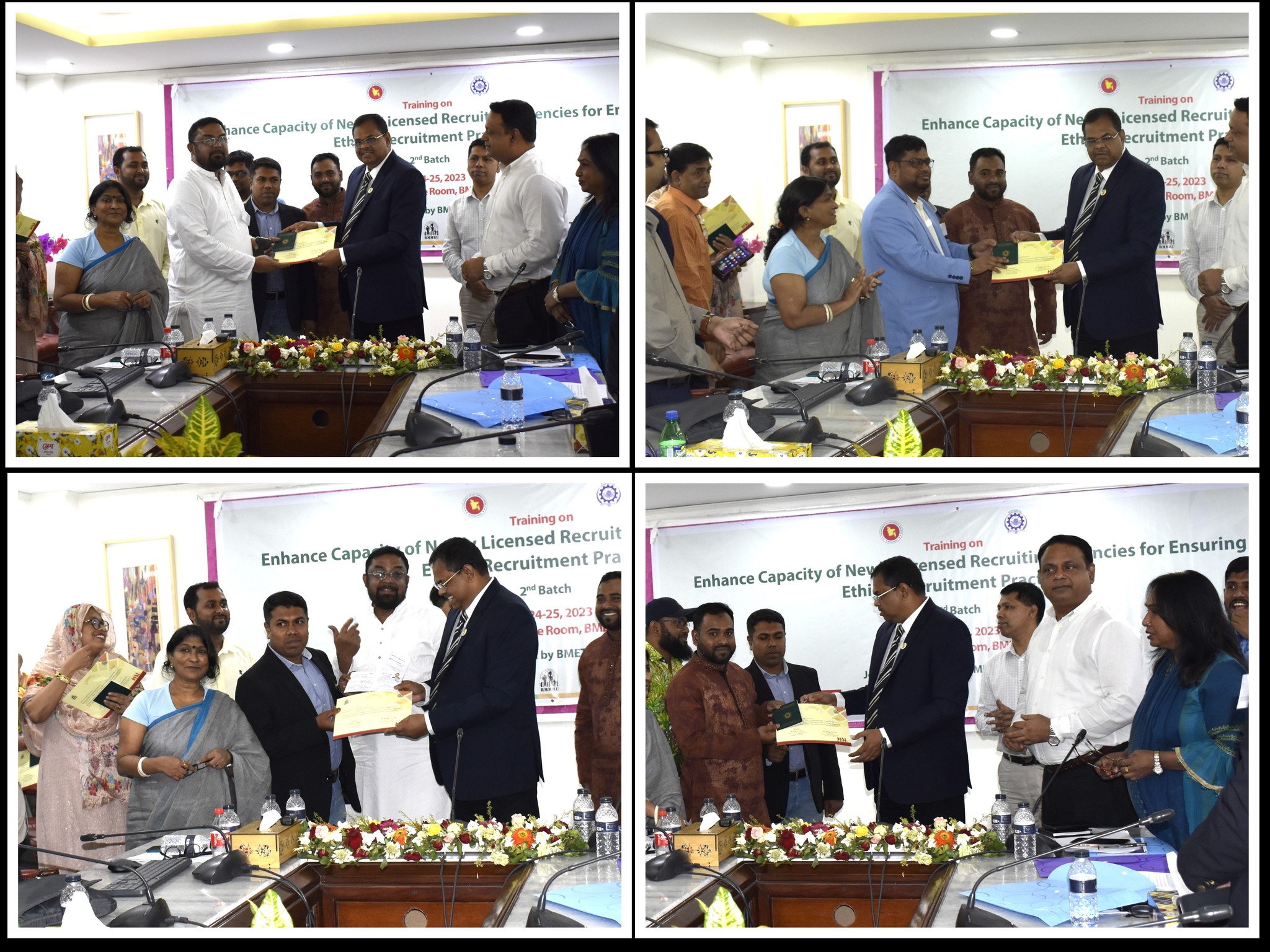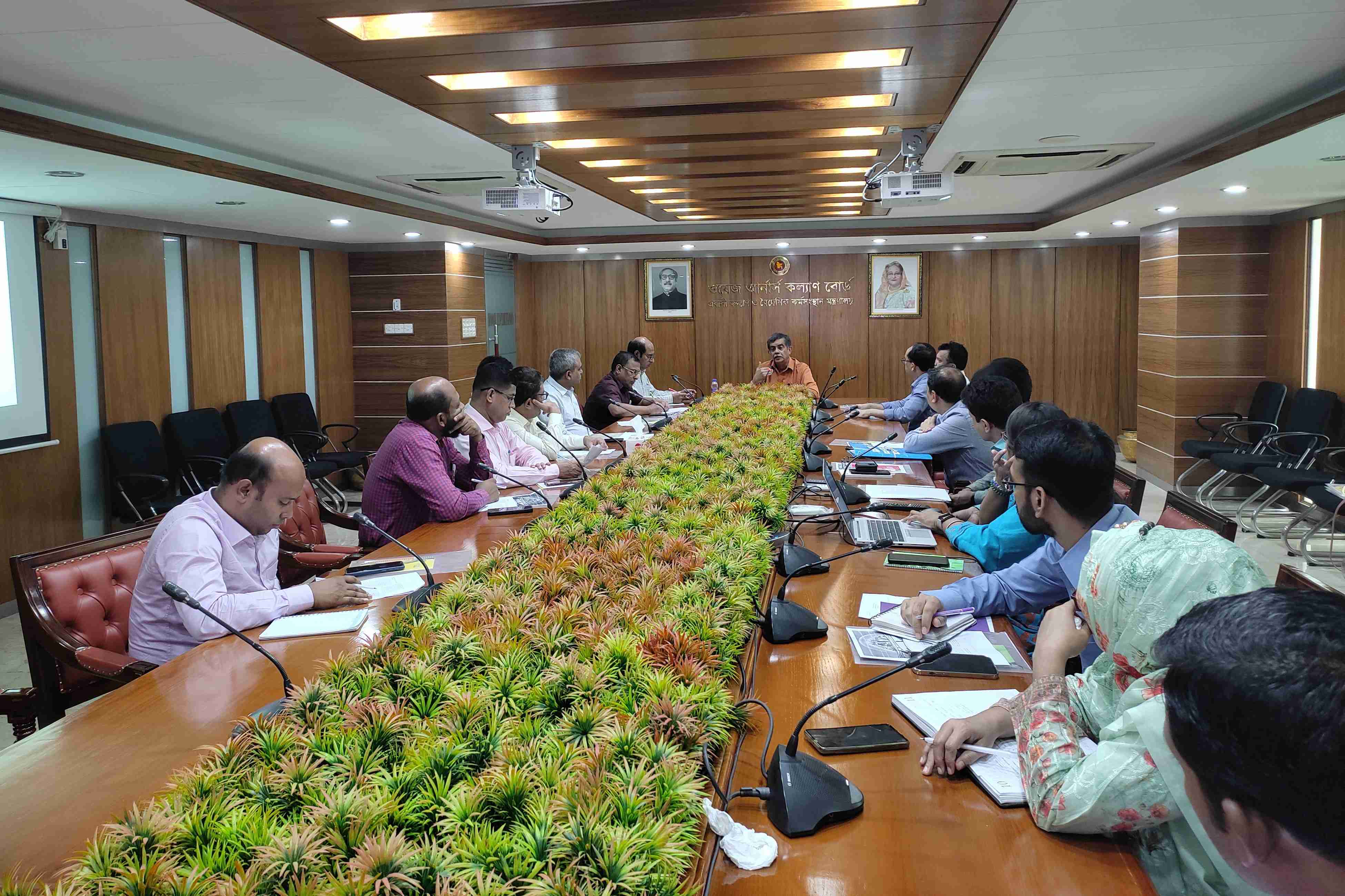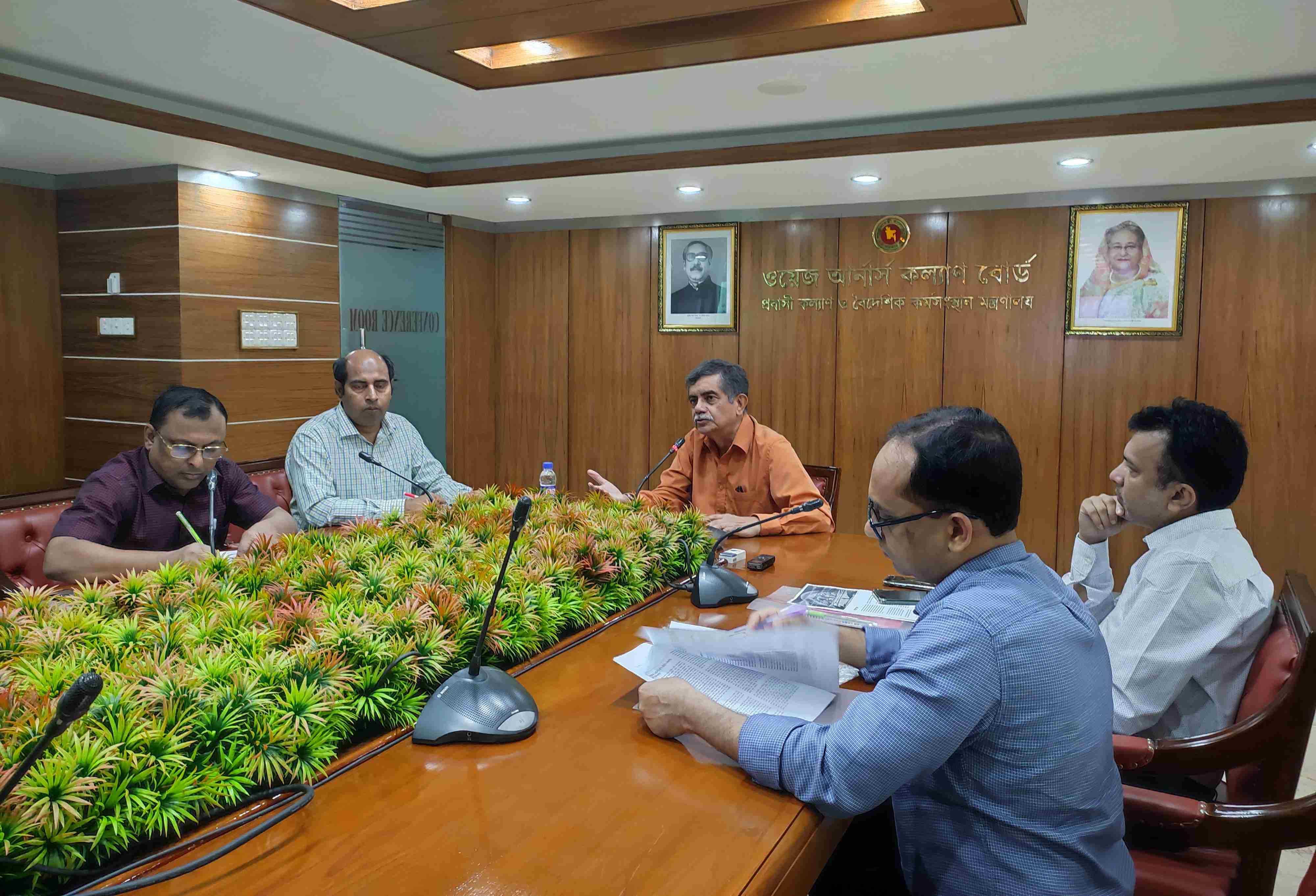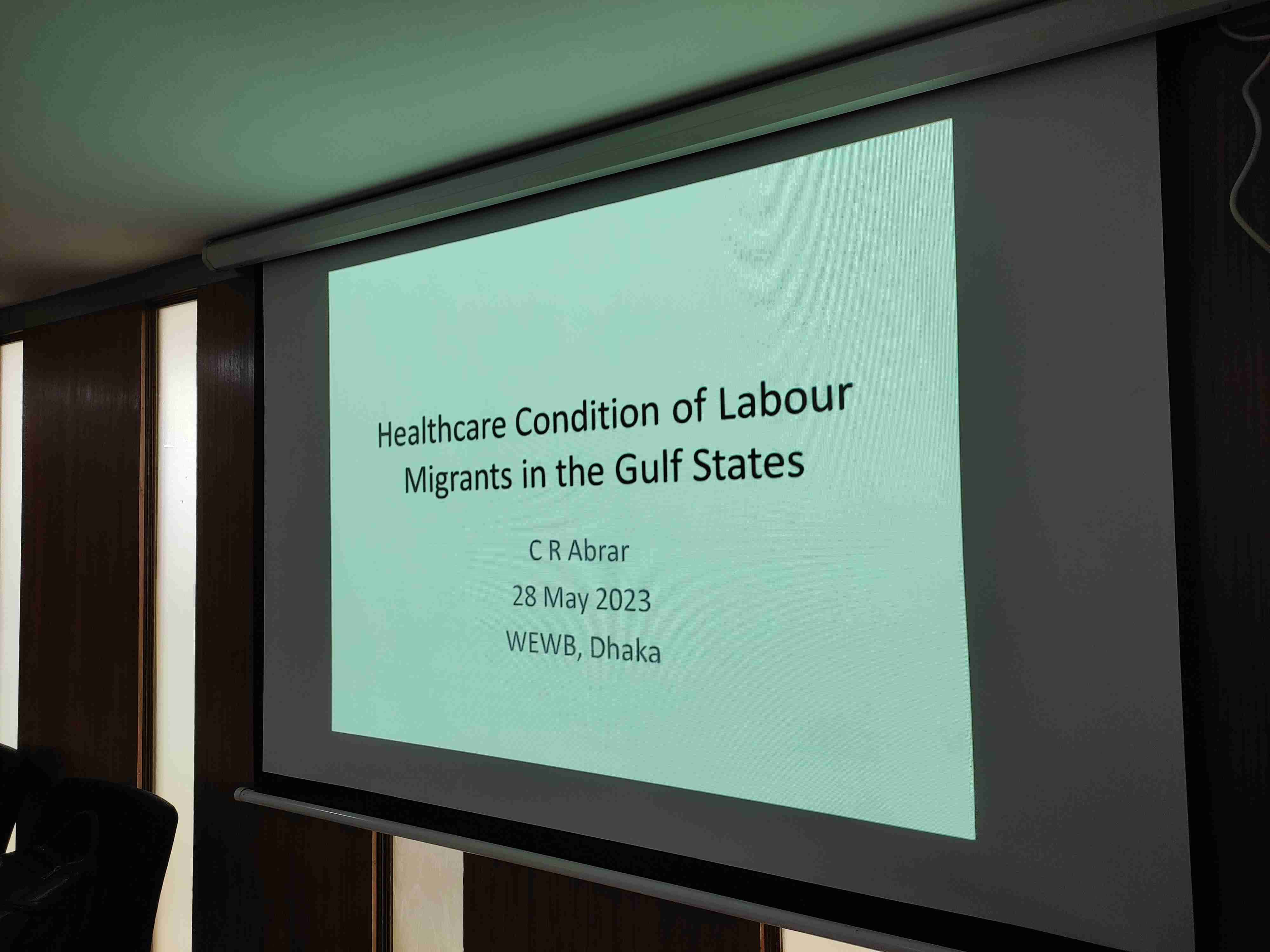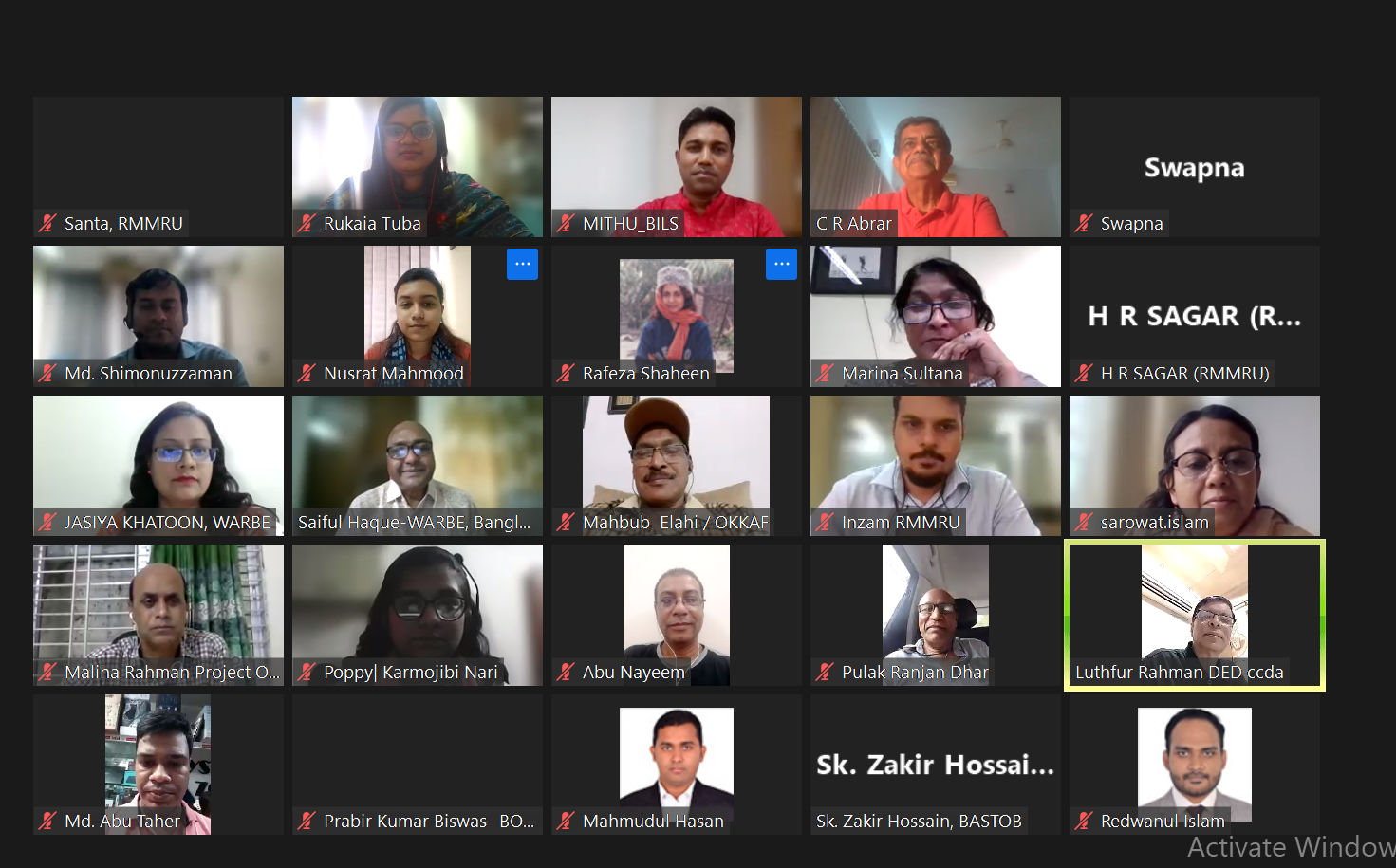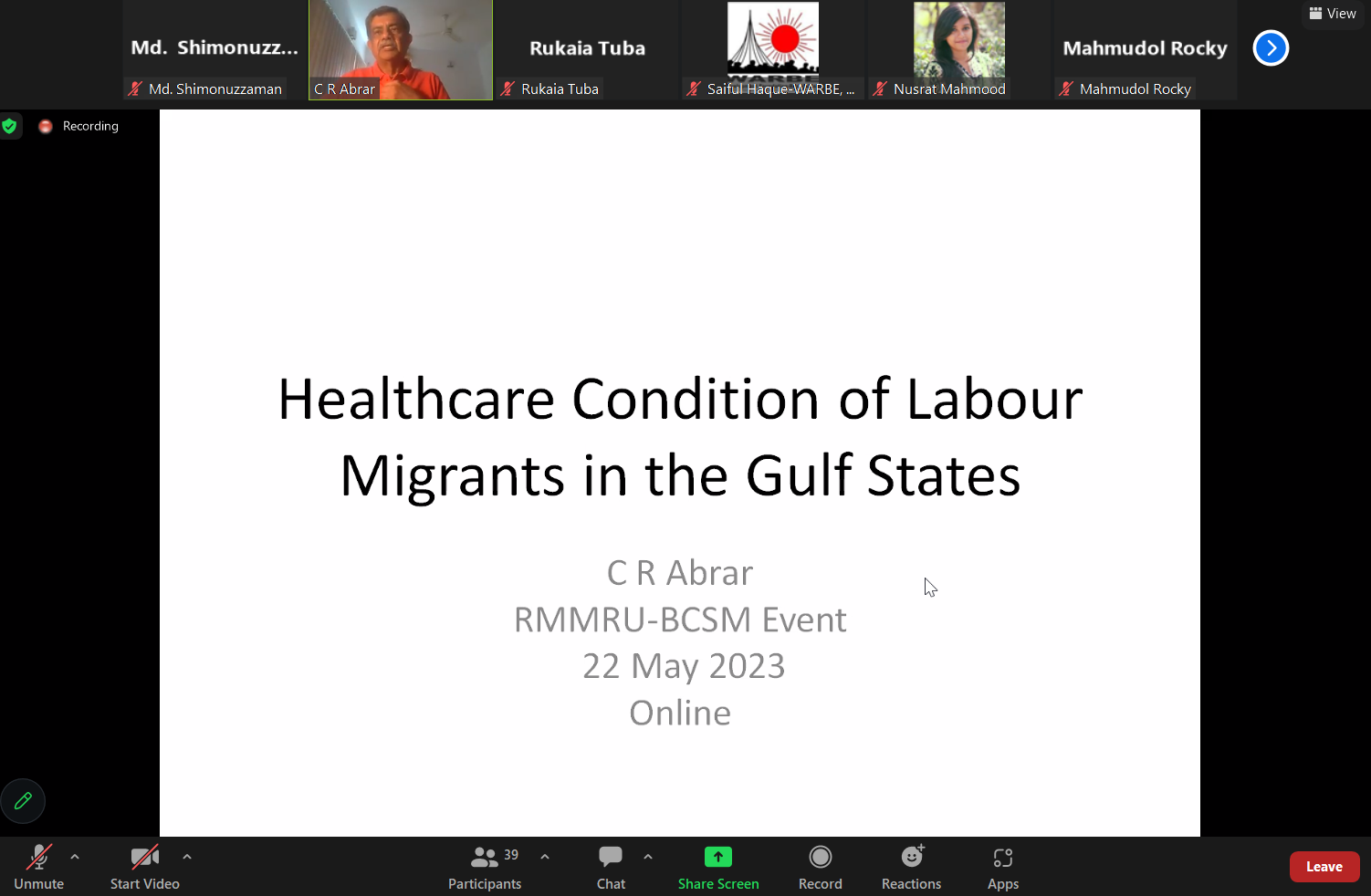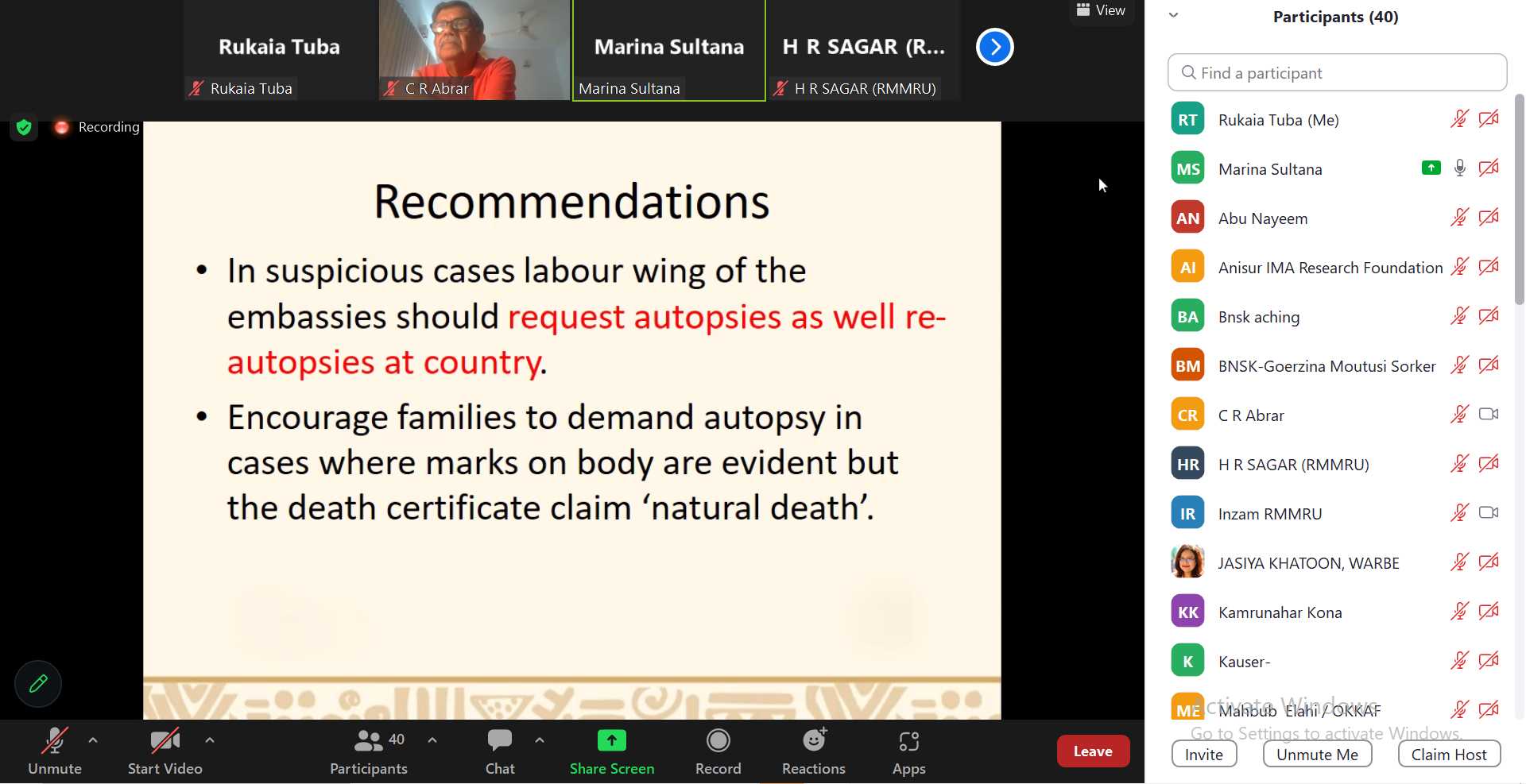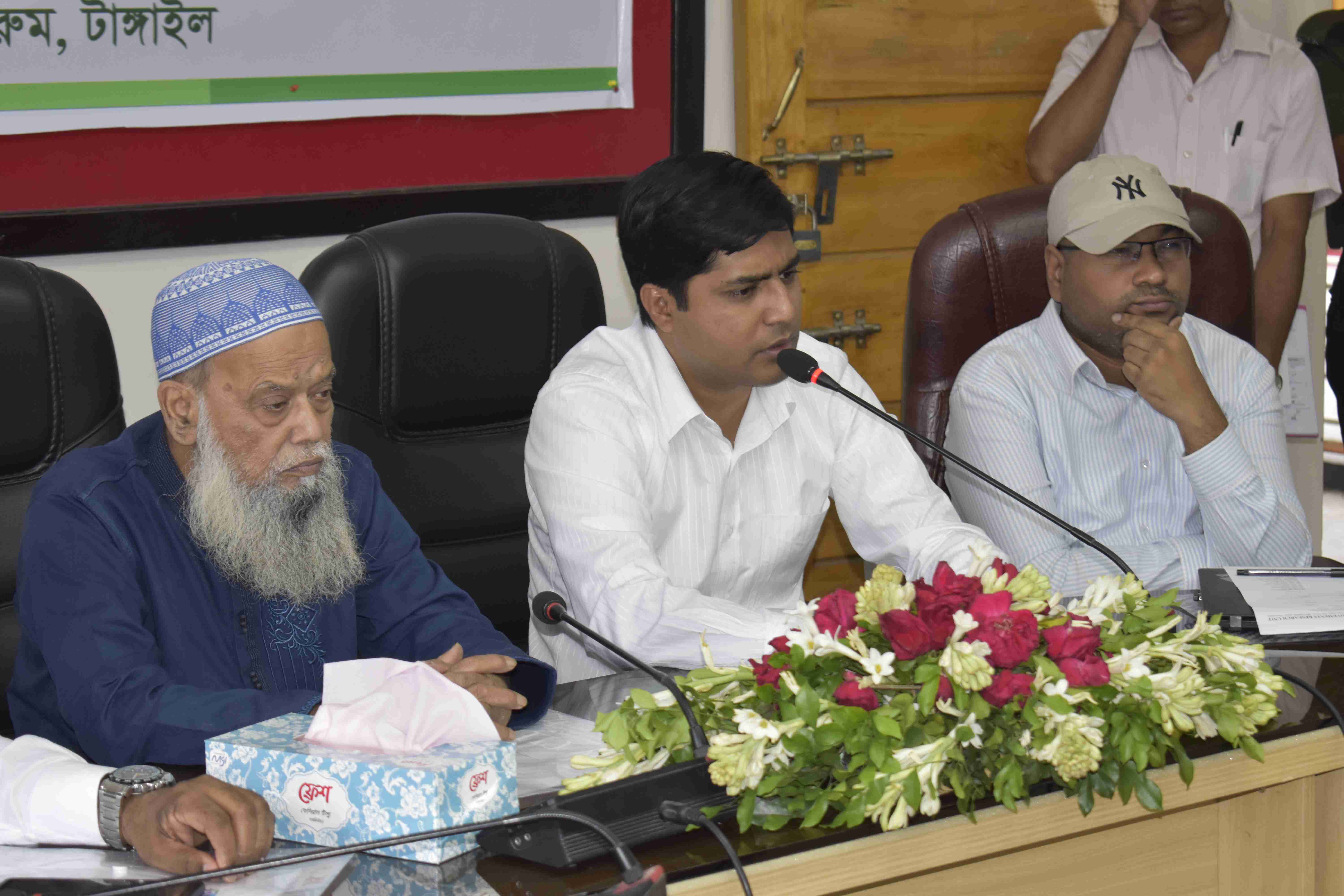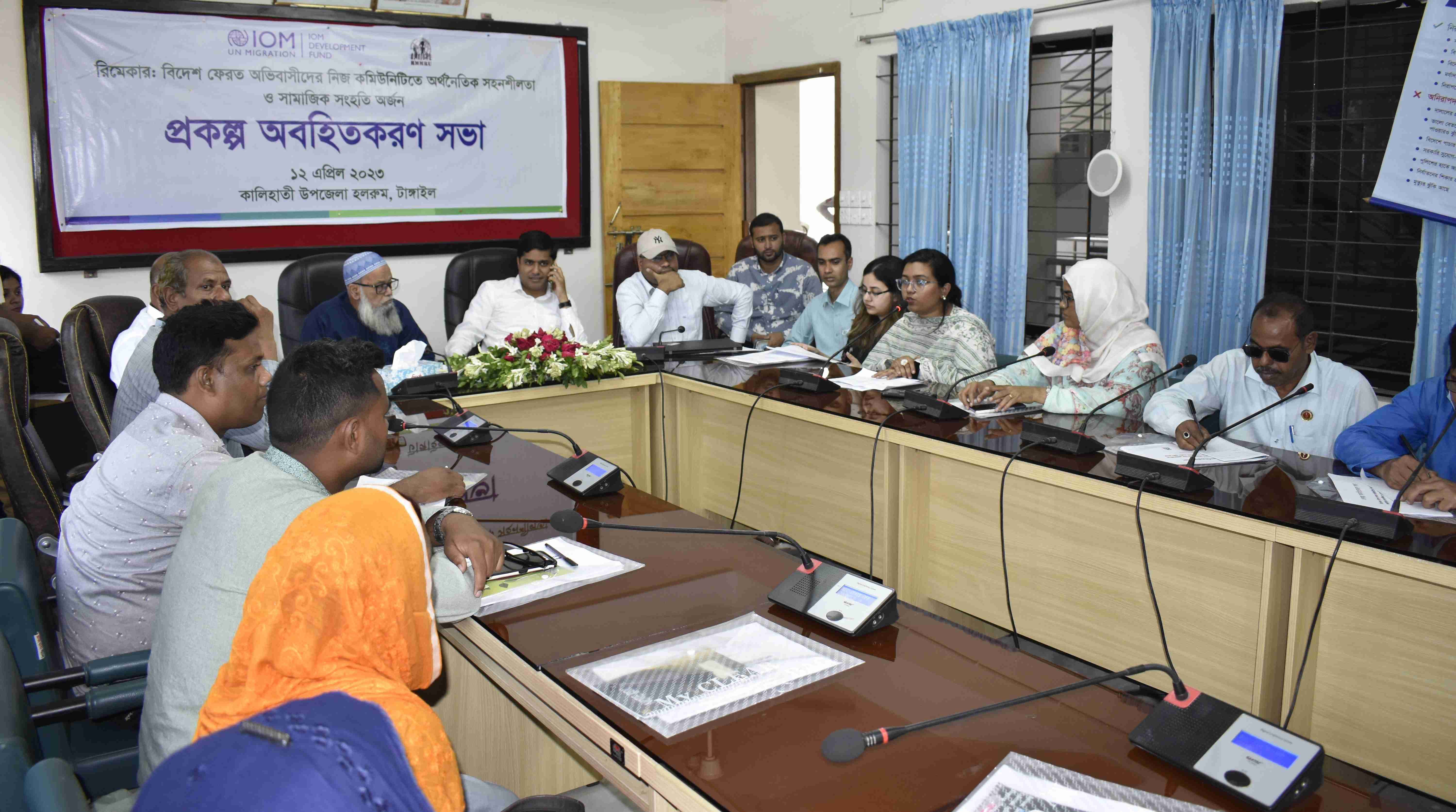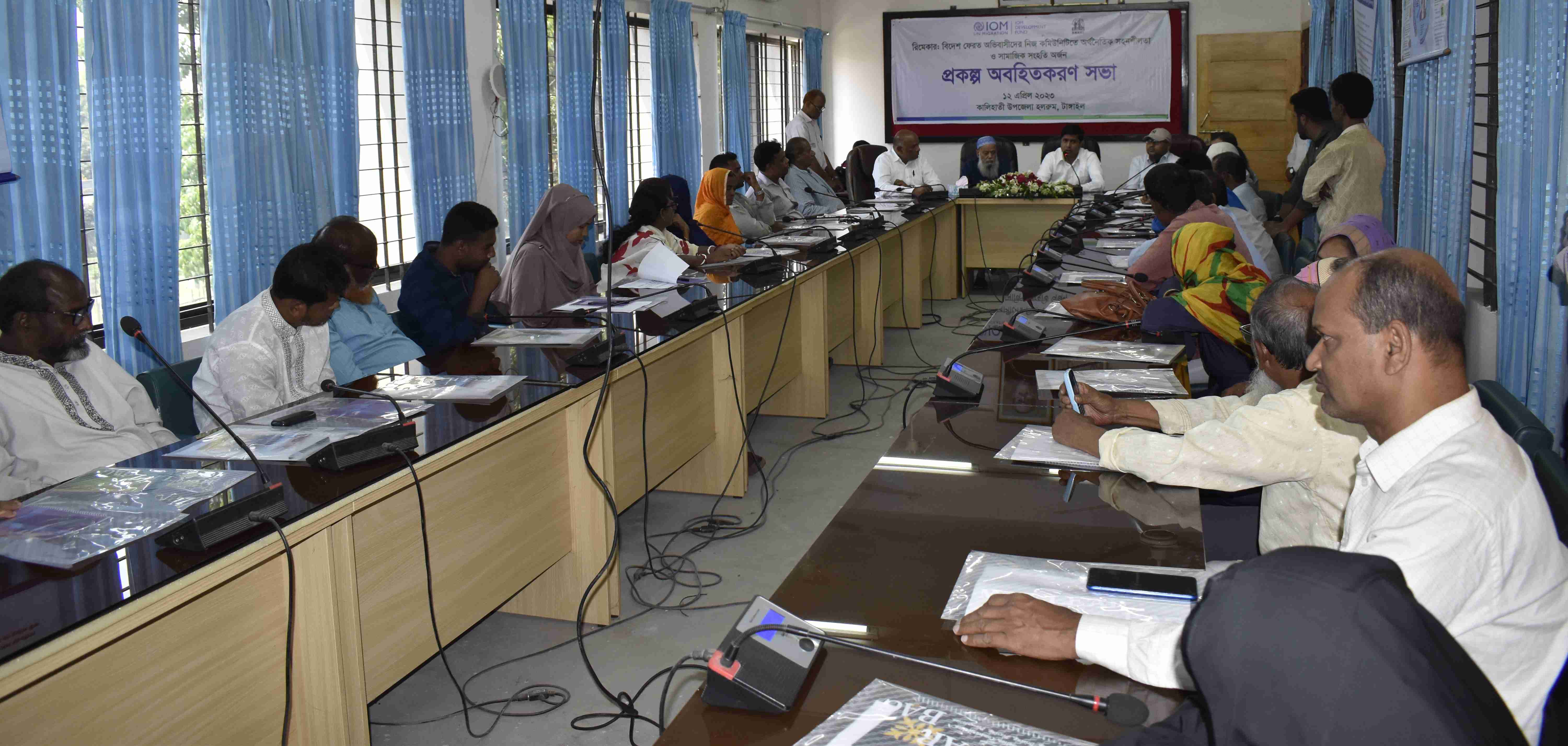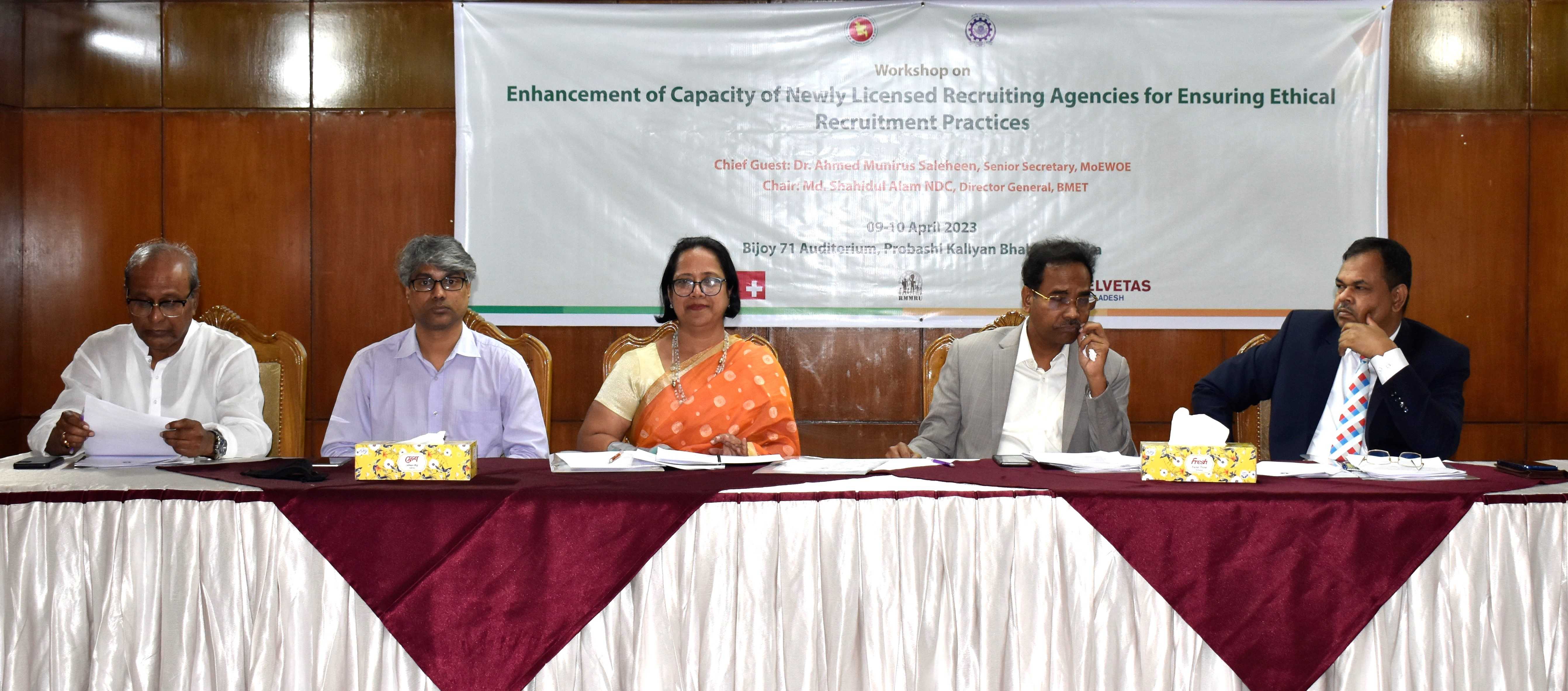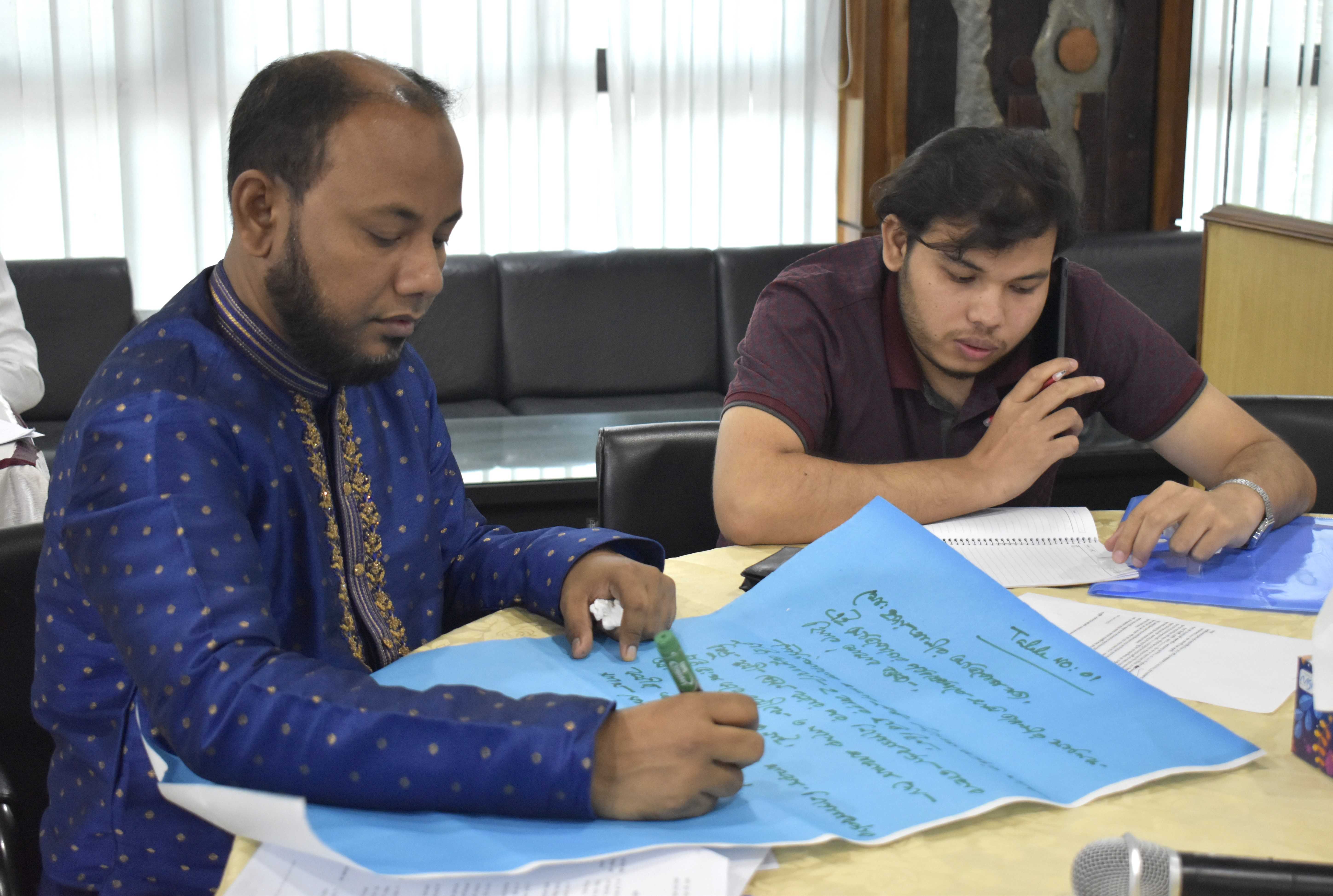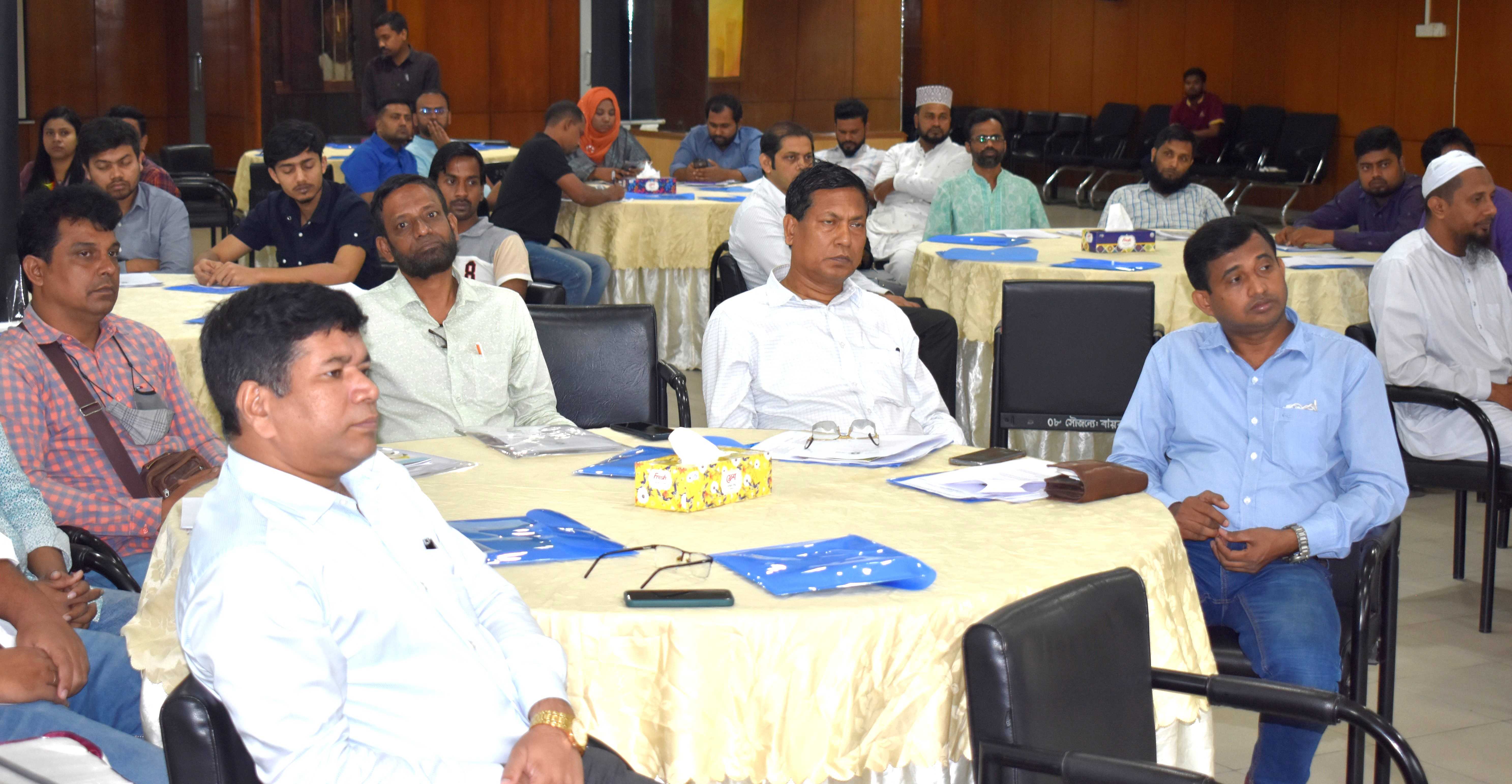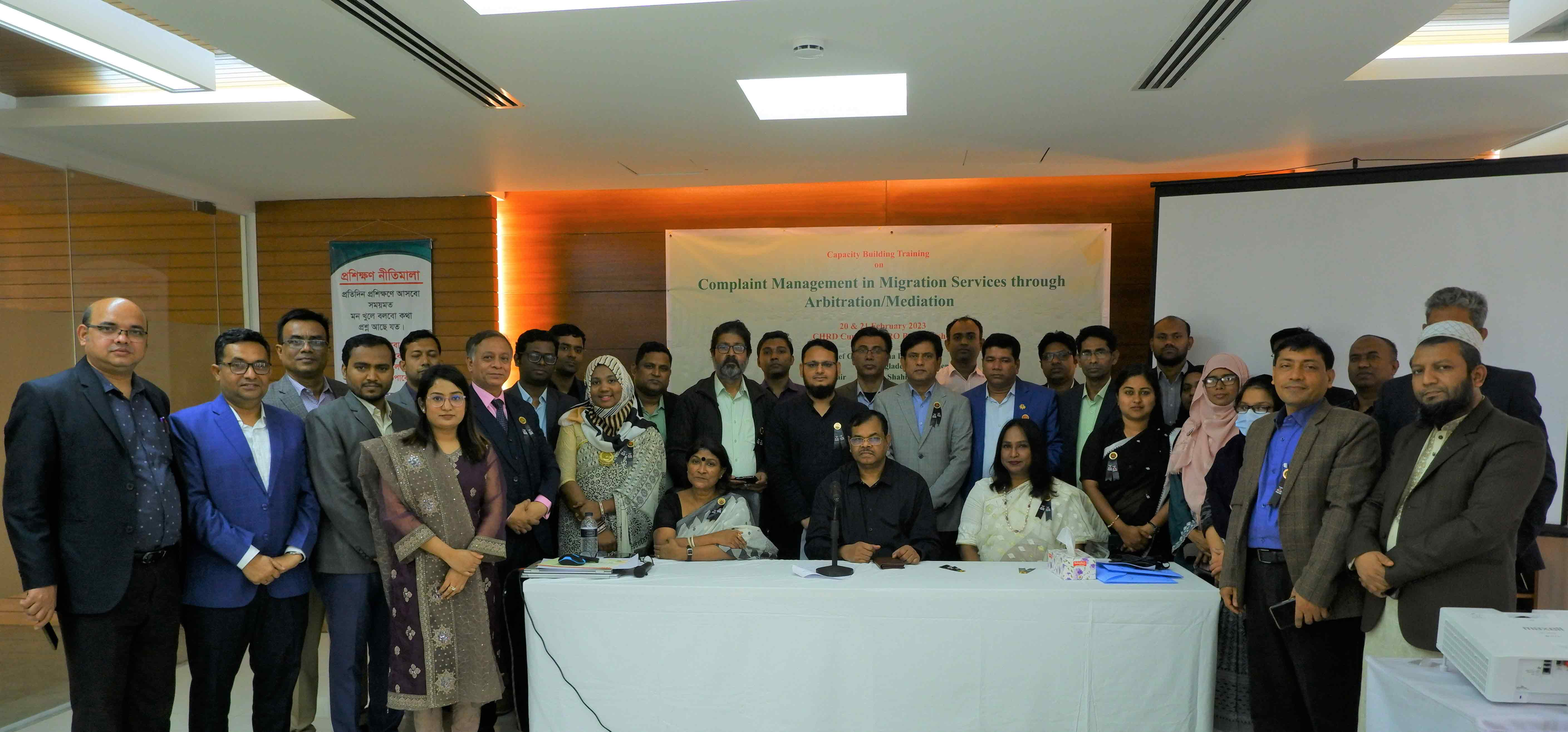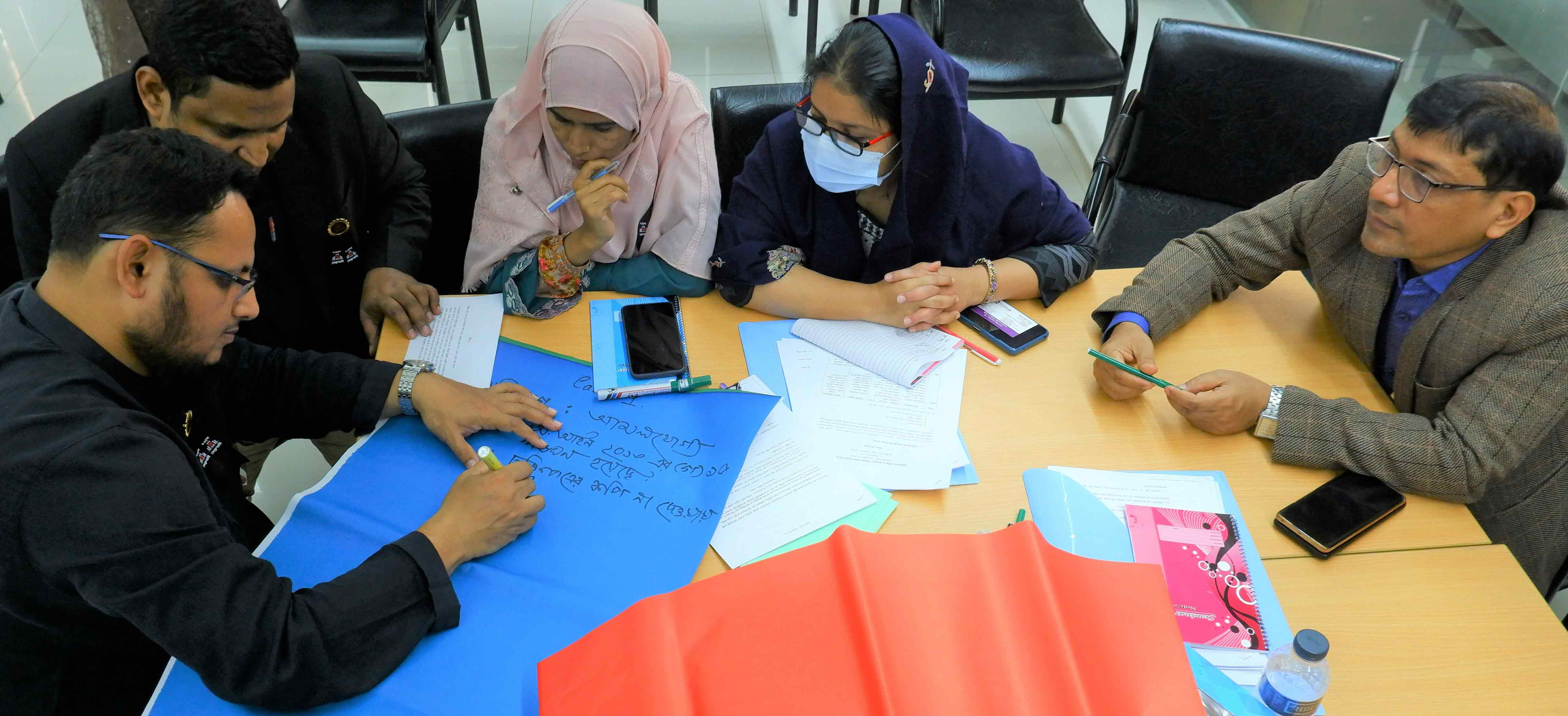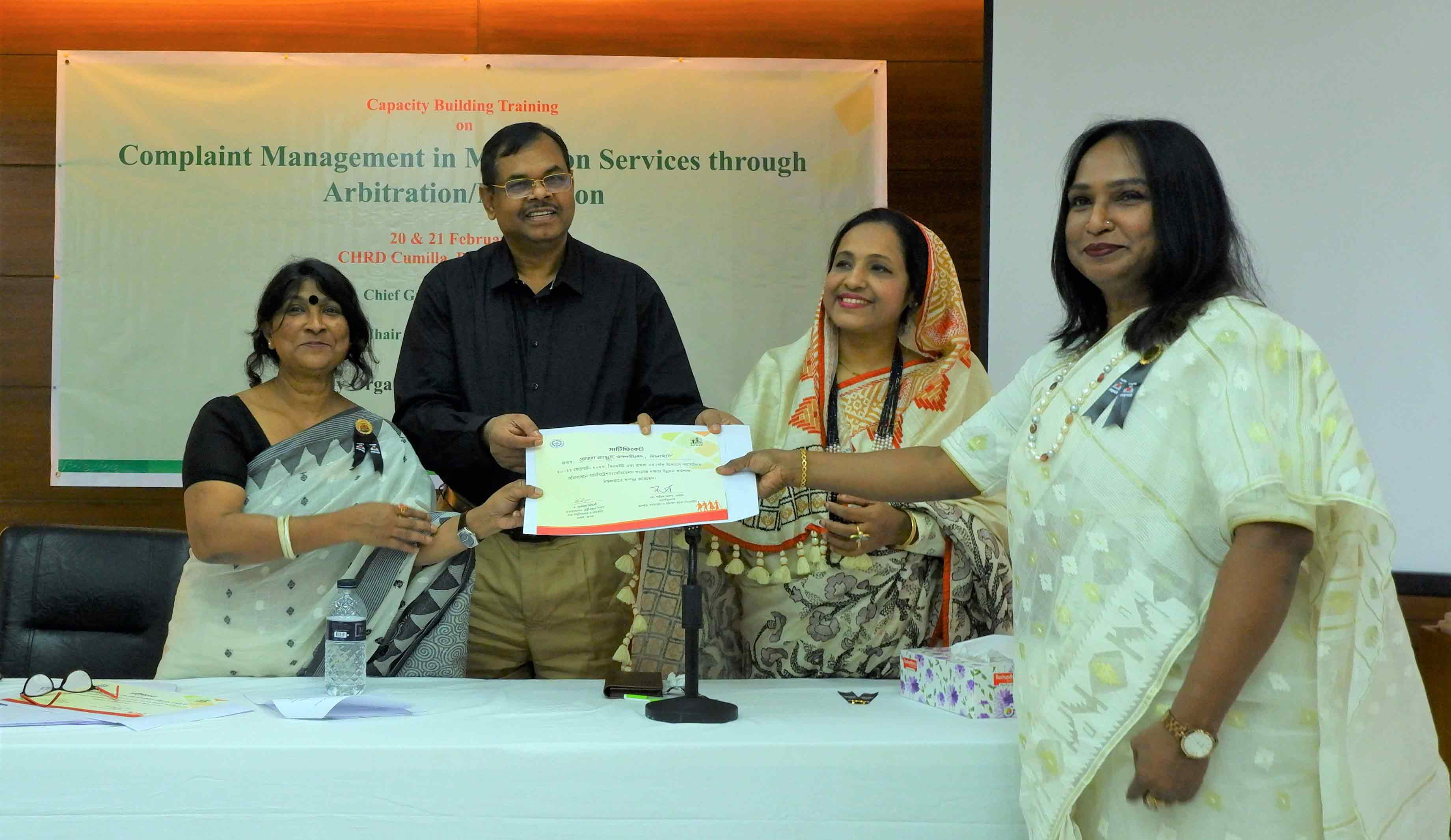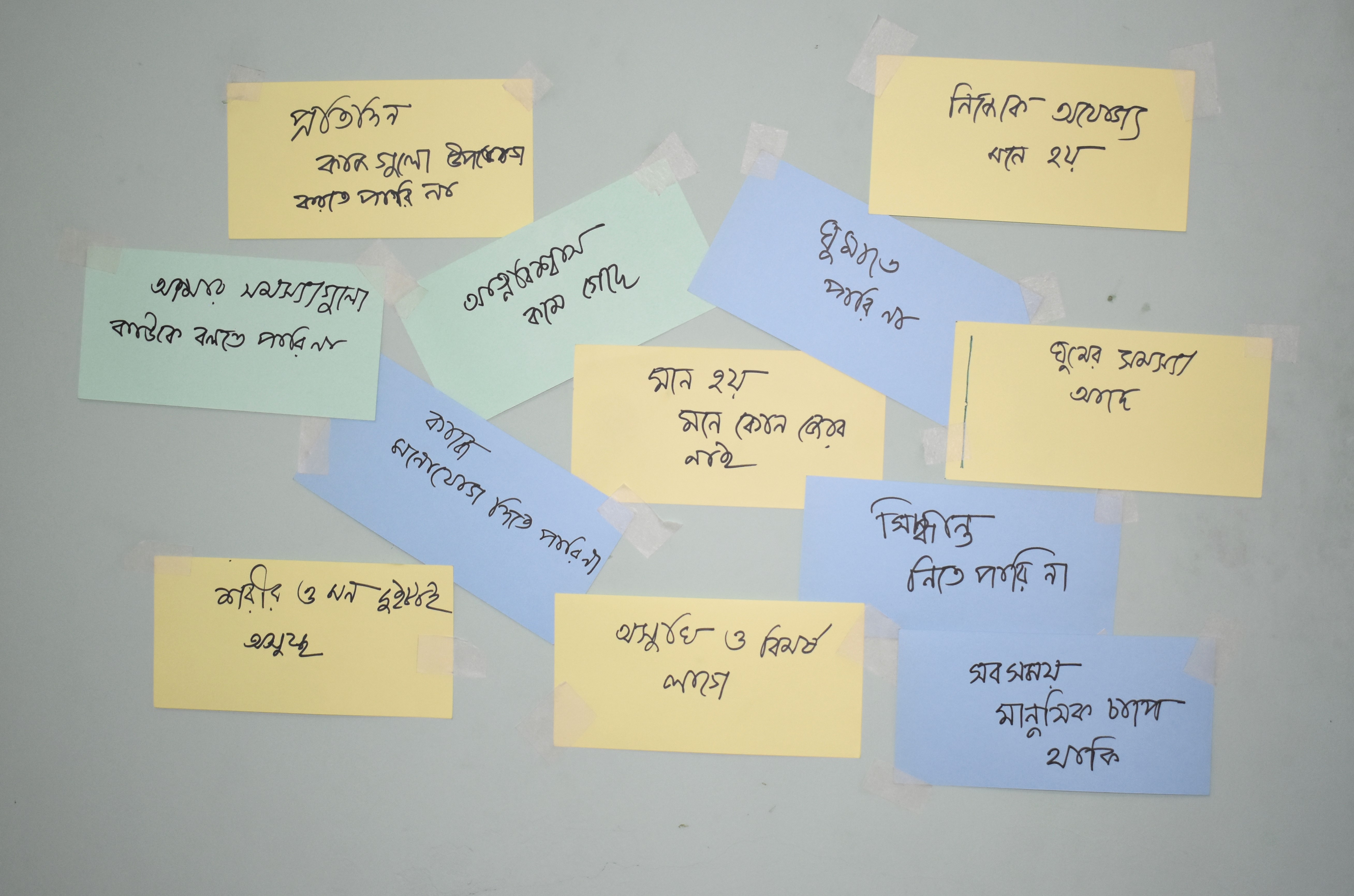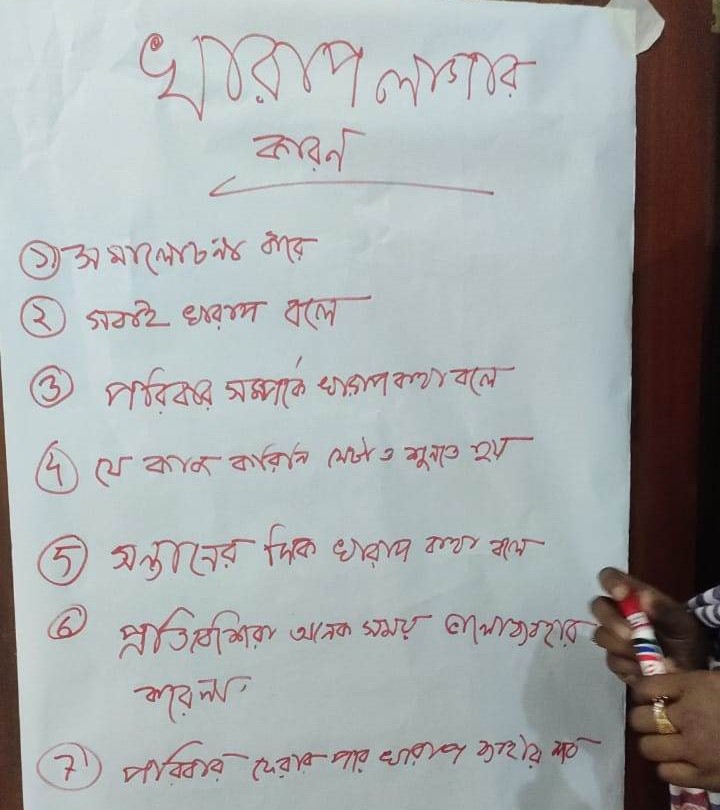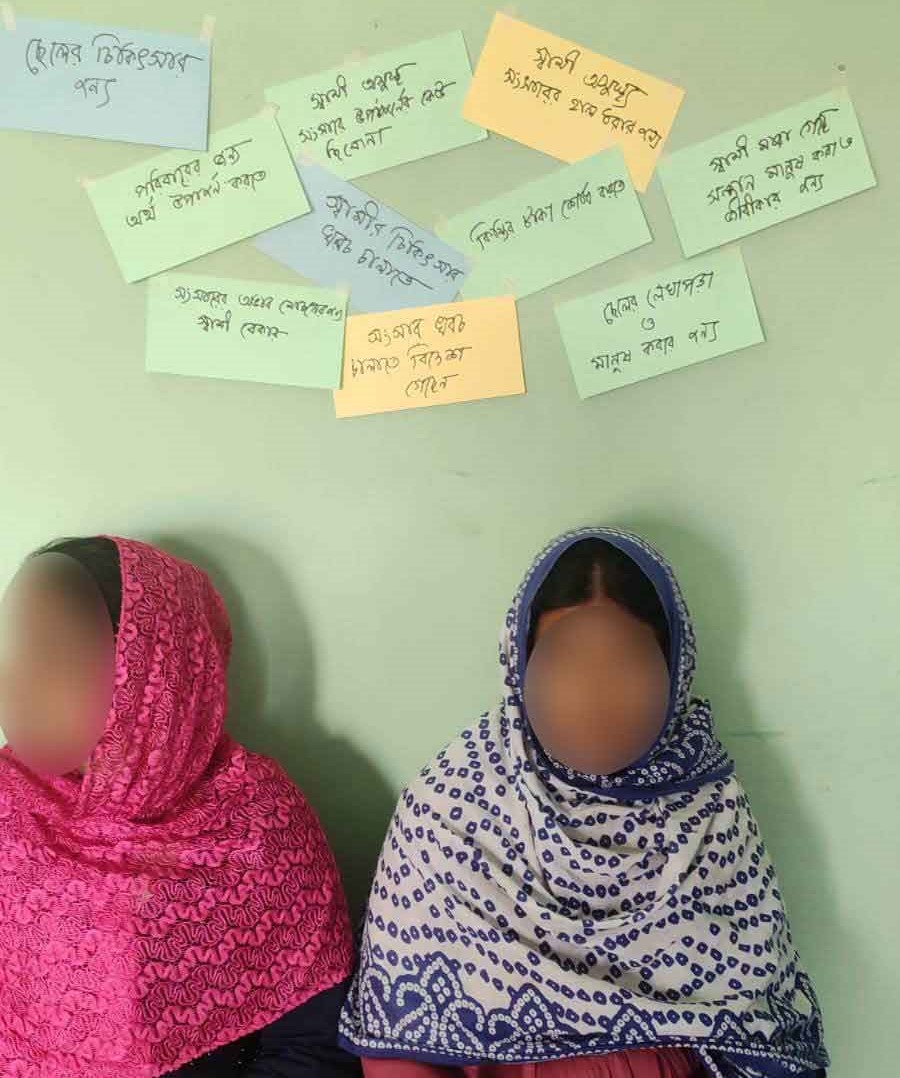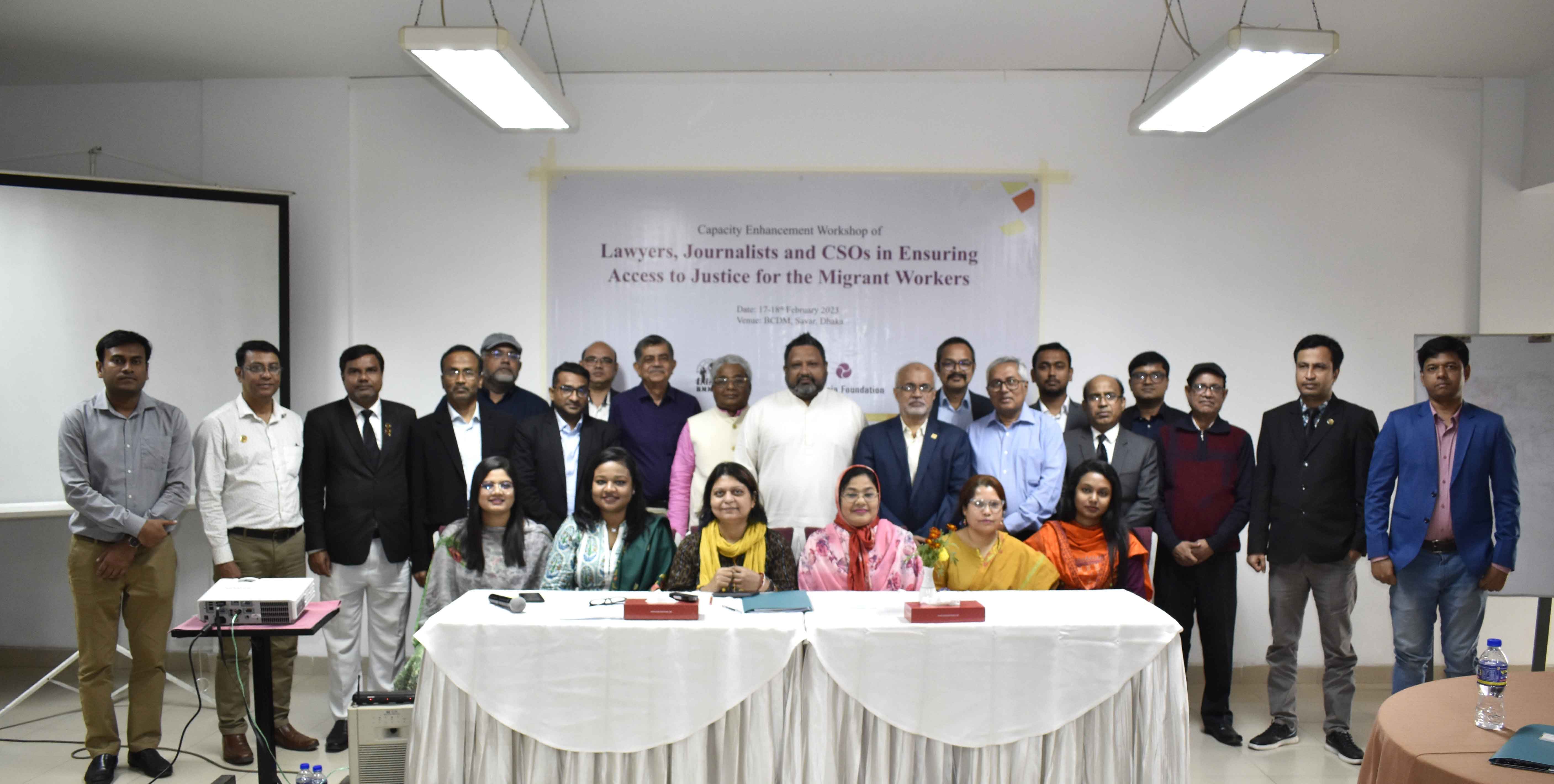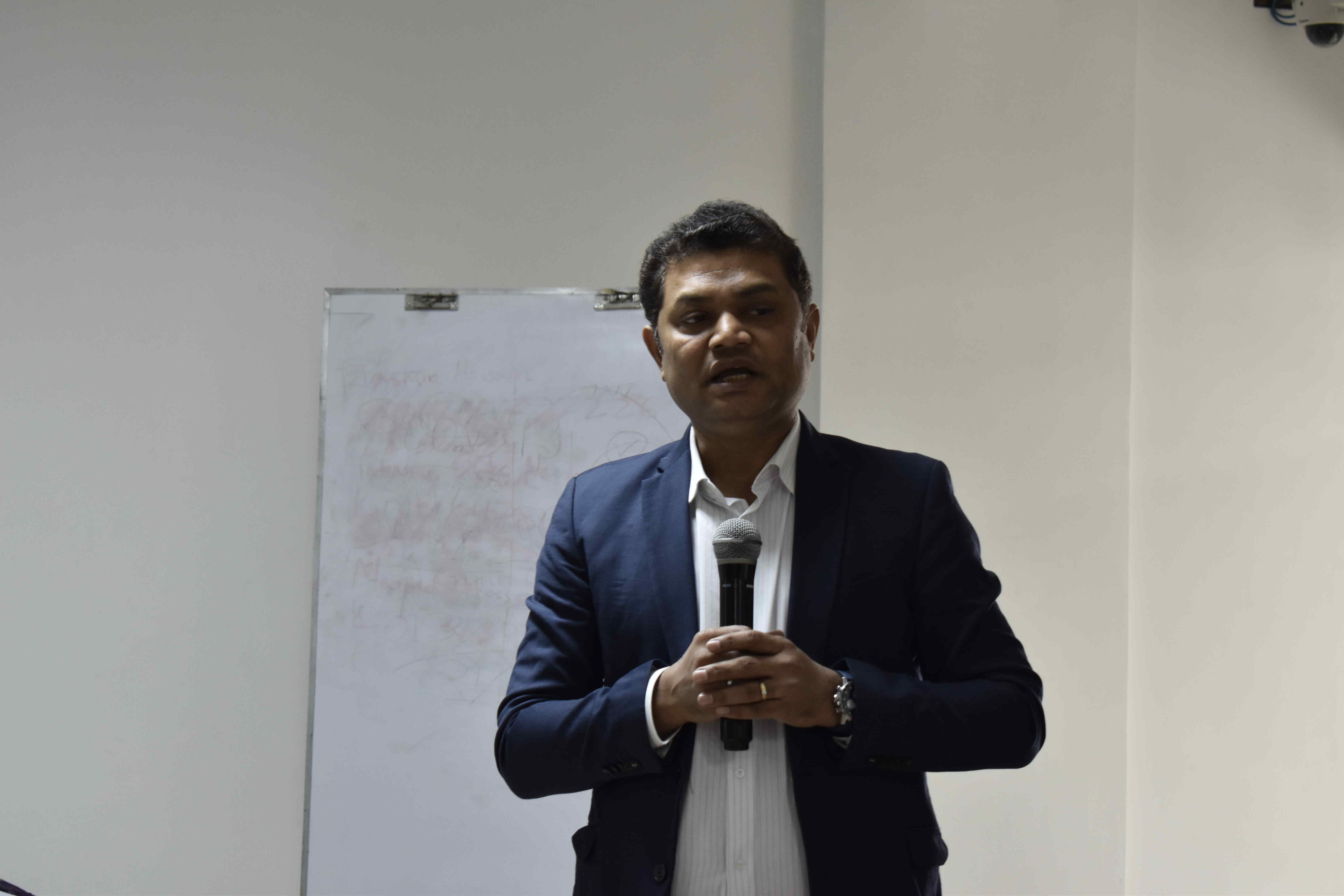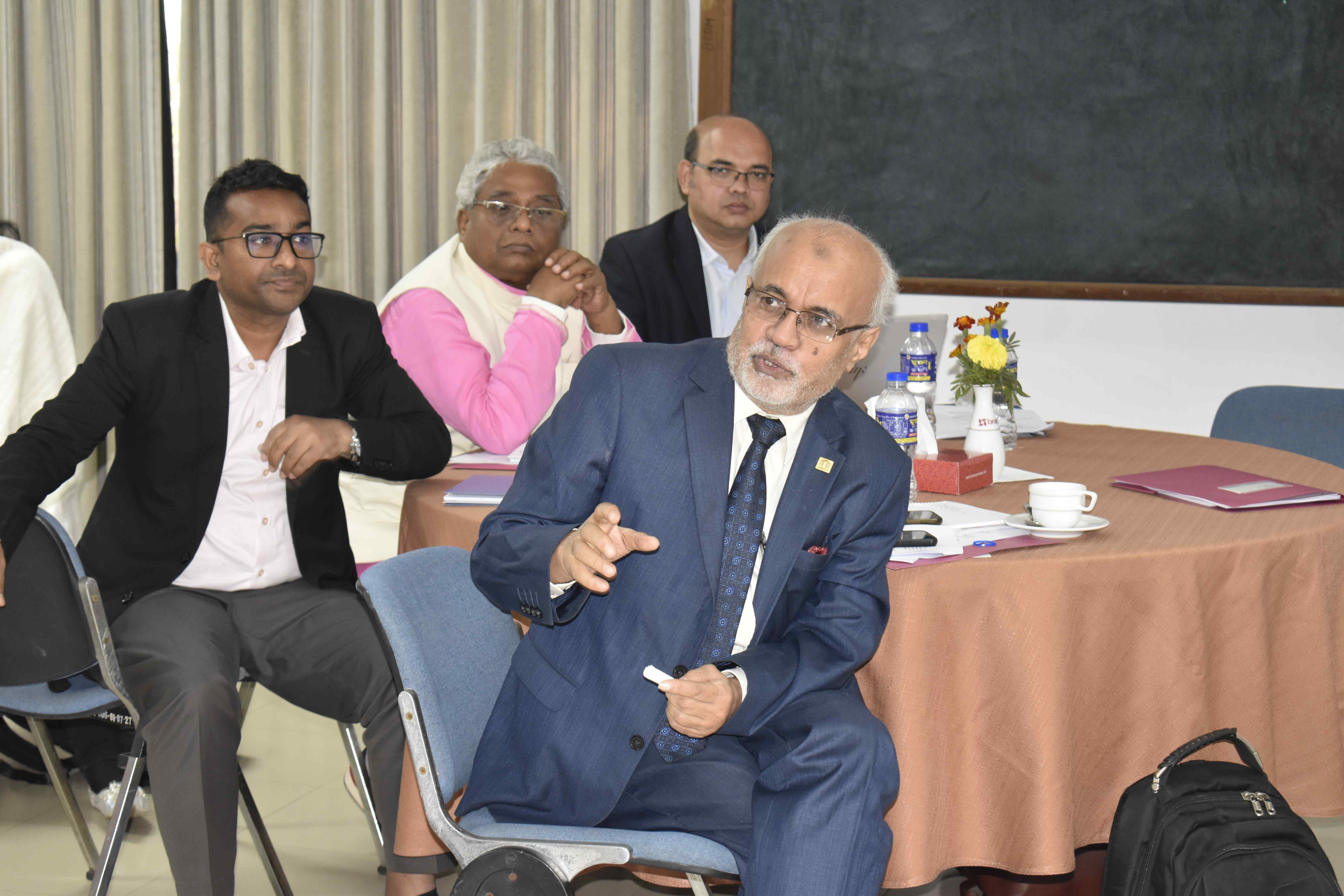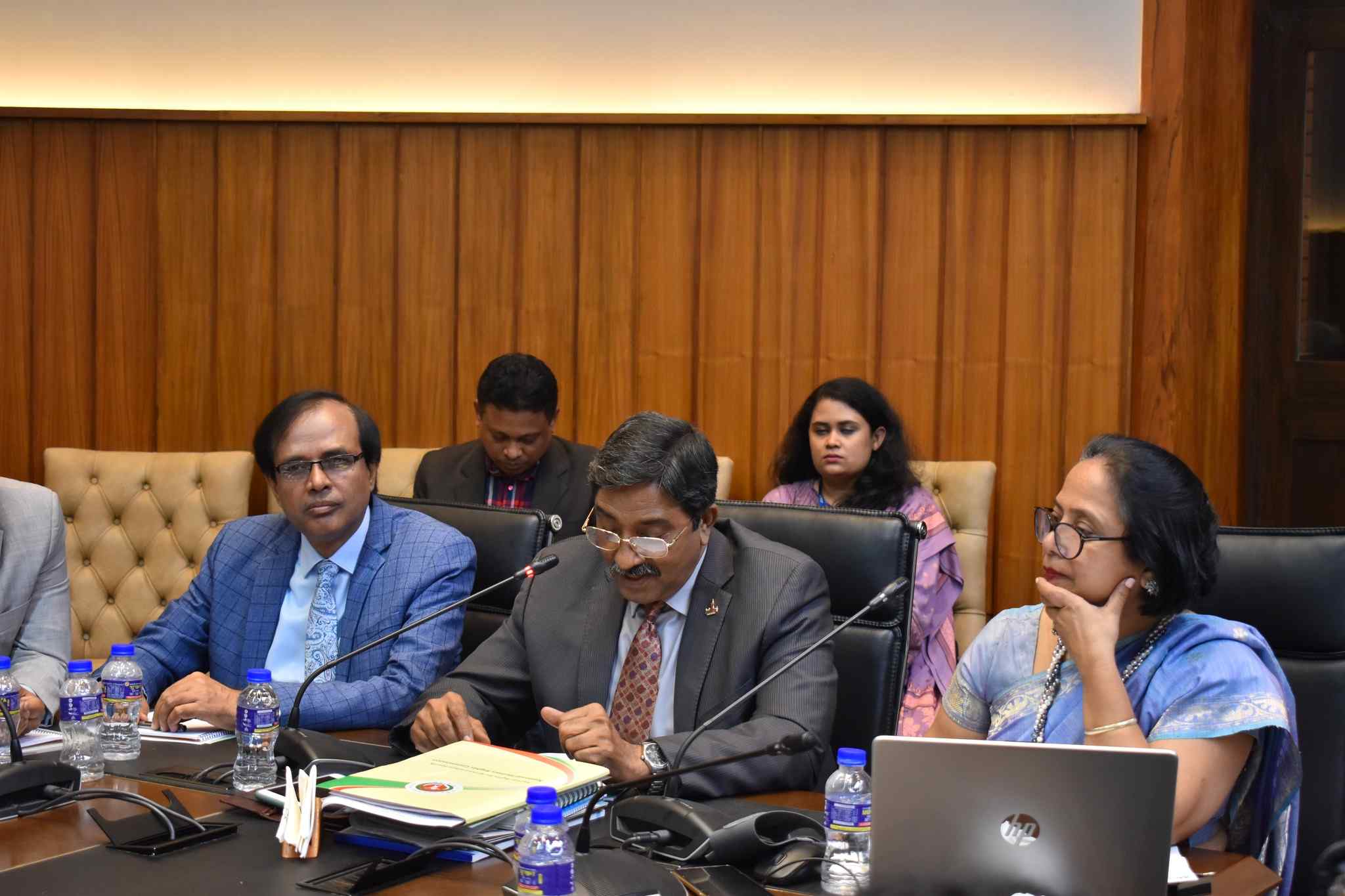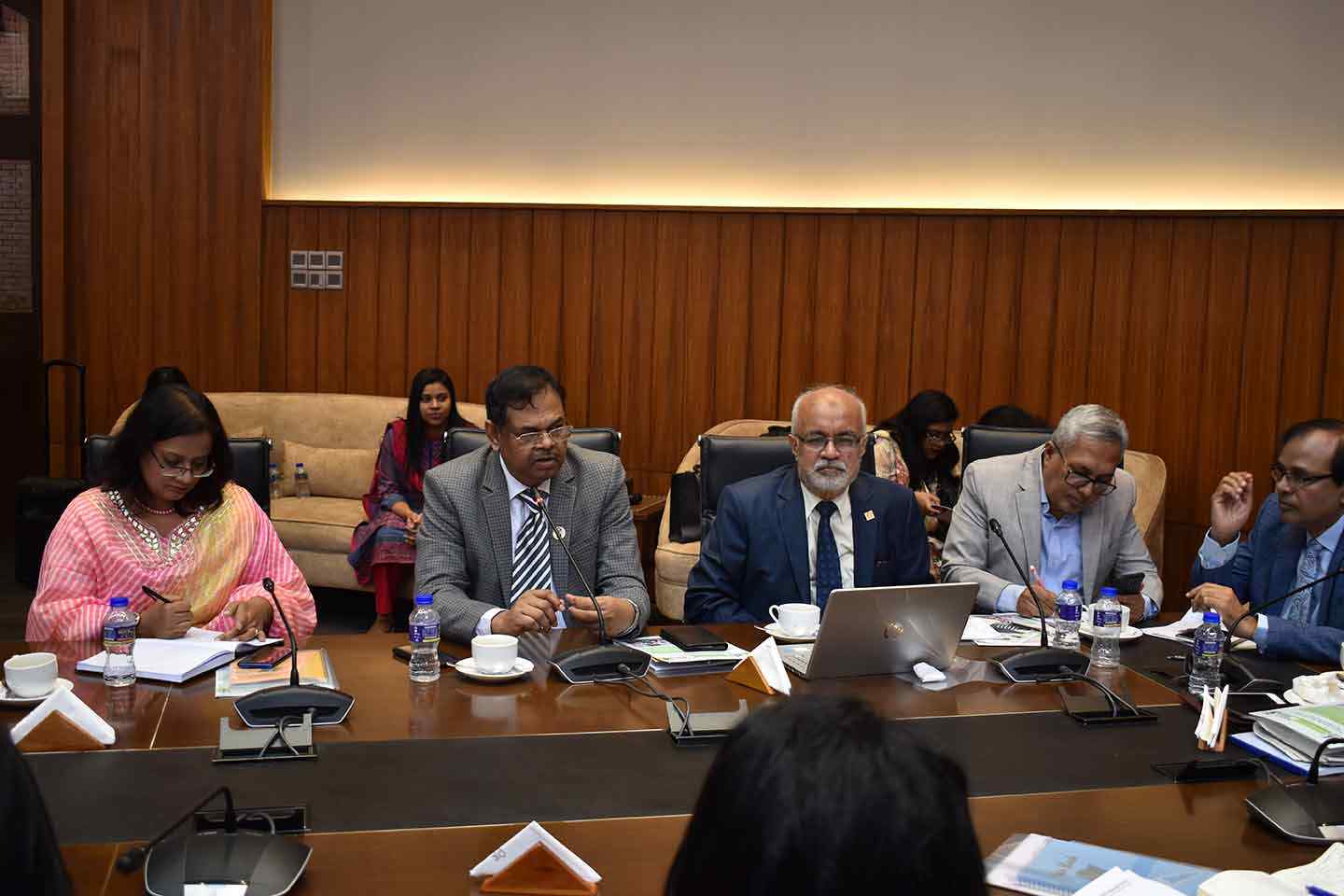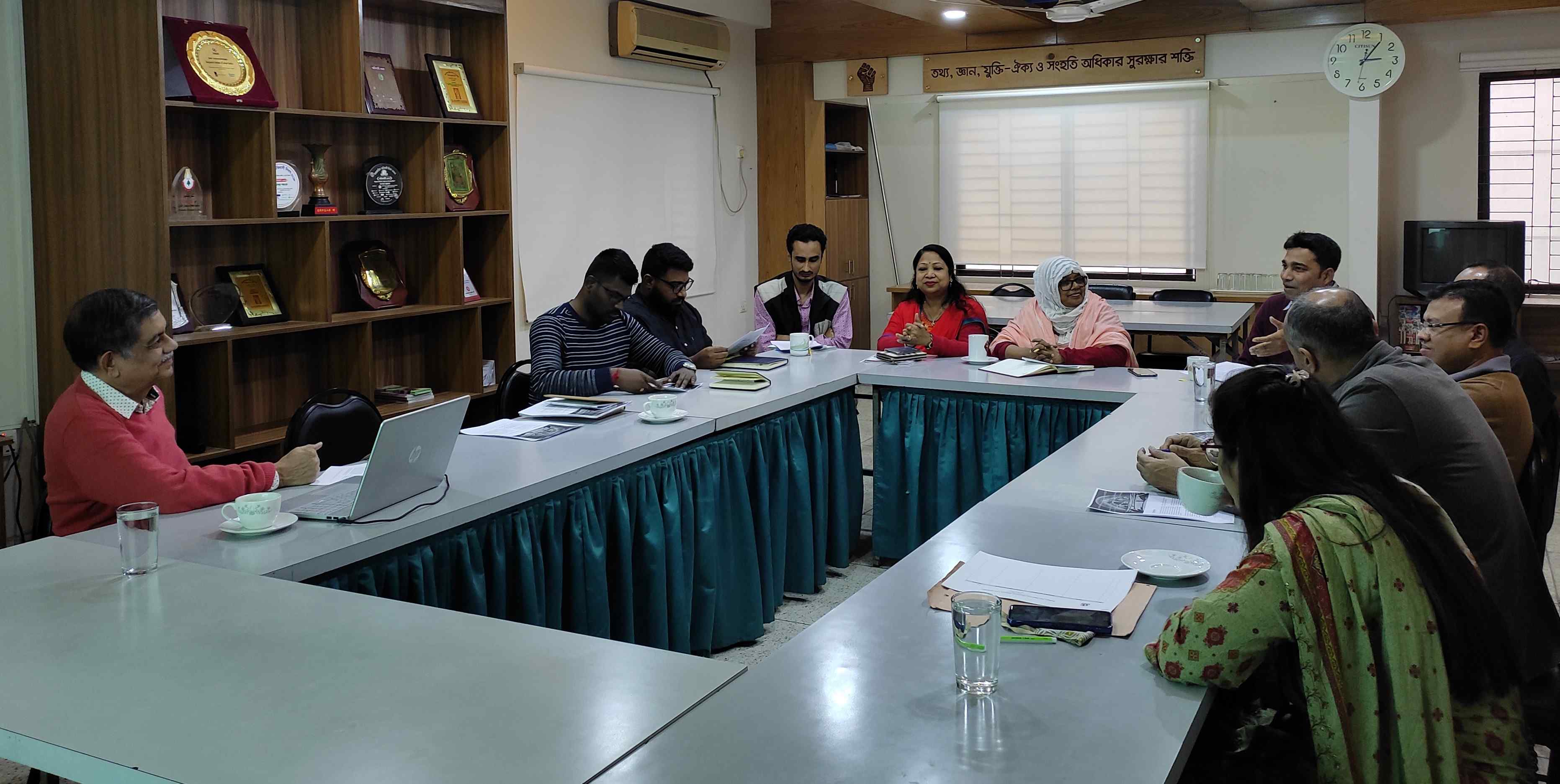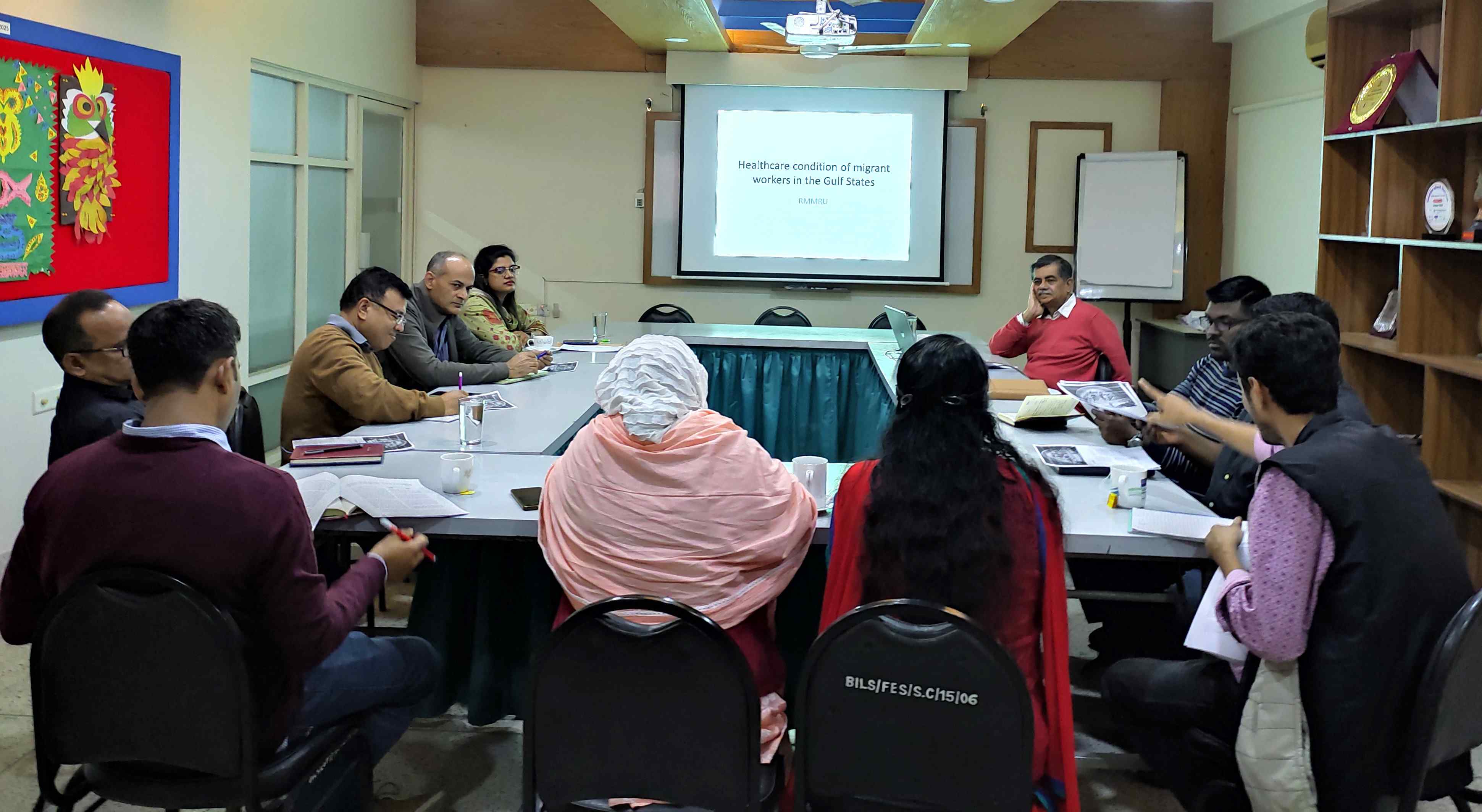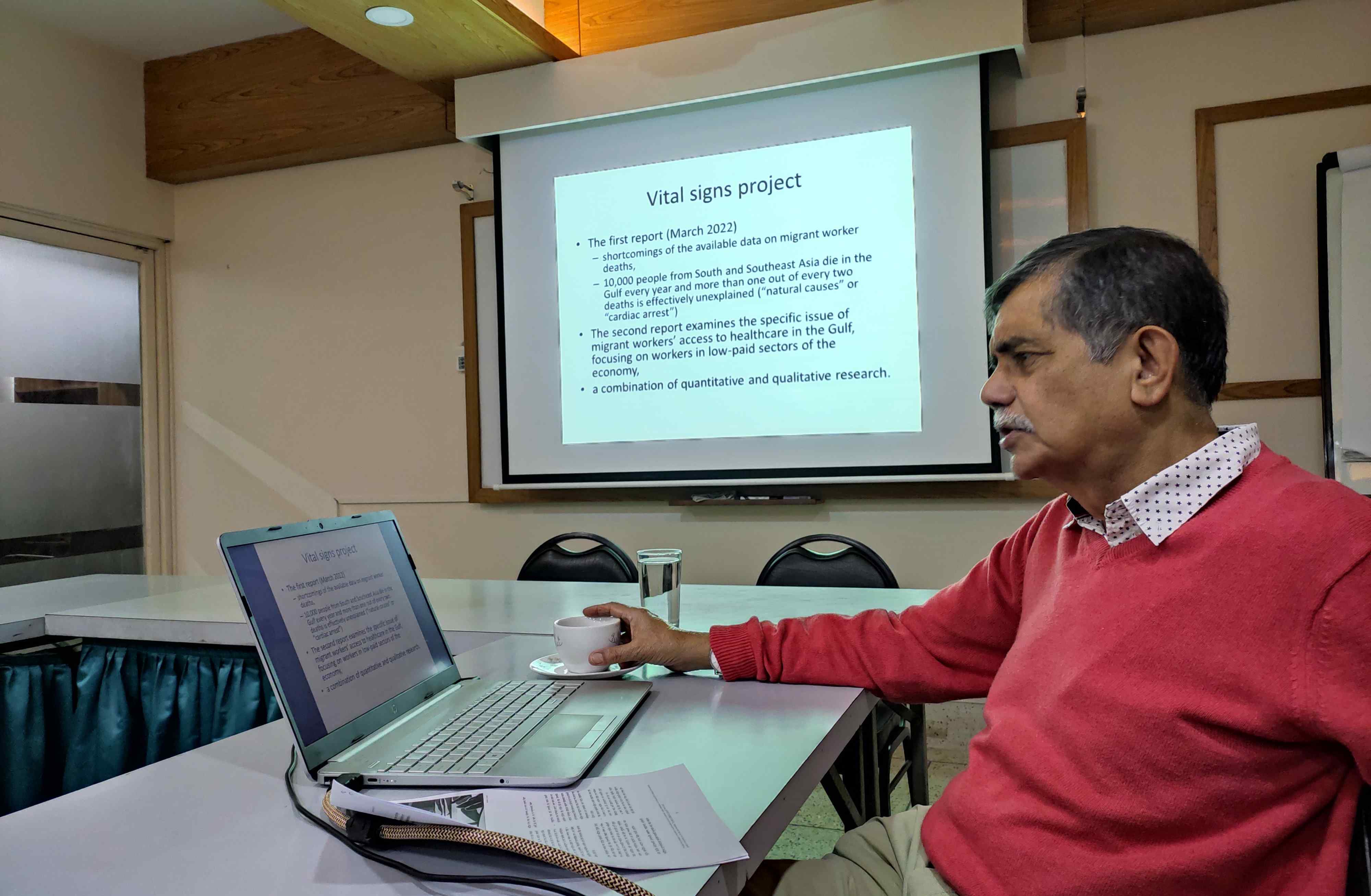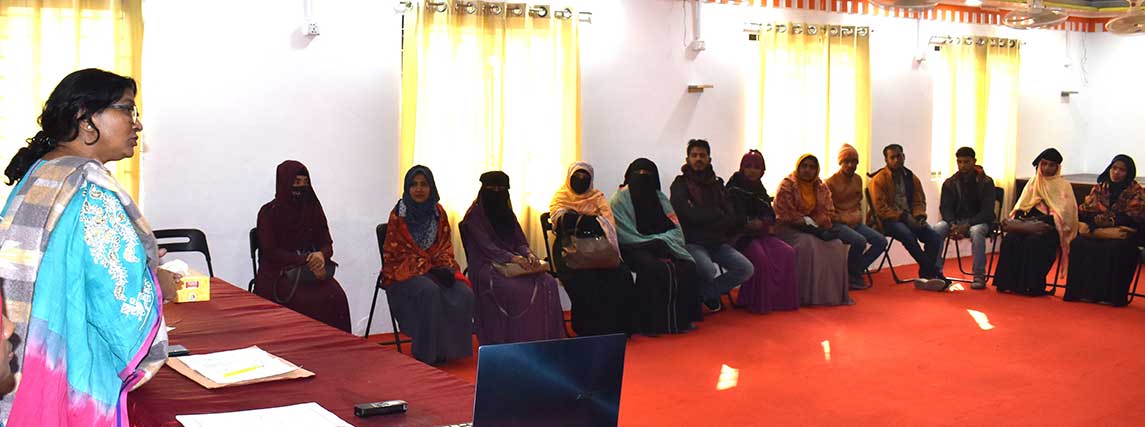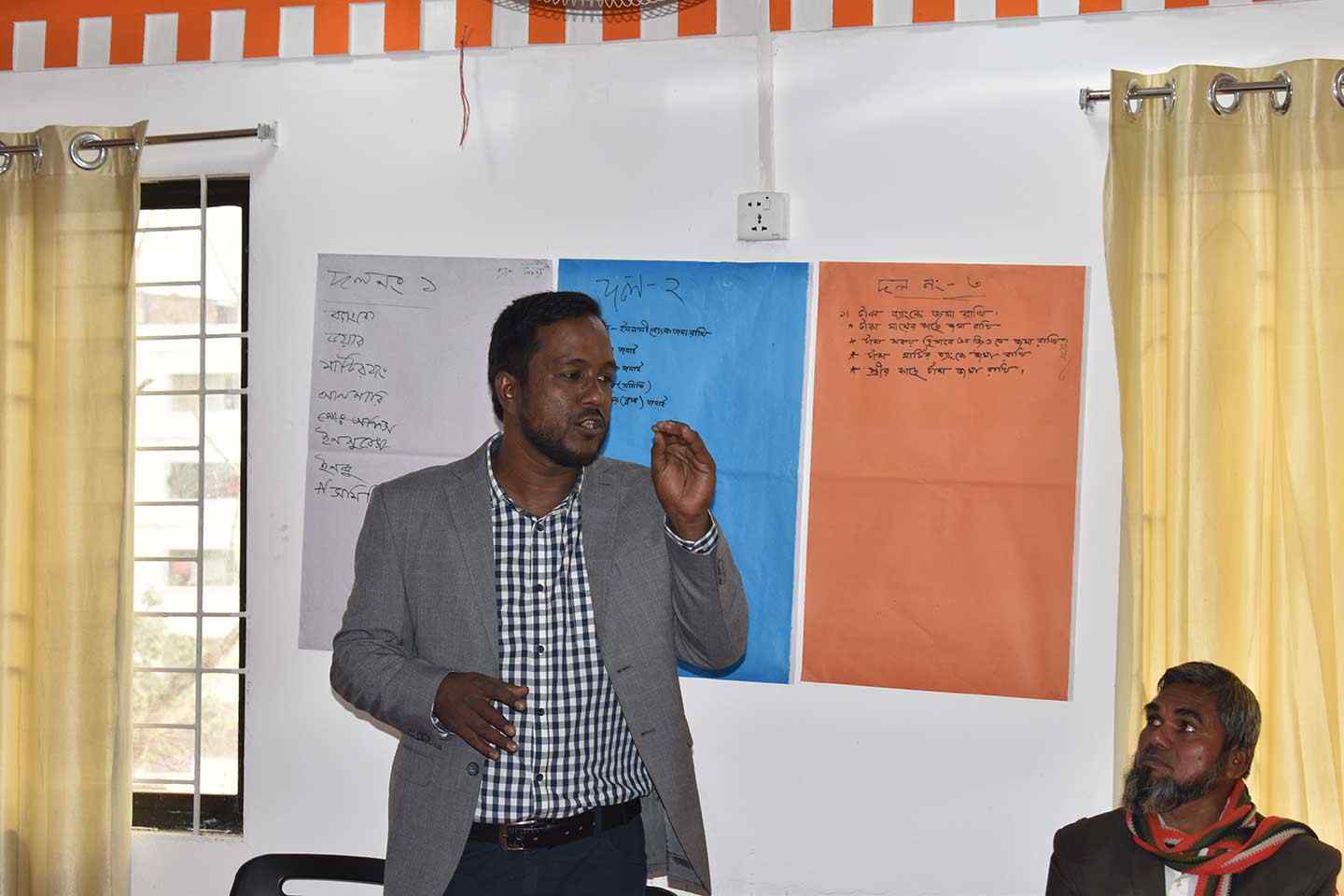National Consultation on
Regularization of Sub-agents for Ensuring Fair and Ethical Recruitment
Date: December 23, 2023
Venue: Amari Dhaka
Organized by RMMRU
Supported by ILO and UN Women
RMMRU organized a national consultation on December 23, 2023, in Amari Dhaka, with the aim of developing a comprehensive policy document for regularizing sub-agents to ensure Fair and Ethical Recruitment. Mr. Md. Salim Reza, Full full-time member of NHRC, graced the programme as the Chief Guest; Ms. Mahjabeen Khaled, Former MP and Secretary General of Migration CAUCAS in Bangladesh, was present as the Guest of Honor. Dr. Mallick Anwar Hossain, Managing Director, BOESL, and Mr. Mohammad Abdul Hi, PAA, Director BMET, were the Special guests of this programme.
The programme was divided into two major sessions. The first session was in consolidation of the recommendations to finalize the model for regularization of sub-agents where the discussants were Mr. Masud Rana, a Senior Statistical Officer from BMET Mr. Ali Haider Chowdhury from BAIRA, Advocate Humayun Ahmed from Tangail Judge Court. This session is Facilitated by Ms. Tapati Saha, Programme Manager, UN Women. The second session was on enhancing the labor recruitment system by developing rules for the regularization of sub-agents. This session is facilitated by Ms. Rahnuma Salam Khan, National Project Manager, ILO. The issue was discussed by Md. Abul Basar, Project Director, SIMS, Helvetas, Mr. Syed Saiful Haque, Chairman, WARBE DF, Advocate Md. Tajul Islam, Bangladesh Supreme Court, and Mr. Shimonuzzaman, Project Manager, RMMRU, Advocate, Bangladesh Supreme Court as the Discussant.
The discussion primarily revolved around defining the roles, responsibilities, and regulations concerning different professionals functioning as sub-agents. The discussion also touched upon the relationship between migrants, BMET, and their respective agents, underscoring the necessity for clearer guidelines and specifications within the rules to govern these relationships. Furthermore, the need for a well-defined code of conduct for sub-agents was emphasized by the discussants. Through this initiative, RMMRU has consolidated the recommendations of multi-stakeholders to finalize the model and directives of the regularisation as well as systematic engagement of the sub-agents to ensure fair and ethical recruitment at the national level.
The Daily Star, Prothom Alo, and Bonik Barta covered the news of the consultation. The Link to this programme is:
1. Recruitment system of migrant workers should be revamped
2. জাতীয় পরামর্শ সভায় বক্তারা কর্মী সরবরাহকারীদের নিরাপদ অভিবাসনে উৎসাহিত করতে হবে
Training on
Enhancing Capacity of Newly Licensed Recruiting Agencies for Ensuring Ethical Recruitment Practices
(5th batch)
Venue: BMET Conference Room
Date: December 13 and 14, 2023
Jointly Organized by RMMRU and BMET
Supported by Helvetas Bangladesh
RMMRU in collaboration with BMET organised 5th batch training for recruiting agencies aimed at strengthening the capabilities of recruiting agencies. The training titled “Enhancement of Capacity of Newly Licensed Recruiting Agencies for Ensuring Ethical Recruitment Practices” took place on 13-14 December 2023 at the BMET conference room in Dhaka from 9:30 am to 4:30 pm with the support of the Helvetas Bangladesh and the Swiss Agency for Development and Cooperation (SDC).
The comprehensive training was designed and conducted based on the circulated schedule by MoEOWE, divided into 12 sessions of 16 hours over 2 days, prepared collectively with BMET and RMMRU’s previous training sessions. For the first time, this training included newly licensed recruiting agencies along with 30 old recruiting agencies. This training was successfully conducted with the active participation of 60 agencies holding key positions such as Proprietors, Managing Directors, and Managing Partners.
The chief guest at this event was Dr. Ahmed Munirus Saleheen, Hon’ble Senior Secretary of MOEOWE, and the programme was chaired by Mr. Md. Saleh Ahmad Mozaffar, Director General (Grade -1) of BMET.
Key sessions were led by distinguished officials such as Additional Secretary, Deputy Secretary MoEWOE, ADGs and Directors and Senior Officials from BMET. The two days long sessions were on Migration Act -2013, Overseas Employment and Migration Rules-2019, Overseas Employment Migration Management Rules 2017, Recruiting Agency Classification Rule 2020, Housekeeping Related Rules 2017 etc. Besides Administrative Matter in Recruitment Management, Ethical Recruitment practices, Challenges and mitigation strategies in recruitment management. For the first time, this training included a session on the Money Laundering Prevention (Amendment) Act, 2015, The Wage Earners Welfare Board Act, 2018, the Policy on Health Examination of Bangladeshi Workers Going Abroad, 2022, Policy on sending female domestic workers the Middle East including Saudi Arabia and other Middle East Countries including Saudi Arabia (Except Kuwait): New Policy for Female Domestic Workers.
Marina Sultana, Director Program of RMMRU, delivered the welcome speech, and Mrs. Zohora Monsur, Deputy Director, BMET, effectively coordinated and moderated the training. RMMRU and BMET evaluated the agencies with pre-test and post-test questionnaires. At the end of the programme, the Chief Guest provided certificates to the participants for successfully completing the two-days long training in presence of invited guests.
Workshop on Capacity Analysis of District Employment and Manpower Offices (DEMO)
Jointly organised by BMET and RMMRU
Supported by Helvetas Bangladesh
Date: 24-25 November
Venue: CCULB Resort and Convention Hall, Gazipur
A two-day workshop on Capacity Analysis of District Employment and Manpower Offices (DEMO) was jointly organised by the Bureau of Manpower Employment and Training (BMET) and Refugee and Migratory Movements Research Unit (RMMRU) at CCULB Resort and Convention Hall, Gazipur on 24-25 November, 2023. A total of 18 DEMO Assistant Directors from different districts such as; Barisal, Bogura, Chattogram, Chandpur, Cumilla, Dhaka, Feni, Jamalpur, Jashore, Manikganj, Moulvibazar, Munshiganj, Mymensingh, Narsingdi, Noakhali, Rangpur, Sylhet, Tangail nominated by BMET took part in the workshop.
RMMRU’s Executive Director C R Abrar inaugurated the workshop on 24 November and shared the objectives of the different sessions. Mr. Mir Khairul Alam, Additional Secretary, Ministry of Expatriates’ Welfare and Overseas Employment was present at the inaugural day. The Additional Secretary said addressing the DEMO officials: “We cannot see DEMO as a separate entity from BMET. Their work is not limited only to registration and fingerprint. It is much beyond that and you have to think on that line.” Helvetas Bangladesh’s Project Director Md. Abul Basar said, “There is an office called District Employment and Manpower Office but people cannot relate easily that this is the responsible office for migration. An effort can be taken to rename the establishment so that people can easily relate that this is the office for migration just by looking at the name.”
During the groupwork many challenges were presented by the DEMO representatives which included; manpower shortage, not having DEMO’s own building and infrastructure, lack of coordination with WEWB, not having the services decentralised, lack of coordination with PKB, lack of budget for information dissemination, lack of training of officers involved in complaint management, at the field level etc. One of the Assistant Directors said, “not having a dedicated building for DEMO is a huge challenge. This becomes tougher when providing service to the aspirant, returnee migrants and their family members.”
Mr. Saleh Ahmad Mozaffar, Director General (Grade-1) was present as the Chief Guest on the 2nd day of the workshop. Mr. Mozaffar Said, “DEMO officials should have an updated list of the recruiting agencies who are involved in overseas employment. A citizen charter entailing the services to be provided to the public has to be put outside the DEMO. You should be the main focus in a district. I want to see innovative leadership in you. You have to challenge the status quo if you want to be a leader.”
Among others, BMET Officials Md. Masud Rana, Senior Statistical Officer, Mohammad Ali Siddiqui, Deputy Director (Employment), Zohora Monsur, Deputy Director (Employment) and Md. Rezwanul Haque Chowdhury, Deputy Director (Administration) were present at the workshop and conducted different sessions on DEMO’s Activities, PDO, Arbitration etc. RMMRU’s Director (Programme) Marina Sultana was also present along with other officials of RMMRU at the workshop.
Policy Discussion on Untimely Return of Migrants Workers
Organised by Refugee and Migratory Movements Research Unit (RMMRU)
Date: 23 November 2023
Venue: InterContinental Dhaka
Supported by Helvetas Bangladesh
Refugee and Migratory Movement Research Unit (RMMRU) organized a policy discussion named “Policy Discussion on Untimely Return of Migrants Workers on 23 November 2023 at the InterContinental Dhaka with the support of the Swiss Agency for Development and Cooperation and Helvetas Bangladesh. It aims to address the nature of struggles and suffering experienced by untimely returned migrants workers and generate evidence with policy recommendations to advocate for the protection of migrant’s rights.
For this purpose, RMMRU conducted a survey on on 218 untimely returnee migrants, including 42 women workers, primarily return from Saudi Arabia, Oman, UAE, Jordan, and Malaysia between 1 and 16 months after 2020. Unveiling the report Dr. Tasneem Siddiqui notes that among expatriate workers, 15 percent migrants returned within 30 days, 14 percent returned within one to three months, 29 percent returned within three to six months, and 43 percent returned within 6 to 16 months. It presented that 74 percent of migrant workers have suffered economically, whereas 15 percent have suffered psychologically after their return. It also shows that 34 migrant workers were detained and deported -- 16 of whom did not have valid work permits while 11 of whom lacked valid visas. Besides, 33 migrants returned after failing to find work, while 44 others came back as they were not provided promised jobs and wages. Other reasons for return include employers' misconduct, low wages, and physical ailment, said the survey.
Mr. Md. Selim Reza, A full-time member of the National Human Rights Commission (NHRC), graced the discussion as the Chief Guest. Barrister Shameem Haider Patwary, MP and Chairman of Bangladesh Parliamentarians' Caucus on Migration and Development, presented as the Chair. Mr. Saleh Ahmed Mujaffor, Director General, BMET, and Dr. Mallick Anwar Hossain, Managing Director of BOESL, were the Special Guests at this event. The programme is also graced by the presence of representatives of UN agencies, international organizations, and non-governmental development organizations, including BAIRA Secretary General Ali Haider Chowdhury.
"It is important for both sending and destination nations, alongside civil society and recruitment agencies, to advocate together in global forums to address the crucial issue of returnee migrant workers," stated Mr. Salim Reza, a full-time member of the National Human Rights Commission, during the program. Furthermore, improving migrant workers' skill training is important for ensuring quality migration from Bangladesh.
Director General of the Bureau of Manpower, Employment, and Training (BMET) Mr. Saleh Ahmed Mujaffor, stated, “We're looking into ways to strengthen our efforts to raise awareness as we understand how important awareness is in the fight against migration fraudulence.” According to him, "We have more than enough policies for safe and orderly migration. The issue is in execution. He emphasised that "we have to focus on quality migration rather than sending a large number of migrants."
Media Coverage of the
1. বিদেশফেরতদের ৩৫ শতাংশ এসেছেন কাজ না পেয়ে
2. 97pc migrants return unwillingly, 35pc not getting jobs: study
3. Survey on untimely return of 218 migrants: Deportation, not getting promised job key reasons
4. 35% of migrants return home post-Covid failing to get jobs abroad: RMMRU study
5. 35% migrants returning due to job scarcity, insufficient salary
6. বিদেশফেরত ৭৪% কর্মী ক্ষতিগ্রস্ত
7. বিদেশফেরতদের ৩৫ শতাংশ এসেছেন কাজ না পেয়ে
8. চার যুগেও আনুষ্ঠানিক খাত হয়ে উঠতে পারেনি শ্রমশক্তি রফতানি
10. 97pc migrants return unwillingly, 35pc not getting jobs: study
11. বিদেশফেরতদের ৩৫ শতাংশ এসেছেন কাজ না পেয়ে
Training on
Enhancing Capacity of Newly Licensed Recruiting Agencies for Ensuring Ethical Recruitment Practices (4th batch)
Venue: BMET Conference Room
Date: November 1st and 2nd, 2023
Jointly Organized by RMMRU and BMET
Supported by Helvetas Bangladesh
Refugee and Migratory Movements Research Unit (RMMRU) and the Bureau of Manpower Employment and Training (BMET) jointly conducted a training session titled "Enhancement of Capacity of Newly Licensed Recruiting Agencies for Ensuring Ethical Recruitment Practices. (4th batch)". This training is supported by the SIMS project of Helvetas Swiss Intercooperation Bangladesh. The two-day-long training session was organized on 1st and 2nd November 2023 at the Conference Room of BMET. 62 proprietors, managing directors, and managing partners of 54 newly selected agencies received this training before getting the license. The training aimed to enhance the capacity of newly licensed recruiting agencies, preparing them with the knowledge and skills required to ensure ethical recruitment practices.
Dr. Ahmed Munirus Saleheen, Honorable Senior Secretary of MOEOWE, graced the event as the chief guest, while Mr. Md. Saleh Ahmad Mozaffar, Director General of BMET, chaired the program. Dr. Tasneem Siddiqqui, Founding Chair of RMMRU, and Mr. Md. Ali Haidar Chowdhury, Secretary General of BAIRA, participated as special guests. Several distinguished individuals facilitated issue-specific sessions during the training. This training has been enriched with the issue-specific sessions facilitated by Mr. Mir Khairul Alam, Additional Secretary, MoEWOE, Mr. Mofidul Alam, Deputy Secretary, MoEWOE, Mr. A H M Anwar Pasha ADG, Employment, BMET, A S M Ashraful Islam ADG, Training, BMET, Mr. Mohammad Mizanur Rahman Bhuiyan, Director (Employment), BMET, Mr. Mohammad Abdul Hi, PAA, Director (Immigration), BMET, Md. Masud Rana is a senior statistical officer at BMET, and Mohammad Ali Siddiqui is a deputy director at BMET. The training sessions covered various aspects of laws, policies, and rules governing ethical recruitment practices as like as the previous training sessions.
Marina Sultana, Director Program of RMMRU, delivered the welcome speech, and Mrs. Zohora Monsur, Deputy Director of BMET, coordinated and moderated the training. The program concluded with the Chief Guest distributing certificates to participants for their successful completion of the comprehensive two-day training. According to the Hon’ble Secretary of MoEWOE, “this training program is a fundamental training course for newly licensed recruiting agencies for promoting ethical recruitment practices in the industry.”
Organised by: Refugee and Migratory Movements Research Unit (RMMRU)
Supported by: South Asia Centre for Labour Mobility and Migrants (SALAM)
Date: September 27, 2023
Venue: Social Science Building, University of Dhaka
The workshop had three sessions. Professor Zia Rahman, Dean of the Faculty of Social Sciences at the University of Dhaka, was the resource person for the morning session. He discussed the philosophical foundations of qualitative research. Dr. Rahman focused on the epistemological differences that ultimately encourage scholars to choose qualitative research methods in studying social phenomena. Notwithstanding such differences, the gap between qualitative and quantitative research is diminishing these days because of the increasing popularity of methodological pluralism, Professor Rahman asserted.
Professor Farid Uddin Ahmed of Political Science at the University of Dhaka focused on the nature of data that qualitative researchers usually deal with. He also stressed the necessity of designing social science inquiry to describe, analyse, and interpret the social milieu and make inferences about social reality.
In the afternoon session, participants enjoyed an insightful presentation of the Co-founder of RMMRU, Professor Tasneem Siddiqui, on how to use the photovoice method in social research. She offered the participants hands-on tips for the application of the photovoice method and urged the necessity to creatively improvise this method in order to effectively accommodate the viewpoints of the community under a study. In the same session, RMMRU researcher Tamim Billah briefly introduced NVivo software for analysing qualitative data.
The participants were awarded certificates in the concluding session of the workshop.
Report on “Strengthening Civil Society Organization (CSO) and Trade Union (TU) Advocacy Engagement to Advance the Rights of Women Migrant Workers from South Asia.”
Date: 25 and 26 September 2023
Jointly Organised by: RMMRU, ITUC-BC in collaboration with MFA
Venue: Green View Resort and Convention, Dhaka, Bangladesh
Refugee and Migratory Movements Research Unit (RMMRU) and ITUC- BC, in collaboration with Migrant Forum in Asia (MFA), jointly organised a capacity-building programme on Strengthening Civil Society Organization (CSO) and Trade Union (TU) Advocacy Engagement to Advance the Rights of Women Migrant Workers from South Asia. The duration of this training was two days and consisted of eight sessions. Twenty-eight participants from 17 organizations attended this residential training, 14 from CSOs and 14 from Trade Unions. 4 migration and gender experts facilitated this training. The capacity building programme aims to:
- Facilitate understanding among CSOs and TUs about issues faced by women migrant workers, Gender-Based Violence, and VAW against women migrant workers.
- Capacitate CSOs and TUs to engage governments on issues of women migrant workers.
The training highlights the issues of understanding the roots and drivers of female migration, exploring the feminization of migration: recognizing risks and challenges, comprehending violence against women migrant workers, contextualizing VAW and Gender-Based Violence (GBV), promoting fair and ethical recruitment, support systems for women migrant workers and advocacy strategies. Each session was participatory, where participants were divided into groups that created poster presentations, produced video documentaries, and showed role-playing to support their efforts.
Throughout the course of this training, individuals from diverse backgrounds and professions came together to explore, discuss, and strategize on how to advance the rights of women migrant workers in South Asia. After concluding the training, participants committed to putting to use their learning in the future in their respective working areas, applying the knowledge and skills they acquired in their professional roles. Participants have put forward several valuable recommendations to mitigate the abuse and exploitation faced by female migrants from Bangladesh. These are-
- Local government cooperation
- Having women-friendly training centers
- explain the contract in the migrants’ own language
- ensuring women-friendly facilities at every stage of migration
- Must have a hotline number
- Ensuring regular health checkups, arranging proper medical certificates
- To increase the services of labor wings
- Campaigning with representatives at the district or upazila level
- Budget allocation for the migration sector by local administration and so on.
Report on Policy Discussion on CSO’s Demand in Election Manifesto
Jointly Organised by Bangladesh Parliamentarians' Caucus on Migration and Development and Bangladesh Civil Society for Migrants (BCSM)
Date: 11 September 2023,
Venue: LD Hall, Bangladesh National Parliament
Bangladesh Civil Society for Migrants (BCSM) and Bangladesh Parliamentarians' Caucus on Migration and Development jointly organised a policy discussion on “CSO’s Demand in Election Manifesto” for including the issue of migrants' rights and welfare in the election manifestos of political parties in the 12th National General Elections.
In this meeting, Dr. Tasneem Siddiqui, Chairperson, BCSM and Founder Chair, RMMRU, on behalf of BCSM, raised and presented the demands for the inclusion of the rights of migrant workers in the election manifestos of political parties ahead of national election. The demands for inclusion of migrants' rights are presented in two parts. Firstly the main demands and then the rights of migrants, rights of women migrants, migration management, welfare, skill manpower, remittance collection and investment and inclusion of international labour migration in climate adaptation programmes.
The event was attended by 12 honourable members and MPs of Bangladesh Parliamentarians' Caucus on Migration and Development and 19 members from 16 organisations of Bangladesh Civil Society for Migrants (BCSM).
Barrister Shameem Haider Patwary, MP and Chairman, Bangladesh Parliamentarians' Caucus on Migration and Development, was present in the discussion as the Chair. He said that “the manifesto is the mandate for elected political parties. I believe that the demands that have been raised for the development of migrant’s benefits will be incorporated into the manifestos of political parties for the interest of country. In the manifesto, the political parties can commit for increasing the capacities of BMET, creating a year-wise target of skill development using artificial intelligence for migrants, strengthening the capacities of Probashi Kollayan Bank etc”.
Mr. Syed Saiful Haque, Co-Chair, BCSM and Chairman, WARBE Development Foundation, in his concluding remarks strongly discussed about zero migration cost, and corporate social responsibilities of remittance accepting banks, etc for migrant workers and thanked everyone to join and make the programme successful.
The discussion meeting was held on September 11, 2023 from 1:30 PM to 4:30 PM in the LD Hall of Bangladesh National Parliament.
Training on
Enhancing Capacity of Newly Licensed Recruiting Agencies for Ensuring Ethical Recruitment Practices (3rd batch)
Venue: Auditorium of Bijoy 71, MoEWOE
Date: August 23 & 24, 2023
Jointly Organized by RMMRU and BMET
Supported by Helvetas Bangladesh
Refugee and Migratory Movements Research Unit (RMMRU) and the Bureau of Manpower Employment and Training (BMET) jointly conducted a training session titled "Enhancement of Capacity of Newly Licensed Recruiting Agencies for Ensuring Ethical Recruitment Practices. (3rd batch)" This training is supported by the SIMS project of Helvetas Swiss Intercooperation Bangladesh. The two-day-long training session was organized on August 23 and 24, 2023, at the Auditorium of Bijoy 71, MoEWOE.
As per the direction of Hon’ble Senior Secretary, MoEOWE, Dr. Ahmed Munirus Saleheen, 100 Proprietors, Managing Directors, and Managing partners of 92 newly selected agencies received this training before getting the license. The training aimed to enhance the capacity of newly licensed recruiting agencies, preparing them with the knowledge and skills required to ensure ethical recruitment practices. Md. Shahidul Alam. NDC, Hon'ble Director General of BMET, graced the training as the Chief Guest. In his speech, he gave guidance to the agencies about their responsibilities and duties to protect the rights of migrants. Md. Ali Haidar Chowdhury, Secretary General of BAIRA, and Fakhrul Islam, Joint Secretary of BAIRA, graced this training as the Special Guests. Several distinguished individuals facilitated issue-specific sessions during the training.
The training sessions covered various aspects of laws, policies, and rules governing ethical recruitment practices, including the Overseas Employment and Migration Act - 2013, Overseas Employment and Migration Rules - 2019, Overseas Employment Migration Management Rules 2017, Recruiting Agency Classification Rule 2020, and Housekeeping Related Rules 2017. Discussions also encompassed administrative matters in recruitment management, ethical recruitment practices, challenges, mitigation strategies, workers' rights, the crucial role of recruiting agencies, etc. Marina Sultana, Director Programme of RMMRU, delivered the welcome speech, and Mrs. Zohora Monsur, Deputy Director, BMET, effectively coordinated and moderated the training. The program concluded with the Chief Guest distributing certificates to participants for their successful completion of the comprehensive two-day training.
Debriefing Meeting on the Male’ Conference on Bangladeshi Labour Migrants in the Maldives
Organised by RMMRU
Supported by The Asia Foundation
Venue: Boshonto Hall, Hotel Six Seasons, Gulshan-2, Dhaka.
Date: 30 July, 2023
On July 30, 2023, a debriefing meeting on the Male’ bilateral conference on Bangladeshil abour migrants in the Maldives was held at Hotel Six Seasons, Gulshan-2, Dhaka. Refugee and Migratory Movements Research Unit (RMMRU) organised the meeting with the support of The Asia Foundation. It was attended by the stakeholders related to labour migration in Bangladesh.
The participants of the meeting included Mr. Rana Mohammad Sohail, MP; Mr. MofidulAlam, Deputy Secretary, Ministry of Expatriates’ Welfare and Overseas Employment (MoEWOE); Mr. Ali Haider Chowdhury, General Secretary, BAIRA; Mr. Md. Touhid Hossain, former foreign secretary; Rear Admiral A S M Awal, former ambassador; Ms. Mahjabeen Khaled, Secretary General, Parliamentarians’ Caucus on Migration and Development and former MP; Mr. Kazi Faysal bin Seraj, Country Representative, The Asia Foundation Bangladesh; Rahnuma Salam Khan, National Project Manager, ILO; Md. Zakaria, Senior Program Manager, The Asia Foundation; Dr. Shahab Enam Khan, Researcher; Md. Obaidul Haque, Researcher; Dr. C R Abrar, Executive Director, RMMRU; CSOs, and journalists.
Dr. Shahab Enam Khan presented the findings and recommendations of both the studies conducted by RMMRU and PILC briefly. The summary of the discussions of Male’ bilateral conference covering institutional and legal challenges, human trafficking, gender and safe migration, and bilateral cooperation issues was presented by Md. Obaidul Haque. Along with the delegates of Male’ conference other participants attended the open discussion and gave their remarks. The debriefing meeting was moderated by Dr. C R Abrar.
Bilateral Conference on Bangladeshi Labour Migrants in the Maldives
Jointly organised by RMMRU and PILC
Supported by The Asia Foundation
Date: 17-18 July, 2023
Venue: H. Meerumaa Conference Hall, Violet Magu, K. Male’, Maldives
The delegation from Bangladesh included Mr. Tanvir Shakil Joy, MP; Mr. Rana Mohammad Sohail, MP; Mr. A H M Anwar Pasha, Additional Director General, Bureau of Manpower Employment and Training (BMET); Mr. Mofidul Alam, Deputy Secretary, Ministry of Expatriates’ Welfare and Overseas Employment (MoEWOE); Barrister Mr. Jyotirmoy Barua, Advocate, Bangladesh Supreme Court; Mr. Faruk Wasif, Planning Editor, Daily Samakal; Mr. Ali Haider Chowdhury, General Secretary, BAIRA; Dr. Shahab Enam Khan, Researcher; Md. Obaidul Haque, Researcher and Dr. C R Abrar, Executive Director, RMMRU.
A study titled ‘Migration Dynamics of Bangladesh and the Maldives Corridor’ was conducted by RMMRU with the support of The Asia Foundation. On behalf of RMMRU, Dr. Shahab Enam Khan presented the findings and recommendations of the study at the bilateral conference. Institutional and legal challenges, human trafficking, gender, safe migration, and bilateral cooperation issues are discussed over three sessions of Day 1 of the conference.
Along with the delegates from Bangladesh the participants representing the Ministry of Economic Development, Human Rights Commission, Maldives Police Service, Maldives Immigration and Employment Tribunal, Bar Council, National Counter Terrorism Centre of Maldives, Maldivian Red Crescent, Maldives Trade Union Congress and Mission for Migrant Workers Maldives attended the conference from Maldivian side. The conference was also attended by the members of the Australian Embassy in the Maldives, UNDP, ILO, American Bar Association, The Asia Foundation Bangladesh, The Asia Foundation Sri Lanka, and migrant workers working in the Maldives. Rear Admiral S M Abul Kalam Azad, High Commissioner of Bangladesh Embassy in the Maldives gave the closing remarks on Day 1. Dr. C R Abrar moderated Day 1 of the conference.
On Day 2, Mr. Md. Obaidul Haque discussed the opening day's key issues, including recruitment practices, institutional issues, rights and justice issues, remittance and data, changing perception of the locals and role of media, etc. The research findings from both RMMRU and PILC were presented before the representatives of local CSOs and different government functionaries by Dr. Shahab Enam Khan and Ms. Fathimath Eema Hossain, Senior Research Officer of PILC, respectively. Day 2 was moderated by Ms. Mariyam Shunana, President of PILC. The conference ended with a vote of thanks from both of the organisers.
Report Launching Event on
Killer Heat: the Impact of Extreme Temperatures and Climate Change on Migrant Workers in the Gulf
Jointly organised by RMMRU and BPCMD
Supported by: FairSquare
Date: 24th June, 2023
Refugee and Migratory Movements Research Unit (RMMRU) and Bangladesh Parliamentarians’ Caucus on Migration and Development (BPCMD) have jointly organised a discussion session on Migrants’ health to mark the launch of the third vital signs report titled Killer Heat: Extreme Temperatures and Migrant Workers in the Gulf on June 24, 2023 at Dhaka. The programme is supported by UK based research organization FairSquare. The report captures the experiences five labour sending countries- Bangladesh, India, Nepal, Philippines, and Pakistan to the six Gulf States. The event was attended by parliamentarians, and medical practitioners, serving and retired state functionaries, academics, lawyers, CSOs, and members of the media. The report was presented by Dr. C R Abrar, Executive Director, RMMRU.
This report explores how extreme temperatures and the Gulf States’ abusive labour practices combine with devastating consequences for the health of migrant workers. The report finds that long-term exposure to extreme heat leads to chronic health problems which require lifelong treatment. Heat can severely impact internal organs, with the heart and kidneys being particularly susceptible to substantial damage. The report further notes that there is a very strong association between extreme heat and heart failure, heart attack, arrhythmia and stroke.
Dr. Md. Dilder Hossain Badal, Nephologist, Dhaka Medical College Hospital said that they received many patients with kidney problems working in the Gulf States. He stated the disease is largely caused by exposure to heat and not drinking enough water. Dr. Md. Monirul Islam, Critical Care specialist who served as a medical specialist in Saudi Arabia for over three decades said that every patient dies because of the heart failure and this cannot be assigned as a reason of death. He said in the Saudi medical protocol the reason of death is clearly assigned and documented, therefore the embassies of labour sending countries should ensure that the actual reasons for death is clearly stated in the documents that accompany the dead bodies of the migrant workers.
Ad. Khodeja Nasreen, MP said that most of the migrant workers go to the Gulf states by Sub-agents as a result while they are living in this unhealthy environment and extreme temperature they do not get any help from the authority. We should address and ensure all the health need and safety properly.
Dr. C R Abrar said an extreme rising temperature and climate change in the Gulf States is detrimental to migrant workers. Migrant workers have a huge contribution in the economy of both origin and destination countries so these countries must commit to protect their health.
The Daily Bangla Tribune: জিসিসি দেশগুলোয় কঠিন আবহাওয়াতে কর্মীর ঝুঁকি কমানোর মতো আইন নেই
The Daily Business Standard: Prolonged manual labour in high temperature leads to severe kidney damage: Study
The Daily Banik Barta: উপসাগরীয় দেশগুলোতে অভিবাসীদের তাপ থেকে সুরক্ষায় পদক্ষেপ নিতে হবে
The Daily Prothom Alo: মধ্যপ্রাচ্যে প্রবাসী কর্মীদের প্রতি দুজনে একজনের মৃত্যুর কারণ জানা যায় না: রামরু
The Daily Star: Vital yet vulnerable
Policymaker Engagement Event on
Labour Migrants’ Access to Healthcare in the Gulf States
Jointly Organised by BPCMD and RMMRU
Supported by: FairSquare
Date: June 7, 2023
Venue: Modhumoti Hall, Hotel InterContinental, Dhaka
The programme was attended by Barrister Shamim Haider Patwary, MP; Mr. Rana Mohammad Sohail, MP; Ms. Mahjabeen Khaled, former MP, Secretary General, BPCMD; Mr. Salim Reza, Full Time Member, National Human Rights Commission; Dr. Harunur Rashid, Professor, Sir Salimullah Medical College Mitford Hospital; Dr. Dildar Hossain Badal, MBBS, MD, Nephrologist, Dhaka Medical College Hospital; Mr. Kazi Abul Kalam, former Joint Secretary; Dr. Md. Nurul Islam, Former Director, BMET; other government functionaries, Journalists and civil society representatives.
Dr. C R Abrar, Executive Director, RMMRU shared the report findings and recommendations for both origin and destination countries. He stated that migrant workers enjoy very little denied access to healthcare in the Gulf States and made the point that there is a strong connection between the death rate and lack of the health care in the Gulf States. The programme was moderated by Mr. Md. Obaidul Haque, RMMRU EC member and Associate Professor of the University of Dhaka,
Dr. Badal said that they receive many patients with kidney problems that developed while working in the Gulf States. The physician attributed this to the migrants’ exposure to the heat and not consuming enough water to compensate for water lost as perspiration. Dr. Rashid said that in order to ascertain the causes of death Bangladeshi health authorities may consider performing autopsies on bodies that are returned from destination countries without a valid cause of death stated on the death certificate.
MP Patwary said that the Bangladeshi embassy in the destination country should be more proactive in ensuring that migrant workers can access healthcare in destination countries. Ms. Mahjabeen Khalid said that health of migrant workers was an important issue and it was largely ignored over the years. MP Sohail Rana said that every employer should ensure the healthcare of the migrants.
The Daily Prothom Alo: চোখ বুজে এ চিত্র আর কত দিন দেখতে থাকব: অভিবাসী শ্রমিকদের নিয়ে সেলিম রেজা
The Daily Bangla Tribune: ‘জিসিসি দেশগুলোতে স্বাস্থ্যসেবা পেতে কর্মীদের সম্পদ বিক্রি করতে হয়’
The Daily Bangla Tribune: ‘প্রবাসী কর্মীর অকাল মৃত্যুর অন্যতম কারণ উচ্চ অভিবাসন ব্যয়’
The Daily Samakal: প্রবাসী কর্মীরা বেশি মারা যান চড়া সুদে ঋণ করে বিদেশে গিয়ে
Research Finding Dissemination Event on
'Migration Dynamics of Bangladesh and the Maldives Corridor'
Organised by: Refugee and Migratory Movements Research Unit (RMMRU)
Supported by: The Asia Foundation
Date: 7 June, 2023
Venue: Hotel InterContinental, Dhaka
The study is based on the assumption that the decision of a Bangladeshi worker to migrate to the Maldives is influenced by three main factors: (1) the individual’s positive or negative evaluation of the Maldives; (2) the person’s perception of economic potential in the Maldives; and (3) perceived gainful economic opportunities, influenced by kinship-based relations, which describes the person’s perceived self-efficacy or ability to adjust with the Maldivian society. Field work on both documented and undocumented Bangladeshi migrants have conducted among 250 returnee migrants from the Maldives in three high migration intensity districts (Cumilla, Tangail, and Dhaka) and 120 current migrants in Male and Hulumale.
The event was attended by Mr. Tanveer Shakil Joy, MP; Barrister Shamim Haider Patwary, MP; Mr. Md. Touhid Hossain, former foreign secretary; Mr. Md. Shahidul Alam, NDC, Director General, BMET; Rear Admiral (retd.) Kazi Sarwar Hossain, former High Commissioner, Bangladesh Embassy in Maldives; Rear Admiral (Retd.) ASM A Awal, former High Commissioner, Bangladesh Embassy in Maldives; Dr. Syeda Rozana Rashid, Professor, University of Dhaka; Kazi Abul Kalam, former Joint Secretary; Dr. Md. Nurul Islam, Former Director, BMET; Mr. Ali Haider Chowdhury, Secretary General, BAIRA; Mr. Kazi Faisal bin Seraj, Country Representative, The Asia Foundation; journalists and civil society representatives.
DG of BMET Mr. Shahidul Alam said that Maldives can be a significant labour market for Bangladeshi workers and the foreign ministry needs to take step in this regard. MP Patwary said that steps should be taken so that undocumented migrant workers can remit money home without hassle through formal channels. MP Joy in his statement noted that, people want to migrate in the Maldives voluntarily as the living conditions are better than in other countries. Active collaboration of all stakeholders to tackle various challenges, emphasis on transferring skilled labour to the Maldives, launching of banking operations in the Maldives, and active involvement among stakeholders can help create a smooth migration corridor to the Maldives, the speakers noted.
The Daily Prothom Alo: সরকারের ভুল নীতির কারণে রমরমা হুন্ডি
The Daily Prothom Alo: মালদ্বীপ থেকে ৬৬% শ্রমিক হুন্ডিতে টাকা পাঠান দেশে
The Daily Star: Our workers in Maldives deserve better
The Financial Express: Bangladeshi workers in Maldives facing problems
The Daily Star: Only 53% Bangladeshi workers in Maldives receive promised wage: Study
The Daily Star: Workers in Maldives: 47pc don’t get promised wages
Dissemination Workshop
on
Social Cost of Migration on Left-behind Elderlies and Siblings in Bangladesh
Organised by Refugee and Migratory Movements Research Unit (RMMRU)
Supported by Swiss Agency for Development and Cooperation (SDC)
Date: 25 June 2023
Venue: Auditorium of BRAC Centre Inn, Dhaka
The Guests of Honour were Ms. Mahjabeen Khaled, Former MP, Secretary General, Bangladesh Parliamentarians’ Caucus on Migration and Development and Dr. Zia Rahman, Dean, Faculty of Social Sciences, University of Dhaka.
Dr. Shantanu Majumder, Professor, Department of Political Science, University of Dhaka; Ms. Salma Akhter, Professor, Department of Sociology, University of Dhaka; Ms. Nazia Haider, Programme Manager – Safer Migration, Embassy of Switzerland in Bangladesh, Swiss Agency for Development and Cooperation (SDC) and Mr. Shariful Islam, Deputy Director, Wage Earners Welfare Board (WEWB) were discussants at the event.
The dissemination workshop was Chaired by, Dr. Hamida Aktar Begum, Professor (Retd.), Department of Psychology, University of Dhaka.
Some of the key findings of the study include:
• Without the financial contribution of the elderlies, migration of the young adult members of the households would not be possible.
• Contrary to popular belief, siblings also contribute both financially as well as non-financially in migration journey.
• Though along with household members the benefits of migration is enjoyed by the state and private sectors, the social and economic costs are only borne by the individual members of the households.
• Social costs and benefits of migration borne by the elderlies and siblings vary on the basis of age, gender, ability to earn independently and physical fitness.
• A section of both elderlies and siblings developed their agency in the process of addressing the constraints imposed upon them due to migration of their family members.
Training on “Enhancing Capacity of Newly Licensed Recruiting Agencies for Ensuring Ethical Recruitment Practices (2nd batch)”
Venue: BMET Conference Room
Date: May 24-25, 2023
Organsied by RMMRU
Supported by Helvetas Bangladesh
The two day-long training session was organised on 24 and 25 May 2023 at BMET Conference Room. As per the direction of Hon’ble Senior Secretary, MoEOWE, Dr. Ahmed Munirus Saleheen that 87 newly selected agencies have to receive this training before getting the license. It aims to orient newly licensed recruiting agencies about the knowledge on ethical recruitment in migration management.
Md. Shahidul Alam. NDC, Hon'ble Director General of BMET graced the training as the Chief Guest. In his speech, he gave guidance on the agencies about their responsibilities and duties to protect the rights of migrants. Md. Ali Haidar Chowdhury, Secretary General of BAIRA and Premangshu Shekhar Sarker graced this training as the Special Guests.
This training has been enriched with the issue specific sessions facilitated by Hon'ble ADGs, Directors and Senior Officials from BMET, Hon'ble Joint Secretaries and Deputy Secretaries from MoEWOE. The two days long sessions were on Migration Act -2013, Overseas Employment and Migration Rules-2019, Overseas Employment Migration Management Rules 2017 and The Prevention and Suppression of Human Trafficking Act 2012, Recruiting Agency Classification Rule 2020, Housekeeping Related Rules 2017 etc. Besides Administrative Matter in Recruitment Management, Ethical Recruitment practises, Challenges and mitigation strategies in recruitment management were also focused areas of discussion. At the end of the programme, the Chief Guest provided certificates to the participants for successfully completing the two days long training.
The training has started with a welcome speech from Marina Sultana, Director Programme, RMMRU and Mrs. Zohora Monsur Ela, has successfully coordinated and moderated the training. Near about 95 Proprietors, Managing Partners, Managing Directors and Representatives from 87 Agencies participated in this training.
Stakeholder Engagement Meeting at WEWB
Organised by Refugee and Migratory Movements Research Unit
Supported by FairSquare
Venue: Conference Room, WEWB
Date: 28 May, 2023
RMMRU and the Vital Signs partnership is supported by the UK based organisation, FairSquare which is researching the causes of unnatural deaths of South Asian migrant workers in the Gulf destination countries and their access to health care issues. The report was the second in a series of three. It was published as part of the study.
Stakeholders’ Engagement Meeting on Health Care Condition of Labour Migrants in the Gulf States
Jointly organized by RMMRU and BCSM
Supported by FairSquare
Date: 22 May, 2023
In the next session, representatives of member organisations of BCSM participated in an open discussion on various issues highlighted in the report and labour migration like the working environment of the migrant workers, challenges in accessing health care, reproductive health care in the countries of destination etc.
Jasiya Khatoon, Director, WARBE Development Foundation mentioned, women migrant workers commonly hide health conditions such as diabetes and asthma. As a result, they become sick due to overwork in the countries of destination. So, reforms are needed in medical test for aspirant migrant workers. Besides, the government needs to have a strong system to track the overall well-being of the migrants working abroad with all the relevant data and information.
Accessing reproductive health care for women migrant workers in countries of destination was emphasized by Sabira Swapna, Project Officer, OKUP. In this regard, she shared the experience of a female migrant worker.
Access to health care for migrant workers in the countries of destination gets less attention all the time. A policy brief on this should be published, added Md. Syaduzzaman Mithu, Project Coordinator, BILS.
Syed Saiful Haque, Chairman, WARBE Development Foundation and Co-Chair of BCSM mentioned that returnees suffer from various complex diseases due to lack of proper access to reproductive health care in the countries of destination. After returning home they suffer from depression and need counselling. After conducting the open discussion, he announced the end of the meeting through the closing remarks and vote of thanks.
RMMRU and the Vital Signs partnership is supported by the UK based organisation, FairSquare which is researching the causes of unnatural deaths of South Asian migrant workers in the Gulf destination countries and their access to health care issues. The report was the second in a series of three. It was published as part of the study.
An Inception Meeting of the ‘REMA(K)ER: Returning Migrants Achieve Economic Resilience and Social Cohesion within their Communities’
Date: April 12, 2023
Organised by: Refugee and Migratory Movement Research Unit (RMMRU)
Supported by International Organization for Migration (IOM)
Venue: Kalihati Upazila Porishod Hallroom, Tangail
With the support of the International Organization for Migration (IOM), Migratory Movements Research Unit (RMMRU) has organised an inception meeting under the project of ‘REMA(K)ER: Returning Migrants Achieve Economic Resilience and Social Cohesion within their Communities’. The project focuses on empowering returning migrants and their families to contribute to the strengthening of social cohesion and achievement of economic resilience within their communities.
Specific Objectives of the Activity:
- Officially informed representatives of the relevant stakeholders on the Project’s concept, objectives and implementation plan;
- Shared information, align efforts of different stakeholders to ensure sustainability of the project;
- Discussed the implementation arrangement, including coordination mechanisms, as well as roles and responsibilities of relevant stakeholders to ensure synergies for supporting reintegration of the returning migrants and ensuring social cohesion;
- Drew up suggestions and recommendations from local government NGO, CSO, and other stakeholders for effective programme implementation.
A brief presentation was shared on the project activities with the participants. The discussion held in the event emphasized on the importance of safe migration and reintegration of returnee migrants workers. There was an open discussion session in the programme where the participants shared their expectations from the project, exchanged opinions and offer suggestions. In the inception meeting Mr. Alhaj Md. Ansar Ali B.Com, Chairman of Upazila Parishad, Kalihati, Tangail was present as the chief guest of the event. The meeting was chaired by Mr. Md. Nazmul Hussain, Upazila Nirbahi Officer, Kalihati. Mr. Md. Akhtaruzzaman, Vice Chairman, Kalihathi, Mrs. Rina Parveen, Female Vice-Chairman and Mr. Md. Mehedi Hasan, Upazila Agriculture Officer, Kalihathi were present as special guest. The event was moderated by Nazma Akhter, Field Coordinator of RMMRU.
Following are some remarkable comments in the meeting:
Mr. Alhaj Md. Ansar Ali B.Com, Chairman of Upazila Parishad, Kalihati, Tangail was present as the chief guest of the event. He said, “Migrants workers are migrate with hope of making more money for the sake of their family. They are the pillar of our economy. In migration cycle, there have two stages; pre departure plan and return plan. But most of our migrants’ workers are going to abroad with no pre plans. Besides, sometimes they misuse money which makes them more vulnerable. So, I would request RMMRU to work more on rehabilitation and reintegration programs of migrants”.
Mr. Md. Nazmul Hussain, Upazila Nirbahi Officer, Kalihati stated in the meeting, "We have many opportunities to work with migrants’ worker. Migrant workers positively contribute to the economic growth of the country. But due to carelessness and lack of proper planning, they are subjected to various kinds of harassment. Besides, even after returning from abroad, their situation is aggravated due to lack of knowledge on financial management of family. I request RMMRU to conduct more activities through this project to sensitise migrants and their families on these issues."
Mr. Md. Mehedi Hasan, Upazila livestock Officer, Upozilla Livestock Office, Kalihathi Tangail added that “Lack of skills keeps migrant in low paying jobs. They concern at the cost of decent living, nutrition, and health care. So, it is proved that migration of workers with internationally recognized vocational skills would enable securing higher paying jobs and better workplace protection. This would lead to better lives for the migrants, their families, and greater remittances for the country”. On the other hand, temporary migrants are often successful in starting entrepreneurial activities after returning back to home. Upozilla Livestock office could support them through training and suggestions’ in this regard.
Learning from this Event:
- Effective engagement with stakeholders allows project to identify groups who will support proper implementation of the project;
- Engaging key stakeholders is crucial for successful strategic planning;
- This Inception meeting involves identifying, understanding and involving people who have a strong influence in the outcome of the project plan;
- This initiative will create scope of collaboration with GO, NGO, CSO to aware migrants workers on safe migration and reintegration process and financially literate the migrant community and support them to take entrepreneurial initiatives.
Capacity Building Training on
“Enhancement of Capacity of Newly Licensed Recruiting Agencies for Ensuring Ethical Recruitment Practices”
Date: 9 and 10 April 2023
Jointly Organised by: BMET and RMMRU
Venue: Auditorium of Bijoy 71, MoEWOE
Refugee and Migratory Movements Research Unit (RMMRU) and Bureau of Manpower Employment and Training (BMET) jointly conducted a training titled “Enhancement of Capacity of Newly Licensed Recruiting Agencies for Ensuring Ethical Recruitment Practices” for newly licensed recruiting agencies with the support SIMS project of Helvetas Swiss Intercooperation Bangladesh. The two day-long training session was organised on 9 and 10April 2023 at Auditorium of Bijoy 71, MoEWOE. It aims to orient newly licensed recruiting agencies about the knowledge on ethical recruitment in migration management, do’s and don’ts of overseas employment under Migration Act -2013, Recruiting Agent Licensing and Conduct Rules-2019 along with Expatriate Welfare and Overseas Employment Policy – 2016.
The capacity building training graced by the Senior Secretary, MoEOWE, Dr. Ahmed Munirus Saleheen as the Chief Guest and chaired by Md. Shahidul Alam NDC. Director General, BMET. In the inaugural session the specials guests were Mr. Ali Haider Chowdhury, Secretary General, BAIRA and Md. Abul Basar, Project Director, Helvetas Swiss Intercooperation Bangladesh. Dr. Tasneem Siddiqui, Founding Chair of RMMRU provided the welcome speech and shared the objectives of the training. In her speech she shared that”RMMRU has been organising this kind of training since 1999 and continued up to 2005 for promoting ethical recruitment. Today we involved newly licensed recruiting agencies to inform the rules and regulations for ethical recruitment. You are encouraged to share the challenges and possible solutions from the government and BMET to contribute in this sector confidently and significantly.”
The training was attended by 35 members from 18 newly licensed recruiting agencies who are mainly proprietors, managers and sales executives of the agencies nominated by BMET. The modality of this training is jointly designed by RMMRU and BMET where Mr. Mohammad Abdul Hi, PAA, Director of BMET, Mrs. Zohora Monsor, Deputy Director, Mr. Masud Rana, Senior Statistics Officer, BMET and Mr. Premangshu Shekhar Sarker and Nusrat Mahmood, Project Manager and Ms. Marina Sultana, Director Programme,RMMRU facilitated the training as per the guidelines/modules.
Achievement of this Training
- MoEWOE made this two days long training mandatory for newly licensed recruiting agencies’ proprietors and managers through a government circular where 87 agencies have to receive this training before getting the license according to the commitment of the senior secretary of MoEOWE in the training. In the training he stated that” No license will be issued from now until the recruiting agency's proprietor receives this two-day long training and certificates. It will be effective from the next session.” The link of circular is:
www.bmet.gov.bd/sites/default/files/files/bmet.portal.gov.bd/notices/2db2923d_d94a_4bfc_9d9d_d6e0a74f85d0/2023-04-30-08-37-98559c5a419e1c7f145364411ec68931.pdf
- The government has acknowledged this training where the DG said that “this two-days long training is considered as the foundation training for newly licensed recruiting agencies. This training modality is designed comprehensively to make the eligible in this market, to make you successful and reduce the fraudulence in recruitment management. This capacity building training will act as the mentoring system so that you can be guided according to the law along with rules and regulations. “
- This training is highlighted by the media as well where DESH TV telecasted news on this training.
The link of the coverage is https://www.youtube.com/watch?v=kD6PAhY62xc
Capacity Building Training on Complaint Management in Migration Services through Arbitration/ Mediation
Date: 20 and 21 February 2023
Jointly Organised by: BMET and RMMRU
Venue: CHRD Cumilla, BURO Bangladesh
This workshop was chaired by Mr Md. Shahidul Alam, NDC, Director General, BMET and Ms. Aroma Dutta, MP, member of Parliamentarians' Caucus on Migration graced the event as the Chief Guest. In this training AHM Anwar Pasha, Additional Director General, BMET presented special guests. Marina Sultana, Director, Programme RMMRU, moderated the first session of the training.
On the other hand, Advocate Md. Tajul Islam, Advocate Emdadul Haque Kazi, Supreme Court of Bangladesh presented the legal part according to the Migration Act 2013. Mr. Masud Rana, Senior Statistics officer, BMET and Johora Monsor, Deputy Director (Employment) presented on the arbitration system of BMET using mock Salish practices/role play sessions engaging the participants according to migration act and recruiting agency related rules. Earlier on 21st February at 12:01 PM Mr. Md. Shahidul Alam (NDC), Director General, BMET, RMMRU, DEMO and BMET officials showed Shaheed Minar of Comilla Technical Training Centre. Being the Chief Guest, in the inaugural session of the workshop presented the context of the Language Movement of 1952 and the contribution of language martyrs including the martyred intellectual Mr. Dhirendranath Dutta. They were remembered with great respect.
The Chair of the Programme Mr. Md. Shahidul Alam, NDC, thanked RMMRU for organizing this capacity building training of ADR. He stated that " This workshop will help to provide services to the affected migrants by enhancing the skills of the concerned officials of BMET and DEMO in arbitration/mediation as well as speed up the decentralisation of BMET's arbitration activities." He instructed the concerned officials to take the required actions, inform the migrant community about this process of justice mechanism. He said that the officials will be enriched and motivated to take the responsibility to ensure justice for migrants.
Ensuring Mental Health Wellbeing: Role of Life skills and Self care
Date: 14 and 15 March 2023
Jointly Organised by: RMMRU
Venue: Migrant Support Center
Supported by ISEPR project, British High Commission
The main objective of this assignment is to ensure counseling support to redress the vulnerability of female returnee migrants and migrants’ family for reintegration purposes. The specific objectives are
• Reduce the vulnerability of male and female migrants in context of social, and economic reintegration
• Ensuring well being of mental health of returnee migrants especially female and children through psycho- social counselling
Md. Amir Hussain (Shaju) a Clinical Psychologist from Nasirullah Psychotherapy Unit (NPU), Dhaka University and Ms. Kaniz Fatema, Clinical Psychologist from the same institutions conducted the counselling session.
30 vulnerable returnee migrants and survivors from 12 districts received the counselling session. The districts are Dhaka, Manikganj, Saver, Narayongaj, Noakhali, Candpur, Gazipur, Bagerhat, Mymensingh, Narshingdi, Feni, Moulvibazar. Among them 25 are female and 5 are male members.
A female migrant came with her autistic baby boy who is stressed because of her son’s illness. She said “I migrated for the treatment of my disabled boy but returned with more suffering. So I am feeling hopeless and disappointed. After receiving the counselling session she said” every person has problems in their daily life, I have to overcome my struggles keeping in mind that he has no one without me”.
Capacity Enhancement Workshop of Lawyers, Journalists and CSOs in Ensuring Access to Justice for the Migrant Workers
Organised by Refugee and Migratory Movements Research Unit (RMMRU)
Supported by The Asia Foundation
Date: 17-18 February, 2023
Venue: BCDM, Savar, Dhaka
A two-day capacity enhancement workshop of lawyers, journalists and CSOs in ensuring access to justice for the migrant workers was organized by Refugee and Migratory Movements Research Unit (RMMRU) with the support of The Asia Foundation on 17 and 18 February, 2023 at BCDM, Savar, Dhaka. Barrister Jyotirmoy Barua and Advocates Farida Yeasmin and Tajul Islam, Udisa Islam, Special Correspondent, Bangla Tribune; Kazi Abul Kalam, former Joint Secretary, MoEWOE; Dr. Nurul Islam, migration expert; Binoy Krishna Mallick, Executive Director, Rights Jessore; Rezaur Rahman Lenin, researcher and activist and Kazi Faisal Bin Seraj, Country Representative, The Asia Foundation attended the workshop as Resource Persons and Panelists. Lawyers from three district and sessions’ judge courts, journalists and members of civil society organisations also participated.
The aims of the workshop were to examine the scope of the 2013 Migration Act and the Prevention and Suppression of Human Trafficking Act, 2012; the experiences of lawyers in higher judiciary and the field experience of ongoing cases in the lower courts; shortcomings of BMET arbitration and its possible guidelines; the experiences of ADR mechanism in migration related disputes; and the role of civil society and media in securing migrants’ access to justice.
On the first day after the welcome address by CR Abrar Barrister Jyotirmoy Barua conducted a session on comparative analysis of the Overseas Employment and Migrants Act, 2012 and the Prevention and Suppression of Human Trafficking Act, 2013. Farida Yeasmin and Md.Tajul Islam conducted sessions on the scope and shortcomings of the alternative dispute resolution (ADR) mechanism of the existing law in settling migration related disputes. There is a rule for arbitration mentioned in the Act of 2013, what is there is not standard, mentioned Md. Tajul Islam. Then lawyers from three districts presented the prevailing scenario of migration and human trafficking cases in their respective districts. They said that generally civil cases are not filed in those courts due to lack of necessary evidence and documents. The first day's activities concluded with a session on scope for judicial activism for protecting rights of migrants.
On the second day, after the recap of issues covered in Day 1 two panel discussions were held on the role of media and civil society in ensuring access to justice for migrant workers. The speakers noted local level journalists can play a vital role in projecting migrants’ experiences in accessing justice at the grassroots level in the media.
On both the days, participating lawyers, journalists and members of civil society organisations took part in open discussions and exchanged insights and experiences. The workshop concluded with closing remarks by Mr. Kazi Faisal Bin Seraj and vote of thanks by CR Abrar.
Dissemination Workshop on ‘Death of Women Migrant Workers in Destination Countries’
Date: 31 January 2023
Venue: Parliament Members’ Club
The objective of this workshop was to share evidence-based policy suggestions to ensure protection of the female migrant workers abroad, and pursue a rapid response mechanism to support the affected women migrant workers and their families. The recommendations derived from the study believed to support to pursue effective reinvestigation procedures and easy legal access in cases of suspicious deaths of women migrant workers in the destination countries.
While sharing the findings of the study Dr. Tasneem Siddiqui, Founding Chair, RMMRU shared that 69% of the deceased female migrant died of natural causes. However, in case of Saudi Arabia 24% had died committing suicide. The research shows that unnatural death are recorded only in labour receiving countries, no case of unnatural death reported in non-labour receiving Asian and developed western countries. She shared that the migrant families are not aware about the rights and entitlements of the deceased migrant. 56% received information of the demise of their migrant family member within-five days of death. 48% of the interviewed family members of the deceased female migrants under this research said that they did not trust the cause of death assigned in the death certificate. In cases of compensation there are also much to do. Dr. Siddiqui also added that receiving the dead body of the deceased is a new ball gain altogether. Household members hardly had any information on how to proceed. No designated place is there for the dead bodies. They are kept inside premises on a temporary
arrangement. Papers, documents, attestations required is in different places. Families have hard time in finishing all the documentation in a reasonable time.
From the participants, CSO, media, medical experts and international organization representatives suggested to add sessions on raising awareness about the work environment as well as migrants’ rights and the awareness about the physical and mental fitness during the Pre-departure orientation session. Ms. Ms. Tapati Saha from UN Women said the government should ensure the workplace safety through bilateral treaties or agreement or any other means specially in case of domestic work sector as most cases of death is happening in this sector.
Mr. Md. Shahidul Alam, NDC, DG, BMET and the special guest of the event applauded the research initiative. He requested to include the segregated roles of the BMET, WEWB and other government line agencies in these death cases of women migrant workers so that a smooth and immediate service can be ensured.
Mr. Md. Selim Reza, Full time member of NHRC recommended to give importance on digitalization on maintaining data of death cases. A mobile app can also be developed to provide service and receive complaints of the family members of the deceased migrant workers. He also emphasized on enhancing the quality of the training provided by BMET and urged WEWB to come forward to give direct service. He recommended to select a nominee beforehand migrating to the abroad so that in cases of death in destination countries, the family can get the compensation in no time.
Mr. Rana Mohammad Sohail, MP, member of Parliament Caucus on Migration and Development who was present as the Guest of Honour said that the work contract should be concrete otherwise the negotiation with the destination countries in such cases would become weak. There should be contractual obligation in the work contract regarding postmortem and investigation in the destination countries to force it with legal bindings.
The Chief Guest of the event, Dr. Kamal Uddin Ahmed, Chairman, NHRC said such research is commendable as the human rights of the vulnerable migrant workers are recognized through this work. This research clearly shows there are needs of reinvestigation, provide safety, so the government, CSOs, and other responsible institutions must work in these cases. The responsible stakeholders must raise the issues and be vocal in the international forum like GFMD, Abu Dhabi Dialogue, Colombo Process etc.
Barrister Shameem Haider Patowary, MP, Chairperson of Bangladesh Parliamentarians’ Caucus on Migration & Development and chair of the dissemination workshop said the research is very timely initiative and suggested to include agency-wise data in terms of death cases in the destination countries so that the migrant workers can be aware from whom they should take services. He recommended to appoint a female police officials and doctors at the airport in the origin country who will initiate a primary postmortem of the dead body. Beside emphasizing on the digitalization, he highlighted the need of regular follow up and communication with the female migrant workers abroad weekly or fortnightly to ensure their workplace safety. One stop service at the destination country can be an important addition to safety measures for the female migrant workers. He also urged to appoint the experts/officials from the MoEWOE to the destination country as counselor or welfare officer so that the service towards migrant workers will be more concrete.
The Daily Kaler Kantho: বিদেশ থেকে লাশ হয়ে আসা নারীদের ৭৯ শতাংশই গৃহকর্মী: রামরুর গবেষণা
The Daily Prothom Alo: ৬৯ শতাংশ নারীর মৃত্যুর কারণ নিয়ে ধোঁয়াশা, রামরুর গবেষণা
The Daily Shomoyer Alo: বিদেশ থেকে লাশ হয়ে ফেরা নারীদের ৭৯ শতাংশই গৃহকর্মী
The Daily Ajkerpatrika: ৬ বছরে এসেছে ৬৬৪ নারী প্রবাসী কর্মীর লাশ, মৃত্যুর কারণ নিয়ে স্বজনদের সন্দেহ
Stakeholders’ Engagement Meeting at BILS
Project: Vital Signs: Quantifying and Researching Asian worker deaths in the Gulf Building a Coalition for Greater Protection
Date: 24th January, 2023
Venue: Conference Room, BILS
RMMRU and the Vital Signs partnership is supported by the UK based organisation, Fair Square which is researching the causes of unnatural deaths of South Asian migrant workers in the Gulf destination countries and their access to health care issues. The report was the second in a series of three. It was published as part of the study.
Report on “Business Advisory Training for Returnee Migrants and Families”
Organised by Refugee and Migratory Movements Research Unit ( RMMRU)
Supported by ISEPR project of the British High Commission
Date: 21 January 2023
Place: Tangail
Objectives of the training are
• To enhance the skill and promoting the capacity of returnee migrants and their family members to develop businesses and make them Entrepreneur or Businessman in their own.
• To generate new business ideas and select suitable businesses for the returnee migrants and family members for reintegration.
Ms. Marina Sultana, Director Programme of RMMRU, presented the training objectives and led training sessions. Ms. Sonia Shahid, Market Development Expert and Mr. Sajjad Hossain Bhuiyan, Financial Literacy Expert conducted the training with in–depth sessions plan. In addition, Ms Nazma Akhter, Field Coordinator, and Ms Rabeya Nasrin, Project Manager, also facilitated the training.Through this training the trainer explored the most feasible business for the returnees and families to develop and run their own business and make them an entrepreneur. The participants were oriented with market-oriented business plans and familiarised with the technical part of the business like cost of business, income from the business, safe investments plans etc. through group work, poster presentations, discussions etc.
“I have a business of sweet shop and I am skilled in making local sweets (golla) by my own. I will expand my business using the knowledge and recommendations of this training. This training helped me to explore my capacities and skill and talents.” said by a returnee migrants in this training.
RMMRU identified the most potential returnee migrants and families through this training and developed realistic business ideas for them as part of economic reintegration initiatives. A total of 55 returnee migrants and family members joined the training.
